Here are my favorite famous poems for kids categorized:
- Famous short poems for kids
- Poems for children’s recitation
- Classic children’s poems
- Rhyming poems for kids
- Short easy poems & rhymes
So if you want the best famous poems for kids, then you’re in the right place.
Keep reading!
- 31 Harmonious Poems About Twins
- 79 Sincere Poems About Brotherhood
- 71 Comforting Poems About Home
- 61 Compelling Poems About Aunts
- 65 Genuine Love Poems For Husbands
- 51 Amorous Love Poems For Wives
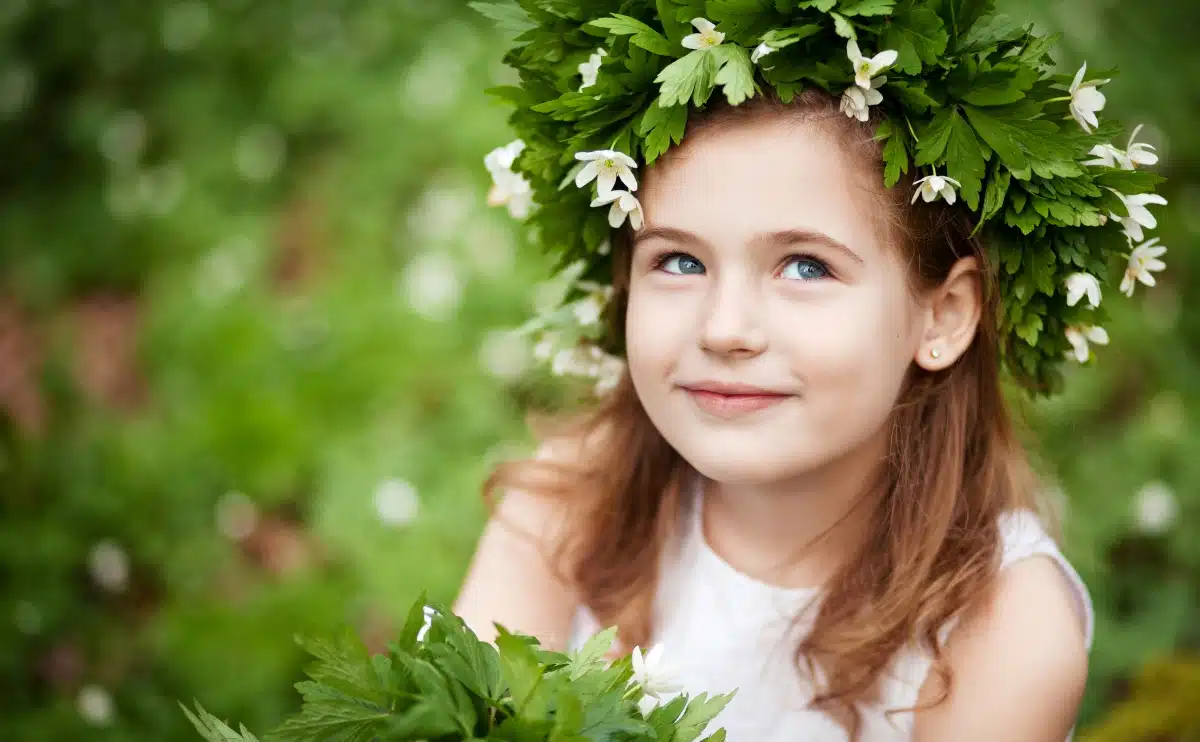
Wonder-Filled Famous Poems for Kids
Embark on a delightful adventure through a treasury of enchanting poems specially crafted for young minds. Immerse your child in a world of whimsy and wonder, thoughtfully categorized for their joyful exploration.
Whether you’re seeking playful rhymes that tickle the imagination or short, heartwarming poems that inspire, our collection offers a range of captivating examples to ignite their love for poetry.
With our carefully selected verses, you can discover the best poems for kids all in one delightful destination, where imagination knows no bounds.
So, let their imaginations soar as they journey through the pages, discovering the magic and joy that lies within the captivating world of children’s poetry.
Let’s jump right in!
My #1 Favorite Poem for Kids
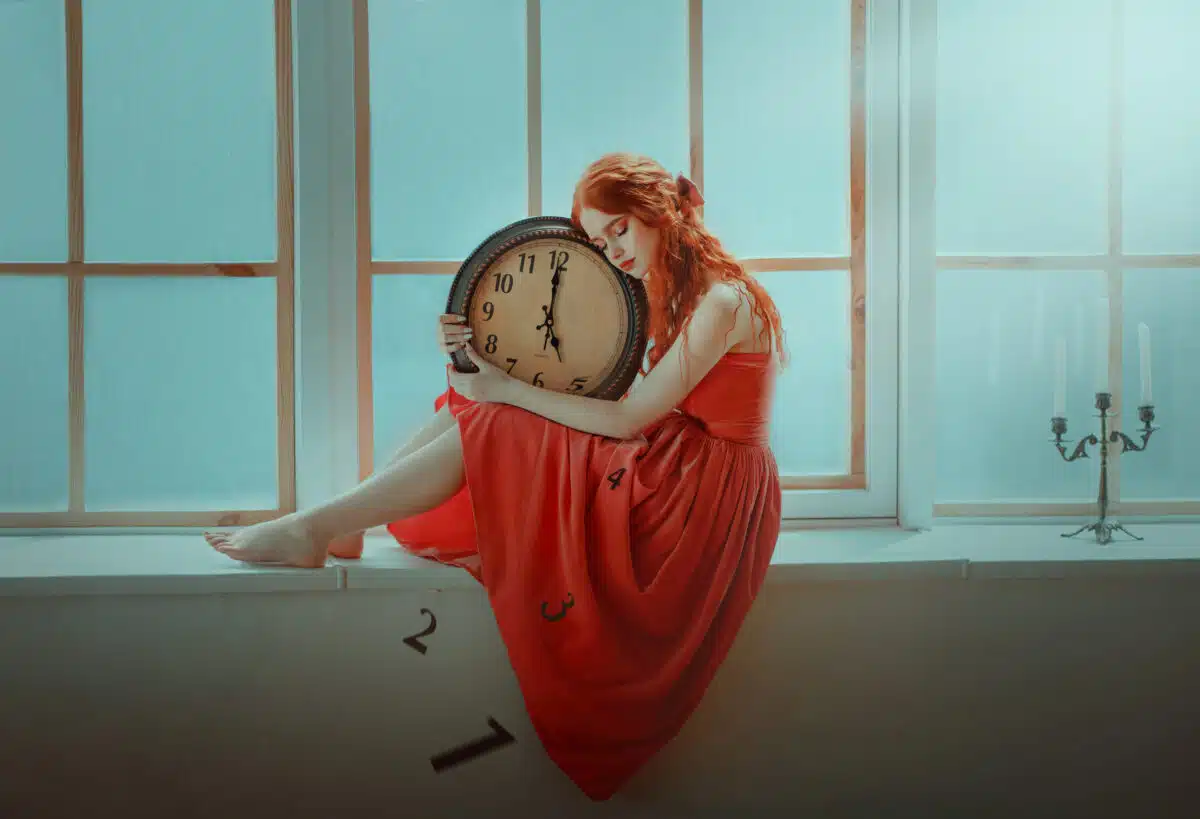
“The Children’s Hour” by Henry Wadsworth Longfellow
Between the dark and the daylight,
When the night is beginning to lower,
Comes a pause in the day’s occupations,
That is known as the Children’s Hour.
I hear in the chamber above me
The patter of little feet,
The sound of a door that is opened,
And voices soft and sweet.
From my study I see in the lamplight,
Descending the broad hall stair,
Grave Alice, and laughing Allegra,
And Edith with golden hair.
A whisper, and then a silence:
Yet I know by their merry eyes,
They are plotting andplanning together
To take me by surprise.
A sudden rush from the stairway,
A sudden raid from the hall!
By three doors left unguarded,
They enter my castle wall!
They climb up into my turret,
O’er the arms and back of my chair
If I try to escape, they surround me;
They seem to be everywhere.
They almost devour me with kisses,
Their arms about me entwine,
Till I think of the Bishop of Bingen
In his Mouse-Tower on the Rhine!
Do you think, O blue-eyed banditti,
Because you have scaled the wall,
Such an old moustache as I am
Is not a match for you all?
I have you fast in my fortress,
And will not let you depart,
But put you down into the dungeon
In the round-tower of my heart.
Famous Short Poems for Kids
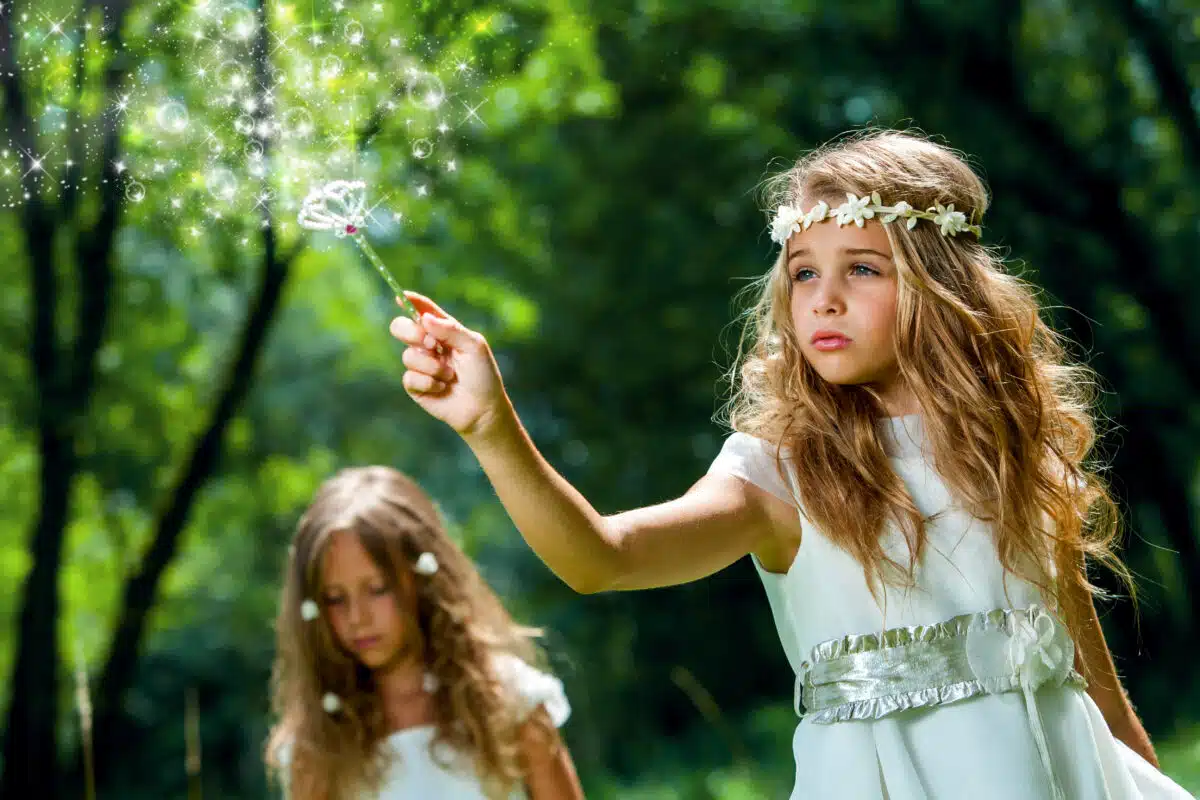
“If I Had but Two Little Wings” by Samuel T. Coleridge
If I had but two little wings
And were a little feathery bird,
To you I’d fly, my dear!
But thoughts like these are idle things
And I stay here.
But in my sleep to you I fly:
I’m always with you in my sleep!
The world is all one’s own.
And then one wakes, and where am I?
All, all alone.
“Little Things” by Ebenezer Cobham Brewer
Little drops of water,
Little grains of sand,
Make the mighty ocean
And the pleasant land.
Thus the little minutes,
Humble though they be,
Make the mighty ages
Of eternity.
“Leap Year Poem” by Mother Goose
Thirty days hath September,
April, June and November.
All the rest have thirty-one,
Excepting February alone,
And that has twenty-eight days clear
And twenty-nine in each leap year.
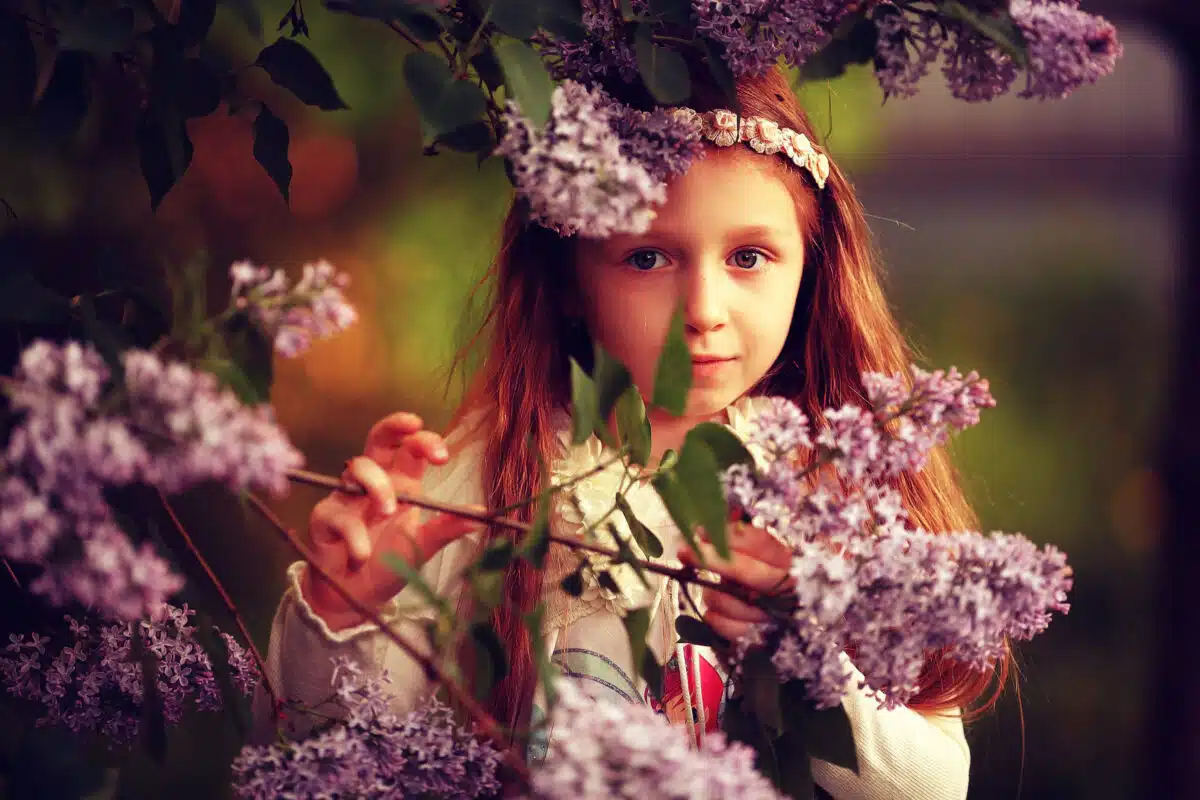
“Love Between Brothers and Sisters” by Isaac Watts
Whatever brawls disturb the street,
There should be peace at home;
Where sisters dwell and brothers meet,
Quarrels should never come.
Birds in their little nests agree;
And ’tis a shameful sight,
When children of one family
Fall out and chide and fight.
“The Noble Nature” by Ben Jonson
It is not growing like a tree
In bulk doth make man better be;
Or standing long an oak, three hundred year
To fall a log at last, dry, bald, and sear
A lily of a day
Is fairer far in May,
Although it fall and die that night,—
It was the plant and flower of light.
In small proportions we just beauties see;
And in short measures life may perfect be.
“The Rainbow” by Thomas Campbell
Triumphal arch, that fills the sky
When storms prepare to part,
I ask not proud Philosophy
To teach me what thou art.
Still seem, as to my childhood’s sight,
A midway station given,
For happy spirits to alight,
Betwixt the earth and heaven.

“A Happy Life” by Sir Henry Wotton
How happy is he born and taught
That serveth not another’s will;
Whose armour is his honest thought,
And simple truth his utmost skill!
Whose passions not his master’s are,
Whose soul is still prepared for death,
Not tied unto the world with care
Of public fame, or private breath.
“Star Light, Star Bright” by Anonymous
Star light, star bright,
The first star I see tonight;
I wish I may, I wish I might,
Have the wish I wish tonight.
“A Farewell” by Charles Kingsley
MY fairest child, I have no song to give you;
M’ No lark could pipe to skies so dull and gray:
Yet, ere we part, one lesson I can leave you For every day.
Be good, sweet maid, and let who will be clever;
Do noble things, not dream them, all day long:
And so make life, death, and that vast forever
One grand, sweet song.
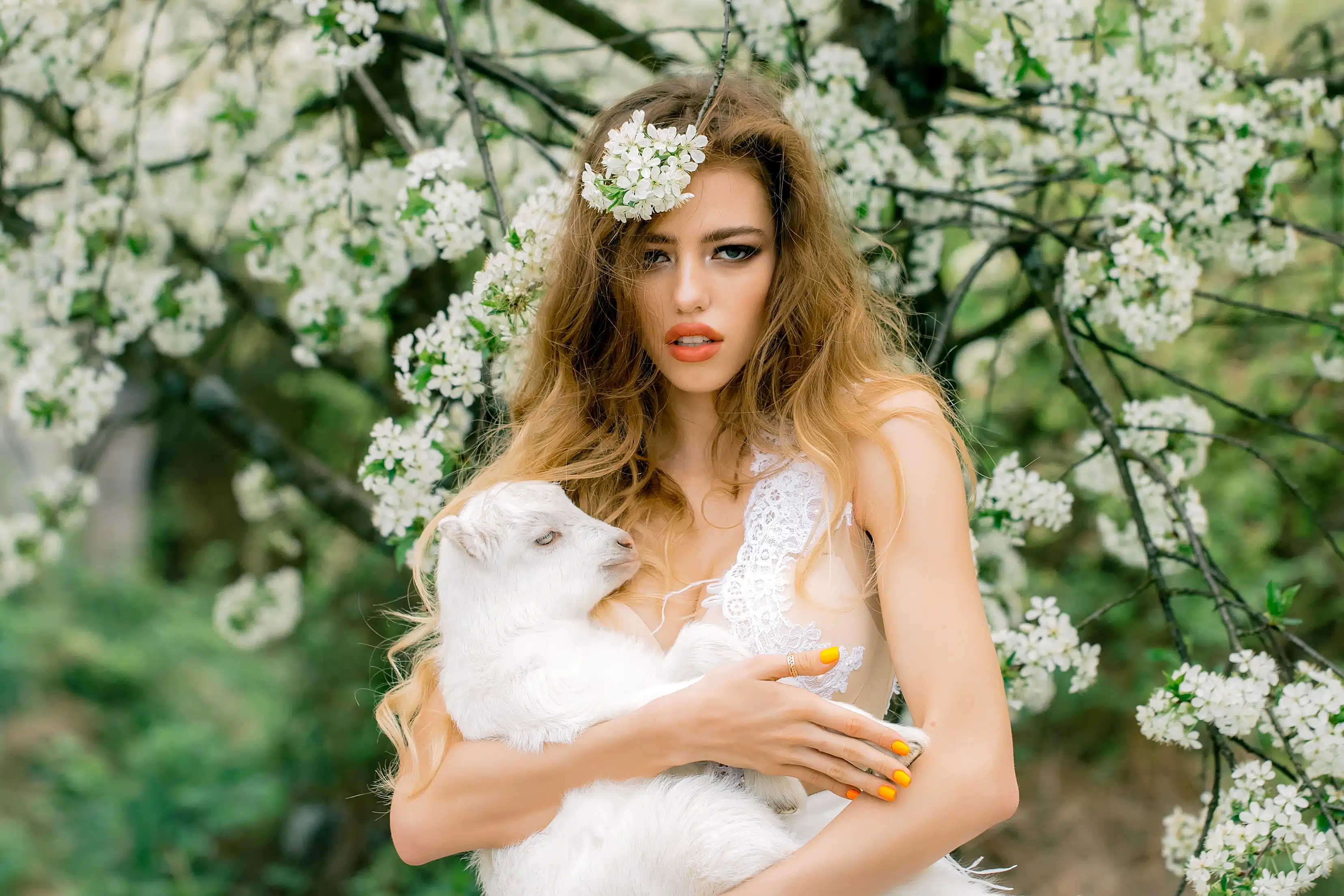
“Mary Had a Little Lamb” by Mother Goose
Mary had a little lamb,
Its fleece was white as snow;
And everywhere that Mary went,
The lamb was sure to go.
He followed, her to school one day;
That was against the rule;
It made the children laugh and play
To see a lamb at school.
“The Cat and the Fiddle” by L. Frank Baum
Hey, diddle, diddle,
The cat and the fiddle,
The cow jumped over the moon!
The little dog laughed
To see such sport,
And the dish ran off with the spoon!
“Gentle Jesus, Meek, and Mild” by Charles Wesley
Gentle Jesus, meek and mild,
Look upon alittle child,
Pity my simplicity,
Teach me, Lord, to come to Thee.
Fain would I to Thee be brought,
Lamb of God, forbid it not ;
In the Kingdom of Thy grace
Give a little child a place.
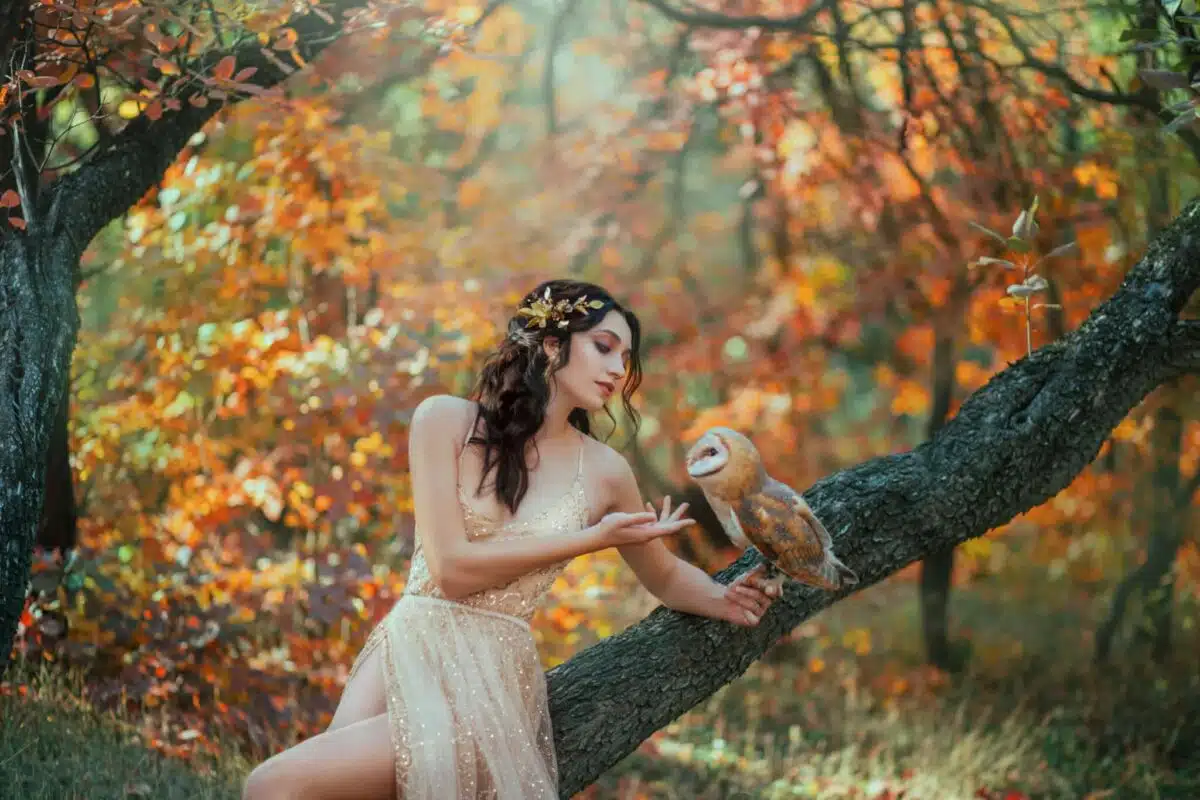
“Birds” by Richard H. Stoddard
Birds are singing round my window,
Tunes the sweetest ever heard,
And I hang my cage there daily,
But I never catch a bird.
So with thoughts my brain is peopled,
And they sing there all day long:
But they will not fold their pinions
In the little cage of Song!
“Autumn” by Emily Dickinson
The morns are meeker than they were,
The nuts are getting brown;
The berry’s cheek is plumper,
The rose is out of town.
The maple wears a gayer scarf,
The field a scarlet gown.
Lest I should be old-fashioned,
I’ll put a trinket on.
“I’d Love to Be a Fairy’s Child” by Robert Graves
Children born of fairy stock
Never need for shirt or frock,
Never want for food or fire,
Always get their heart’s desire:
Jingle pockets full of gold,
Marry when they’re seven years old.
Every fairy child may keep
Two strong ponies and ten sheep;
All have houses, each his own,
Built of brick or granite stone;
They live on cherries, they run wild—
I’d love to be a Fairy’s child.
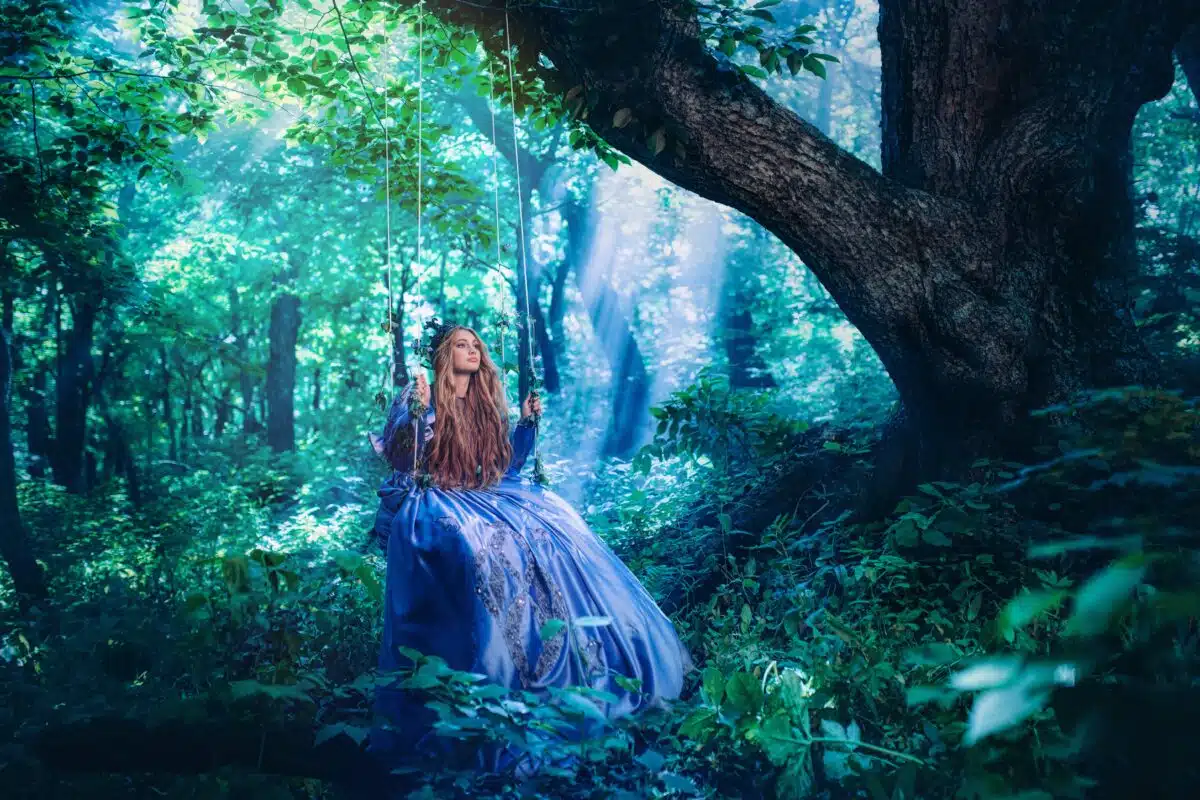
“Pippa’s Song” by Robert Browning
The year’s at the spring,
And day’s at the morn;
Morning’s at seven;
The hill-side’s dew-pearl’d;
The lark’s on the wing;
The snail’s on the thorn;
God’s in His heaven—
All’s right with the world!
“A Child’s Evening Prayer” by May Lundie Duncan
JESUS, tender Shepherd, hear me ;
Bless Thy little lamb to -night;
Through the darkness be Thou near me,
Watch my sleep till morning light.
All this day Thy hand has led me,
And I thank Thee for Thy care ;
Thou hast clothed and warmed and fed me;
Listen to my evening prayer.
Let my sins be all forgiven!
Bless the friends I love so well!
Take me, when I die, to Heaven;
Happy, there with Thee to dwell.
“I Love Little Pussy” by Anonymous
I love little pussy.
Her coat is so warm,
And if I don’t hurt her,
She’ll do me no harm.
So I’ll not pull her tail,
Or drive her away,
But pussy and I
Very gently will play.
She will sit by my side,
And I’ll give her her food,
And she’ll like me because
I am gentle and good.
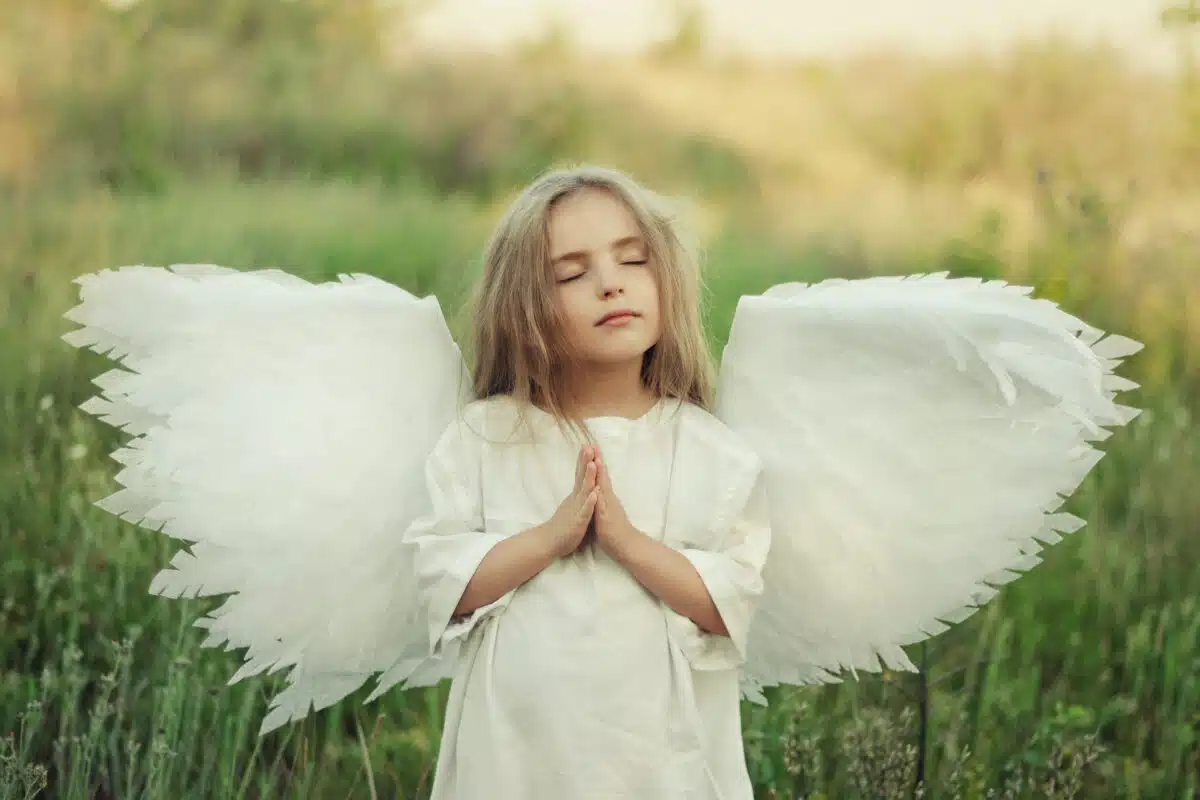
“Holy Innocents” by Christina G. Rossetti
Sleep, little Baby, sleep;
The holy angels love thee,
And guard thy bed, and keep
A blessed watch above thee.
No spirit can come near
Nor evil beast to harm thee:
Sleep, Sweet, devoid of fear
Where nothing need alarm thee.
“A Good Boy” by Robert Louis Stevenson
I woke before the morning, I was happy all the day,
I never said an ugly word, but smiled and stuck to
play.
And now at last the sun is going down behind the wood,
And I am very happy, for I know that I’ve been good.
My bed is waiting cool and fresh, with linen smooth and
fair,
And I must off to sleepsin-by, and not forget my prayer.
I know that, till to -morrow I shall see the sun arise,
No ugly dream shall fright my mind, no ugly sight my
eyes.
But slumber hold me tightly till I waken in the dawn,
And hear the thrushes singing in the lilacs round the
lawn.
“Love Me—I Love You” by Christina G. Rossetti
Love me — I love you,
Love me, my baby;
Sing it high, sing it low,
Sing it as it may be.
Mother’s arms under you,
Her eyes above you;
Sing it high, sing it low,
Love me — I love you.
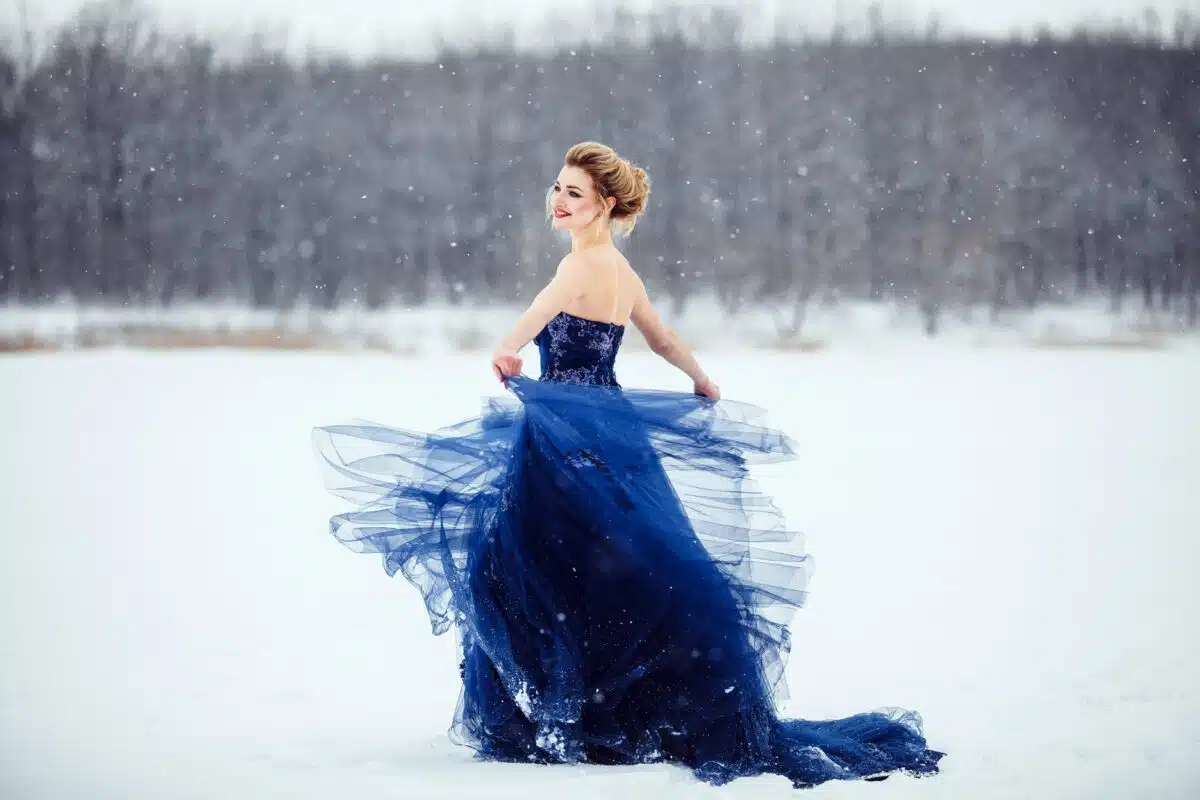
“Winter Jewels” by Mrs. Mary F. Butts
A million little diamonds
Twinkled on the trees;
And all the little children cried,
“A jewel, if you please!”
But while they held their hands outstretched
To catch the diamonds gay,
A million little sunbeams came
And stole them all away.
“Bees” by Frank Dempster Sherman
Bees don’t care about the snow;
I can tell you why that’s so:
Once I caught a little bee
Who was much too warm for me!
“Angels” by Christina G. Rossetti
Angels at the foot,
And angels at the head,
And like a curly little lamb,
My pretty babe in bed.
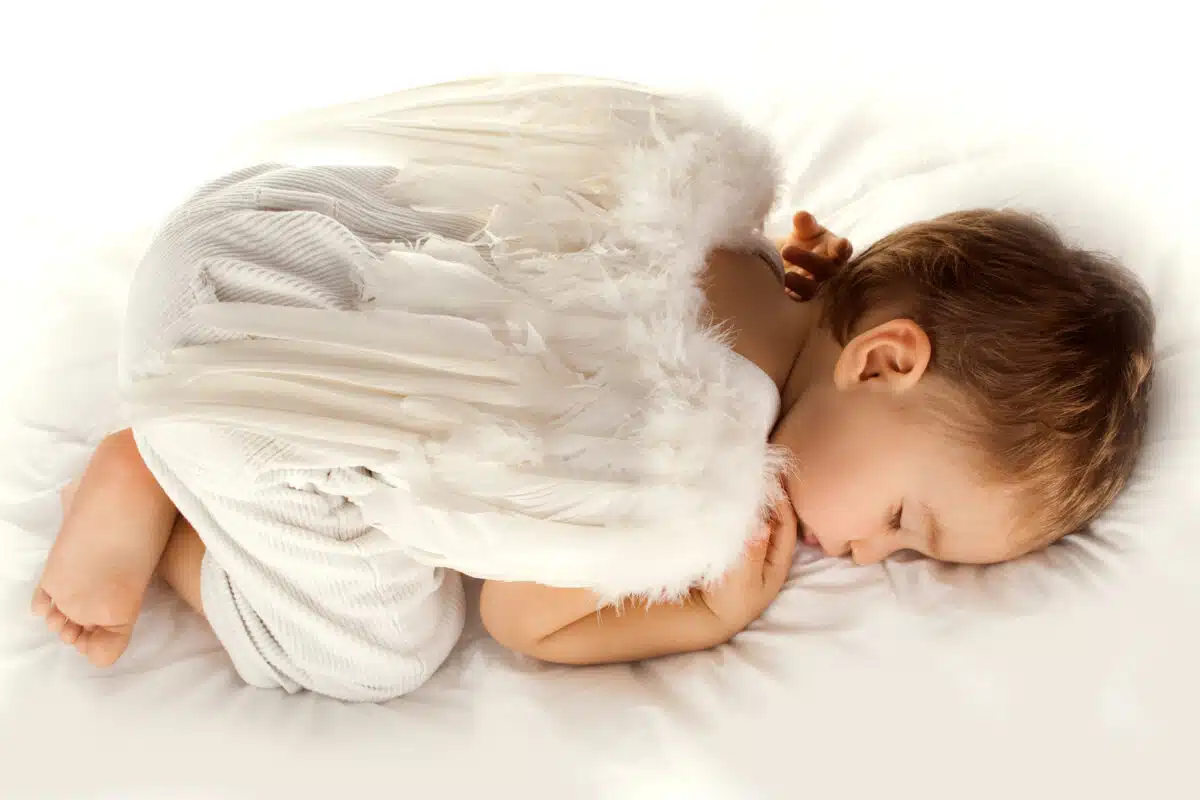
“Baby, Sleep” by Christina G. Rossetti
Lie a-bed,
Sleepy head,
Shut up eyes, bo-peep;
Till day-break
Never wake: —
Baby, sleep.
“Mix a Pancake” by Christina G. Rossetti
Mix a pancake,
Stir a pancake,
Pop it in the pan;
Fry the pancake,
Toss the pancake,
Catch it if you can.
“The Cold Days of the Year” by Christina G. Rossetti
Bread and milk for breakfast,
And woolen frocks to wear,
And a crumb for robin redbreast,
On the cold days of the year.
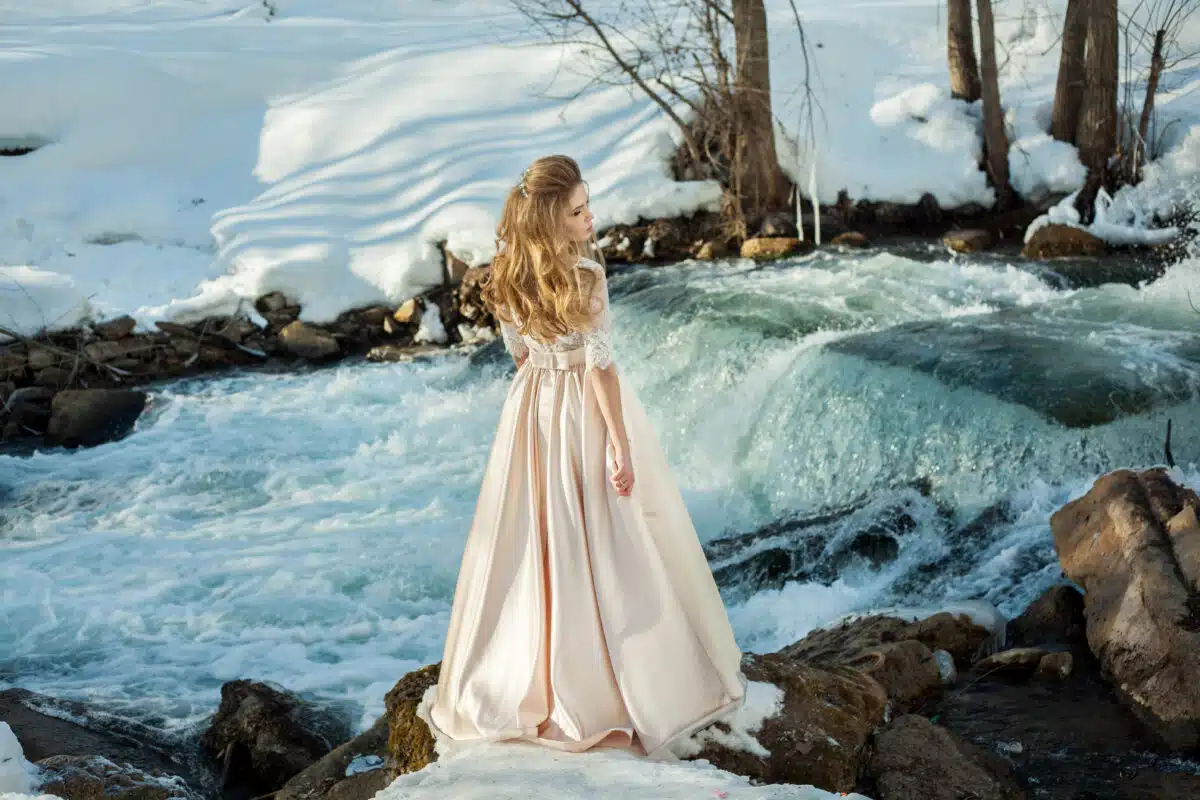
“Sea-Sand and Sorrow” by Christina G. Rossetti
What are heavy? Sea-sand and sorrow:
What are brief? To-day and to-morrow:
What are frail? Spring blossoms and youth:
What are deep? The ocean and truth.
“At the Zoo” by William Makepeace Thackeray
First I saw the white bear, then I saw the black;
Then I saw the camel with a hump upon his back;
Then I saw the grey wolf, with mutton in his maw;
Then I saw the wombat waddle in the straw;
Then I saw the elephant a-waving of his trunk;
Then I saw the monkeys—mercy, how unpleasantly they smelt!
“The Crocodile” by Lewis Carroll
How doth the little crocodile
Improve his shining tail,
And pour the waters of the Nile
On every golden scale!
How cheerfully he seems to grin,
How neatly spreads his claws,
And welcomes little fishes in,
With gently smiling jaws!
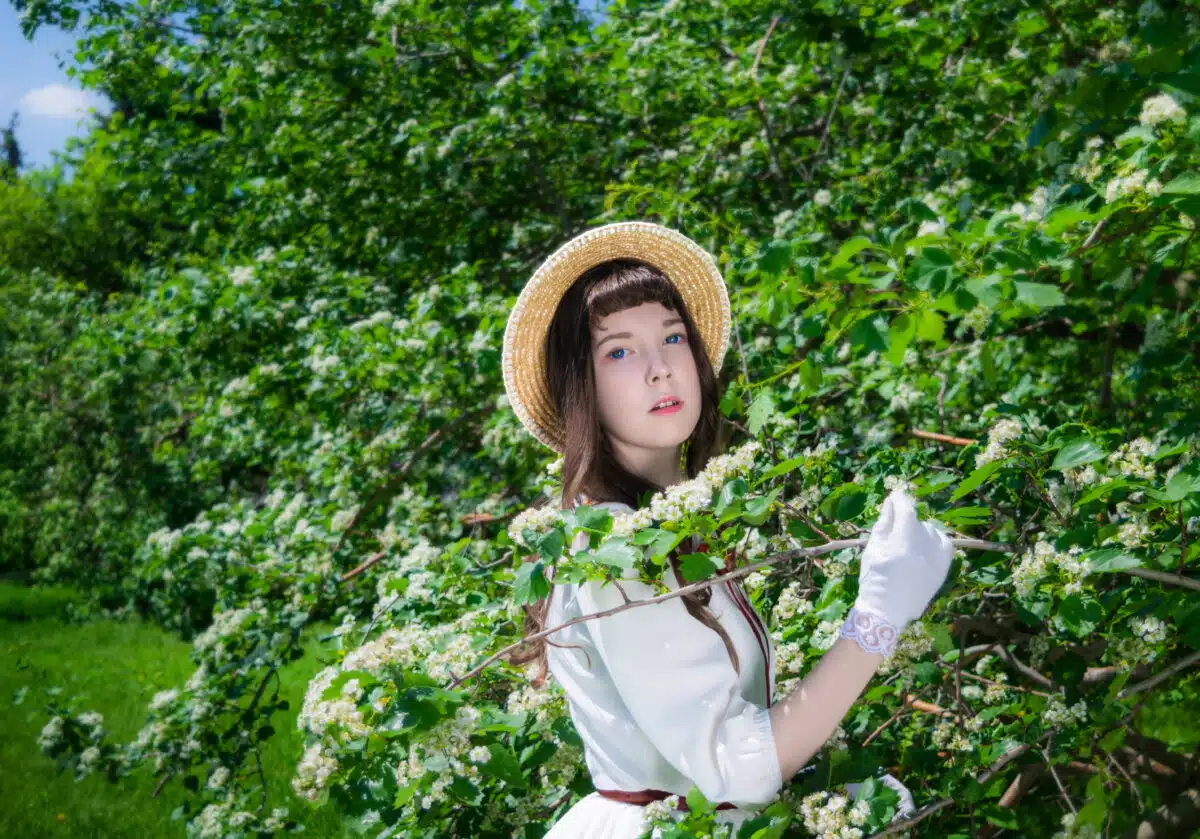
“Mistress Mary Quite Contrary” by Mother Goose
Mistress Mary, quite contrary
How does your garden grow?
With cockle-shells and silver bells,
And pretty maids all in a row.
Poems for Children’s Recitation
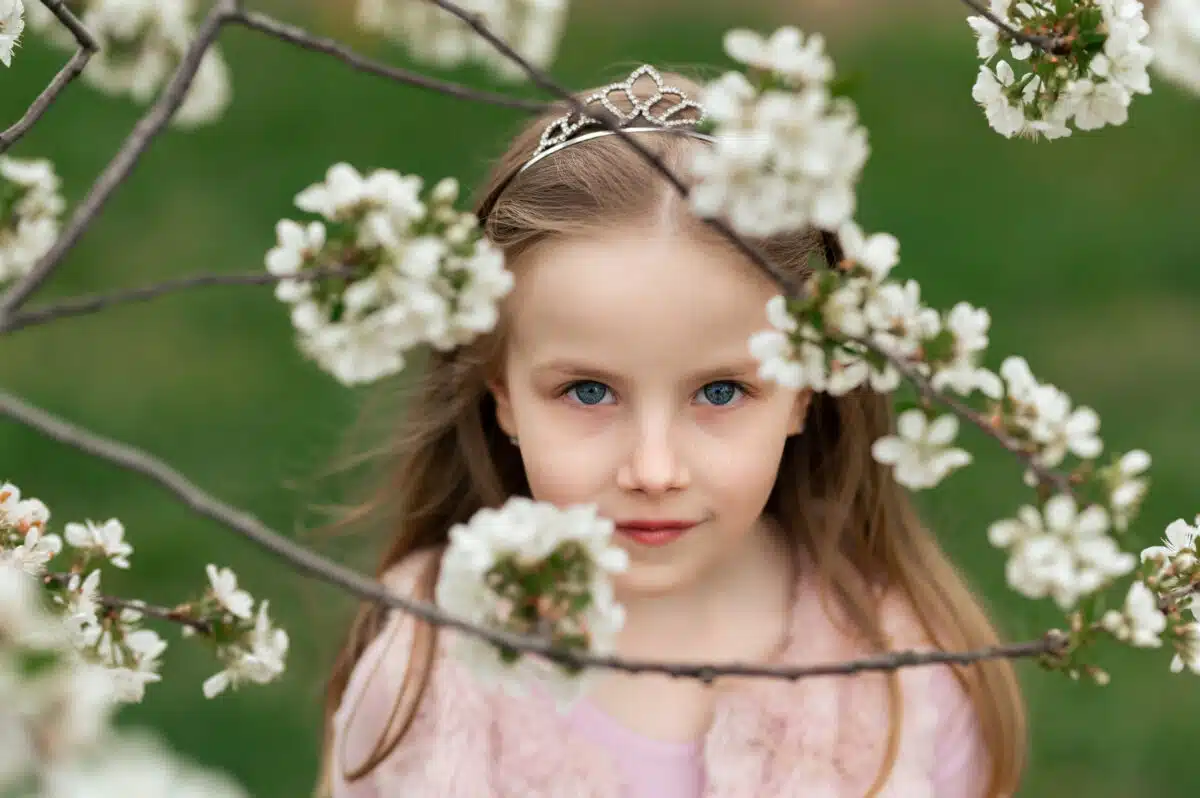
“O Captain! My Captain!” by Walt Whitman
O Captain! My Captain! our fearful trip is done,
The ship has weathered every rack, the prize we sought is won;
The port is near, the bells I hear, the people all exulting,
While follow eyes the steady keel, the vessel grim and daring;
But, O heart! heart! heart!
O the bleeding drops of red,
Where on the deck my Captain lies,
Fallen, cold and dead.
O Captain! My Captain! rise up and hear the bells;
Rise up—for you the flag is flung—for you the bugle trills,
For you bouquets and ribboned wreaths—for you the shores a-crowding,
For you they call, the swaying mass, their eager faces turning;
Here Captain! dear father!
This arm beneath your head!
It is some dream that on the deck
You’ve fallen cold and dead.
My Captain does not answer, his lips are pale and still;
My father does not feel my arm, he has no pulse or will;
The ship is anchored safe and sound, its voyage closed and done;
From fearful trip the victor ship comes in with object won;
Exult, O shores! and ring, O bells!
But I, with mournful tread,
Walk the deck my Captain lies,
Fallen, cold and dead.
“The Three Little Kittens” by Eliza Lee Cabot Follen
Three little kittens lost their mittens;
And they began to cry,
O mother dear,
We very much fear
That we have lost our mittens.
Lost your mittens!
You naughty kittens!
Then you shall have no pie.
Mee-ow, mee-ow, mee-ow.
No, you shall have no pie.
Mee-ow, mee-ow, mee-ow.
The three little kittens found their mittens,
And they began to cry,
O mother dear,
See here, see here;
See, we have found our mittens.
Put on your mittens,
You silly kittens,
And you may have some pie.
Purr-r, purr-r, purr-r,
O let us have the pie.
Purr-r, purr-r, purr-r.
The three little kittens put on their mittens,
And soon ate up the pie;
O mother dear,
We greatly fear
That we have soiled our mittens.
Soiled your mittens!
You naughty kittens!
Then they began to sigh,
Mee-ow, mee-ow, mee-ow,
Then they began to sigh,
Mee-ow, mee-ow, mee-ow.
The three little kittens washed their mittens,
And hung them out to dry;
O mother dear,
Do not you hear,
That we have washed our mittens?
Washed your mittens!
O, you ’re good kittens.
But I smell a rat close by;
Hush! hush! mee-ow, mee-ow.
We smell a rat close by,
Mee-ow-mee-ow, mee-ow.
“Twinkle, Twinkle, Little Star” by Jane Taylor
Twinkle, twinkle, little star!
How I wonder what you are,
Up above the world so high,
Like a diamond in the sky.
When the glorious sun is set,
When the grass with dew is wet,
Then you show your little light,
Twinkle, twinkle all the night.
In the dark-blue sky you keep,
And often through my curtains peep,
For you never shut your eye,
Till the sun is in the sky.
As your bright and tiny spark
Guides the traveller in the dark,
Though I know not what you are,
Twinkle, twinkle, little star!
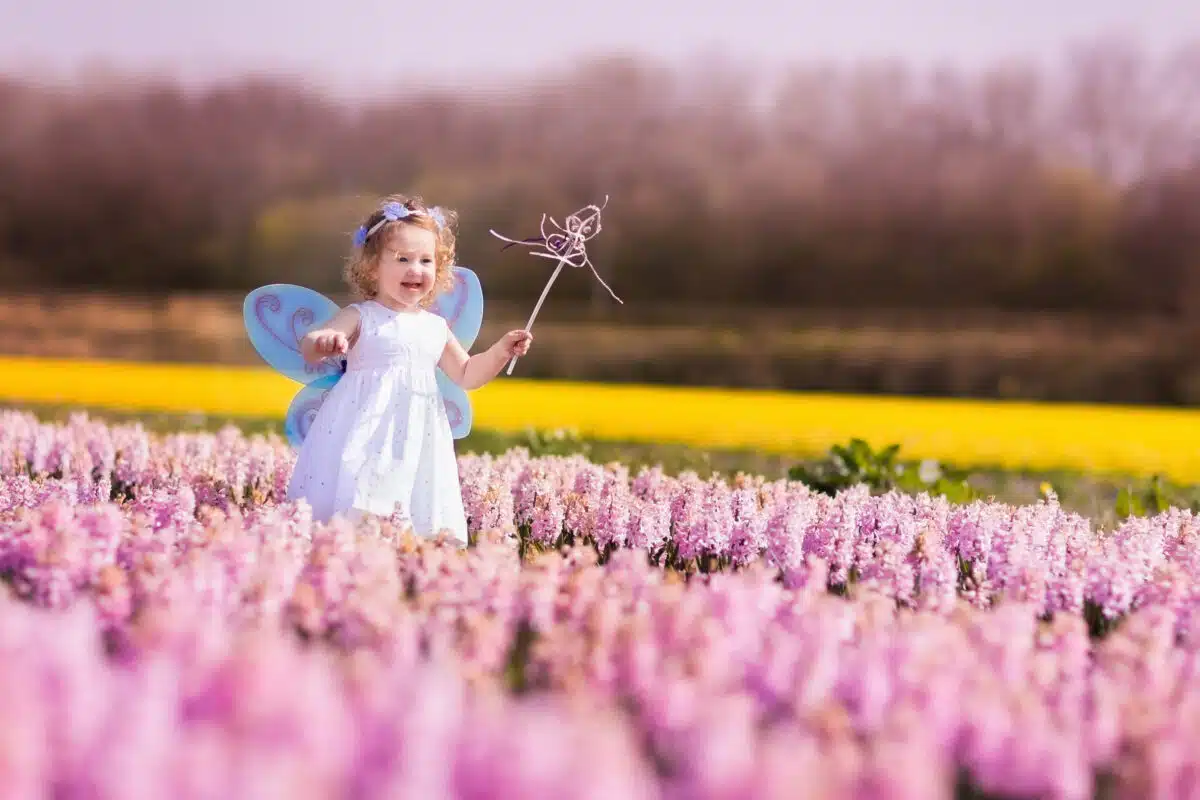
“The Butterfly and the Bee” by William Lisle Bowles
Methought I heard a butterfly
Say to a labouring bee:
“Thou hast no colours of the sky
On painted wings like me.”
“Poor child of vanity! those dyes,
And colours bright and rare,”
With mild reproof, the bee replies,
“Are all beneath my care.
“Content I toil from morn to eve,
And scorning idleness,
To tribes of gaudy sloth I leave
The vanity of dress.”
“I Like Little Pussy” by Jane Taylor
I like little Pussy,
Her coat is so warm;
And if I don’t hurt her
She’ll do me no harm.
So I’ll not pull her tail,
Nor drive her away,
But Pussy and I
Very gently will play;
She shall sit by my side,
And I’ll give her some food;
And she’ll love me because
I am gentle and good.
I’ll pat little Pussy,
And then she will purr,
And thus show her thanks
For my kindness to her;
I’ll not pinch her ears,
Nor tread on her paw,
Lest I should provoke her
To use her sharp claw;
I never will vex her,
Nor make her displeased,
For Pussy can’t bear
To be worried or teased.
“Little Robin Redbreast” by Anonymous
Little Robin Redbreast sat upon a tree,
Up went pussy-cat, and down went he;
Down came pussy-cat, and away Robin ran;
Said little Robin Redbreast, “Catch me if you can.”
Little Robin Redbreast jumped upon a wall,
Pussy-cat jumped after him, and almost got a fall;
Little Robin chirped and sang, and what did pussy say?
Pussy-cat said naught but “Mew,” and Robin flew away.
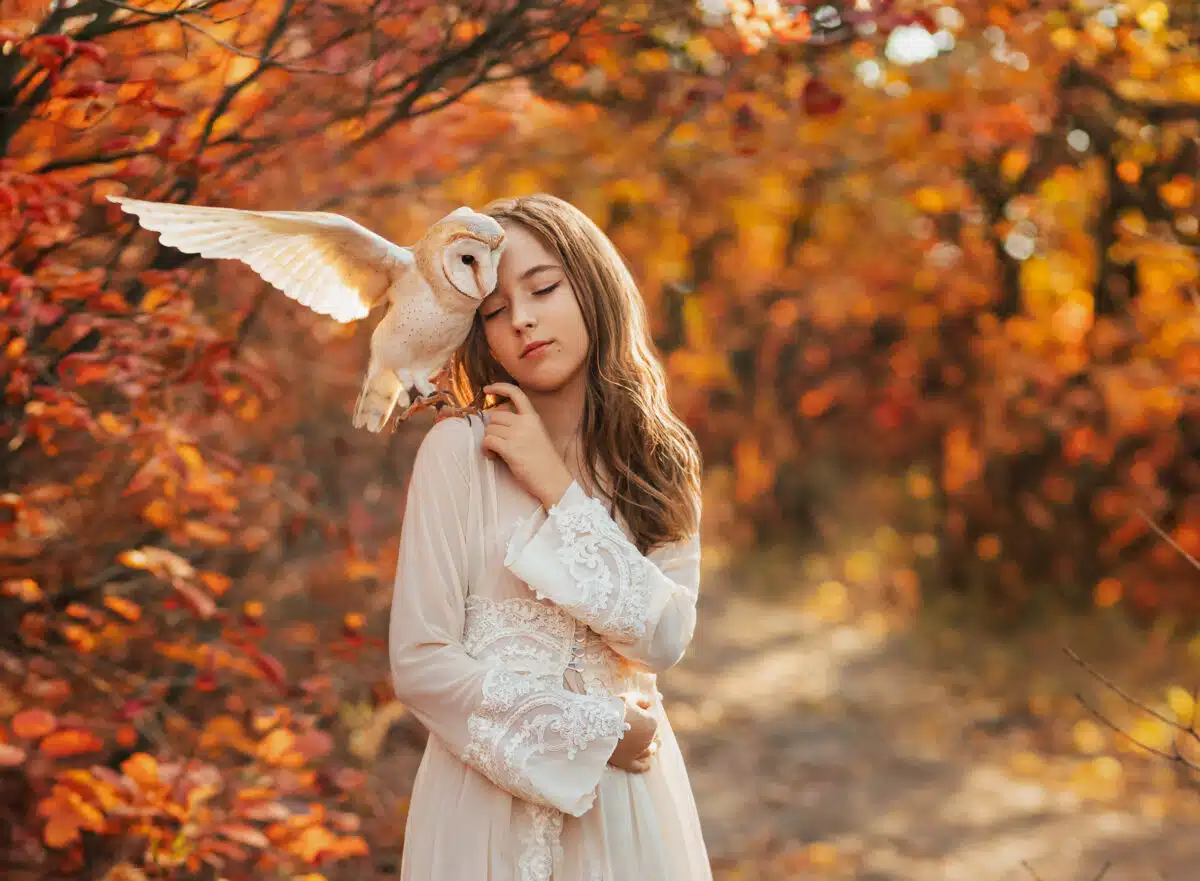
“The Orphan’s Song” by Sydney Dobell
I had a little bird,
I took it from the nest;
I prest it and blest it,
And nurst it in my breast.
I set it on the ground,
Danced round and round,
And sang about it so cheerly,
With “Hey, my little bird,
And ho! my little bird,
And oh! but I love thee dearly!”
I make a little feast
Of food soft and sweet,
I hold it in my breast,
And coax it to eat;
I pit, and I pat,
I call this and that,
And I sing about so cheerly,
With “Hey, my little bird,
And ho! my little bird,
And oh! but I love thee dearly!”
“The Piper” by William Blake
Piping down the valleys wild,
Piping songs of pleasant glee,
On a cloud I saw a child,
And he laughing said to me:—
“Pipe a song about a lamb:”
So I piped with merry cheer.
“Piper, pipe that song again:”
So I piped; he wept to hear.
“Drop thy pipe, thy happy pipe,
Sing thy songs of happy cheer:”
So I sung the same again,
While he wept with joy to hear.
“Piper, sit thee down and write
In a book that all may read—”
So he vanished from my sight;
And I plucked a hollow reed,
And I made a rural pen,
And I stained the water clear,
And I wrote my happy songs
Every child may joy to hear.
“Ingratitude” by William Shakespeare
Blow, blow, thou winter wind,
Thou art not so unkind
As man’s ingratitude;
Thy tooth is not so keen,
Because thou art not seen,
Although thy breath be rude.
Heigh-ho! sing, heigh-ho! unto the green holly:
Most friendship is feigning, most loving mere folly:
Then, heigh-ho, the holly!
This life is most jolly.
Freeze, freeze, thou bitter sky,
That does not bite so nigh
As benefits forgot:
Though thou the waters warp,
Thy sting is not so sharp
As friend remembered not.
Heigh-ho! sing . . .
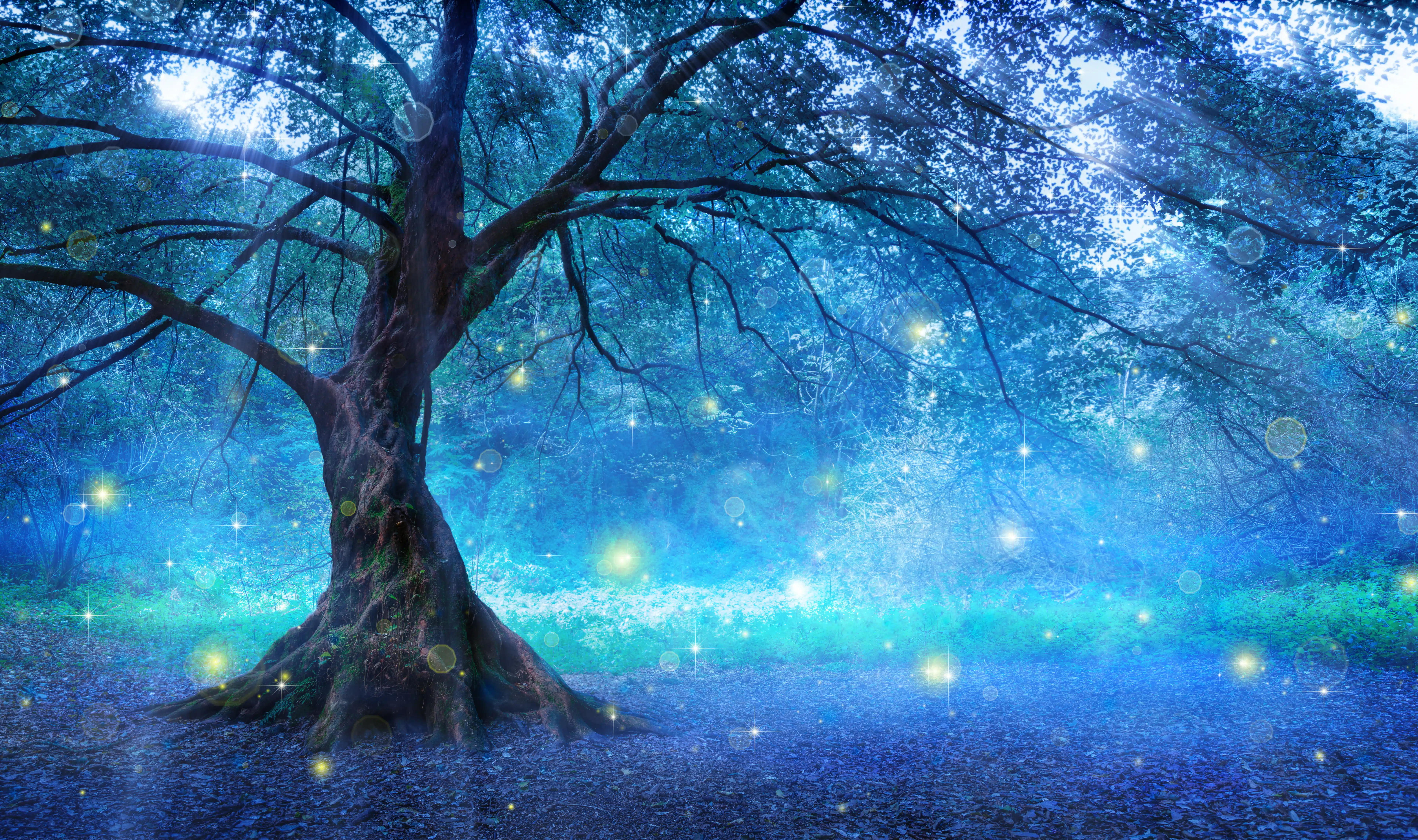
“Trees” by Joyce Kilmer
I think that I shall never see
A poem lovely as a tree.
A tree whose hungry mouth is prest
Against the earth’s sweet flowing breast;
A tree that looks at God all day,
And lifts her leafy arms to pray;
A tree that may in Summer wear
A nest of robins in her hair;
Upon whose bosom snow has lain;
Who intimately lives with rain.
Poems are made by fools like me,
But only God can make a tree.
“How Sleep The Brave” by William Collins
How sleep the brave, who sink to rest
By all their country’s wishes blest!
When Spring, with dewy fingers cold,
Returns to deck their hallow’d mould,
She there shall dress a sweeter sod
Than Fancy’s feet have ever trod.
By fairy hands their knell is rung;
By forms unseen their dirge is sung;
There Honour comes, a pilgrim grey,
To bless the turf that wraps their clay;
And Freedom shall awhile repair
To dwell, a weeping hermit, there!
“Sing a Song of Sixpence” by Mother Goose
Sing a song of sixpence,
A pocket full of rye,
Four and twenty blackbirds
Baked in a pie.
When the pie was opened
The birds began to sing—
Wasn’t that a dainty dish
To set before the king?
The king was in the counting-house
Counting out his money,
The queen was in the parlor
Eating bread and honey,
The maid was in the garden
Hanging out the clothes.
Along came a blackbird
And snipped off her nose.
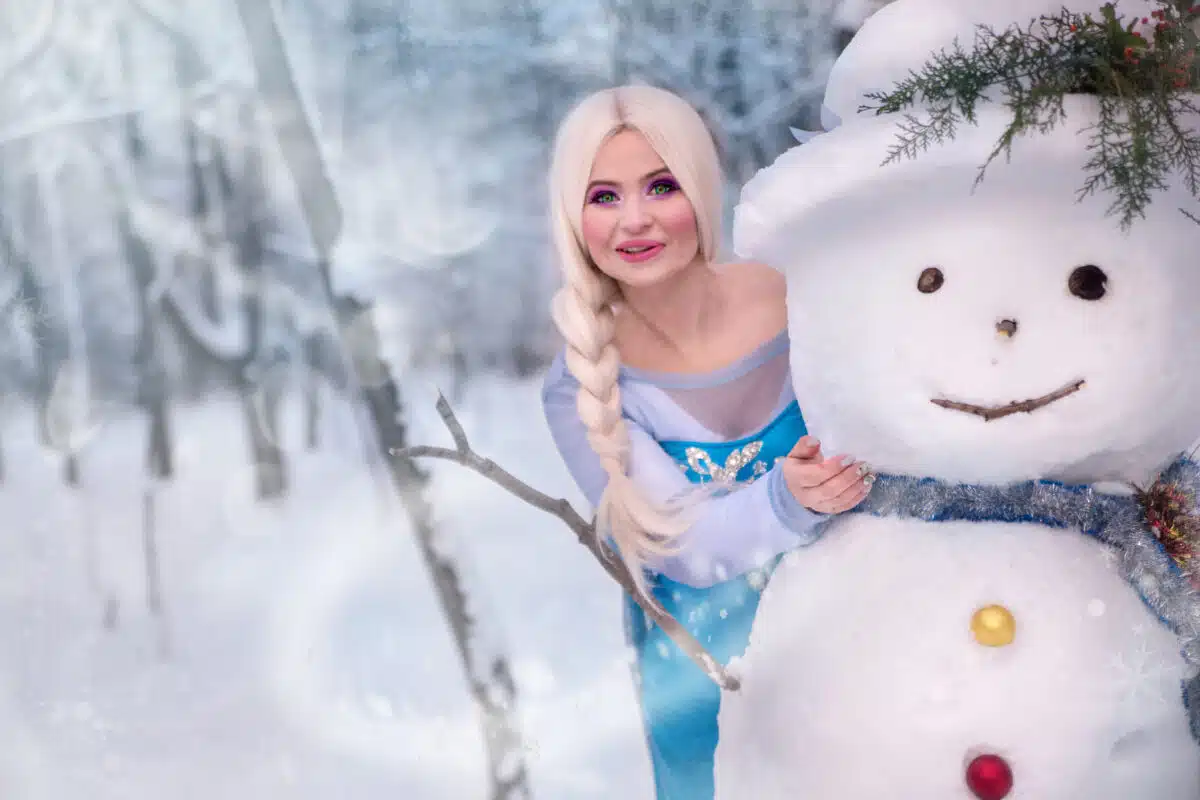
“A Snow Man” by Anonymous
Oh, the beautiful snow!
We’re all in a glow—
Nell, Dolly, and Willie, and Dan;
For the primest of fun,
When all’s said and done,
Is just making a big snow man.
Two stones for his eyes
Look quite owlishly wise,
A hard pinch of snow for his nose;
Then a mouth that’s as big
As the snout of a pig,
And he’ll want an old pipe, I suppose.
Then the snow man is done,
And to-morrow what fun
To make piles of snow cannon all day,
And to pelt him with balls
Till he totters and falls,
And a thaw comes and melts him away.
“America the Beautiful” by Katharine Lee Bates
O beautiful for spacious skies,
For amber waves of grain,
For purple mountain majesties
Above the fruited plain!
America! America!
God shed His grace on thee
And crown thy good with brotherhood
From sea to shining sea!
O beautiful for pilgrim feet,
Whose stern, impassioned stress
A thoroughfare for freedom beat
Across the wilderness!
America! America!
God mend thine every flaw,
Confirm thy soul in self-control,
Thy liberty in law!
O beautiful for heroes proved
In liberating strife,
Who more than self their country loved
And mercy more than life!
America! America!
May God thy gold refine,
Till all success be nobleness,
And every gain divine!
O beautiful for patriot dream
That sees beyond the years
Thine alabaster cities gleam
Undimmed by human tears!
America! America!
God shed His grace on thee
And crown thy good with brotherhood
From sea to shining sea!
“How Doth the Little Busy Bee” by Isaac Watts
How doth the little busy bee
Improve each shining hour,
And gather honey all the day
From every opening flower!
How skilfully she builds her cell!
How neat she spreads the wax!
And labours hard to store it well
With the sweet food she makes.
In works of labour or of skill,
I would be busy too;
For Satan finds some mischief still
For idle hands to do.
In books, or work, or healthful play,
Let my first years be past,
That I may give for every day
Some good account at last.
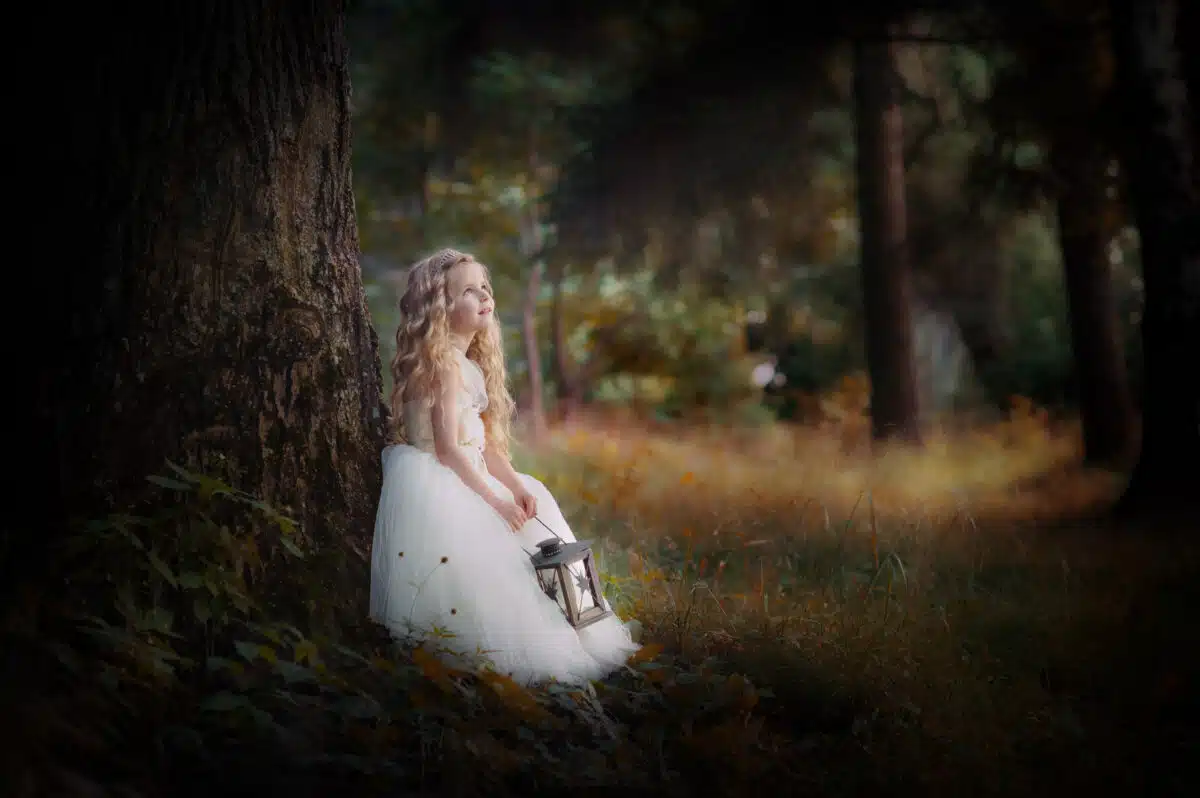
“Child’s Evening Prayer” by S.T. Coleridge
Ere on my bed my limbs I lay,
God grant me grace my prayers to say!
O God, preserve my mother dear
In health and strength for many a year.
And O preserve my father too,
And may I pay him reverence due;
And may I my best thoughts employ
To be my parents’ hope and joy!
And O preserve my brothers both
From evil doings and from sloth,
And may we always love each other,
Our friends, our father, and our mother!
And still , O Lord, to me impart
An innocent and grateful heart,
That after my last sleep I may
Awake to Thy eternal day. Amen.
“Let Dogs Delight to Bark and Bite” by Isaac Watts
Let dogs delight to bark and bite,
For God Hath made them so;
Let bears and lions growl and fight,
For ‘ tis their nature to.
But, children, you should never let
Such angry passions rise;
Your little hands were never made
To tear each other’s eyes.
Let love through all your actions run,
And all your words be mild;
Live like the Blessed Virgin’s Son,
That sweet and lovely child.
His soul was gentle as a lamb,
And, as His stature grew,
He grew in favour both with man,
And God His Father, too.
Now Lord of all , He reigns above,
And from His heavenly throne
He sees what children dwell in love,
And marks them for His own.
“The Sheep” by Ann Taylor
Lazy sheep, pray tell me why
In the grassy fields you lie,
Eating grass and daisies white,
From the morning till the night ?
Every thing can something do,
But what kind of use are you ?
Nay, my little master, nay,
Do not serve me so, I pray ;
Don’t you see the wool that grows
On my back to make you clothes ?
Cold, and very cold you’d get,
If I did not give you it.
Sure it seems a pleasant thing
To nip the daisies in the spring,
But many chilly nights I pass
On the cold and dewy grass,
Or pick a scanty dinner where
All the common’s brown and bare.
Then the farmer comes at last,
When the merry spring is past,
And cuts my woolly coat away
To warm you in the winter’s day ;
Little master, this is why
In the grassy fields I lie.
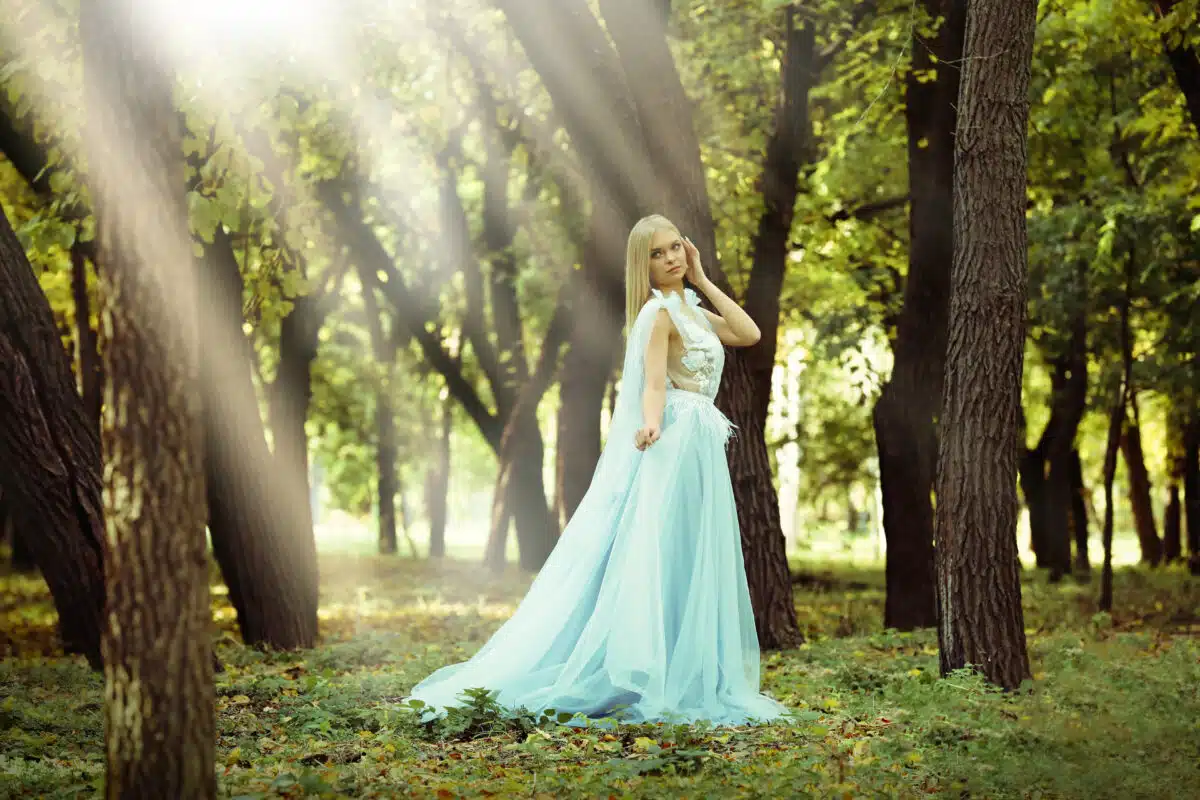
“Under the Greenwood Tree” by William Shakespeare
Under the greenwood tree
Who loves to lie with me,
And tune his merry note
Unto the sweet bird’s throat,
Come hither, come hither, come hither;
Here shall he see No enemy,
But winter and rough weather.
Who doth ambition shun,
And loves to lie i’ the sun,
Seeking the food he eats
And pleased with what he gets,
Come hither, come hither, come hither!
Here shall he see
No enemy,
But winter and rough weather.
“Do You Know How Many Stars?” by Unknown
Do you know how many stars
There are shining in the skies?
Do you know how many clouds
Ev’ry day go floating by?
God in heaven has counted all,
He would miss one should it fall.
Do you know how many children
Go to little beds at night,
And without a care or sorrow,
Wake up in the morning light?
God in heaven each name can tell,
Loves you, too, and loves you well.
“Where Do All the Daisies Go?” by Unknown
Where do all the daisies go?
I know, I know!
Underneath the snow they creep,
Nod their little heads and sleep,
In the springtime out they peep;
That is where they go!
Where do all the birdies go?
I know, I know!
Far away from winter snow
To the fair, warm South they go;
There they stay till daisies blow,
That is where they go!
Where do all the babies go?
I know, I know!
In the glancing firelight warm,
Safely sheltered from all harm,
Soft they lie on mother’s arm,
That is where they go!
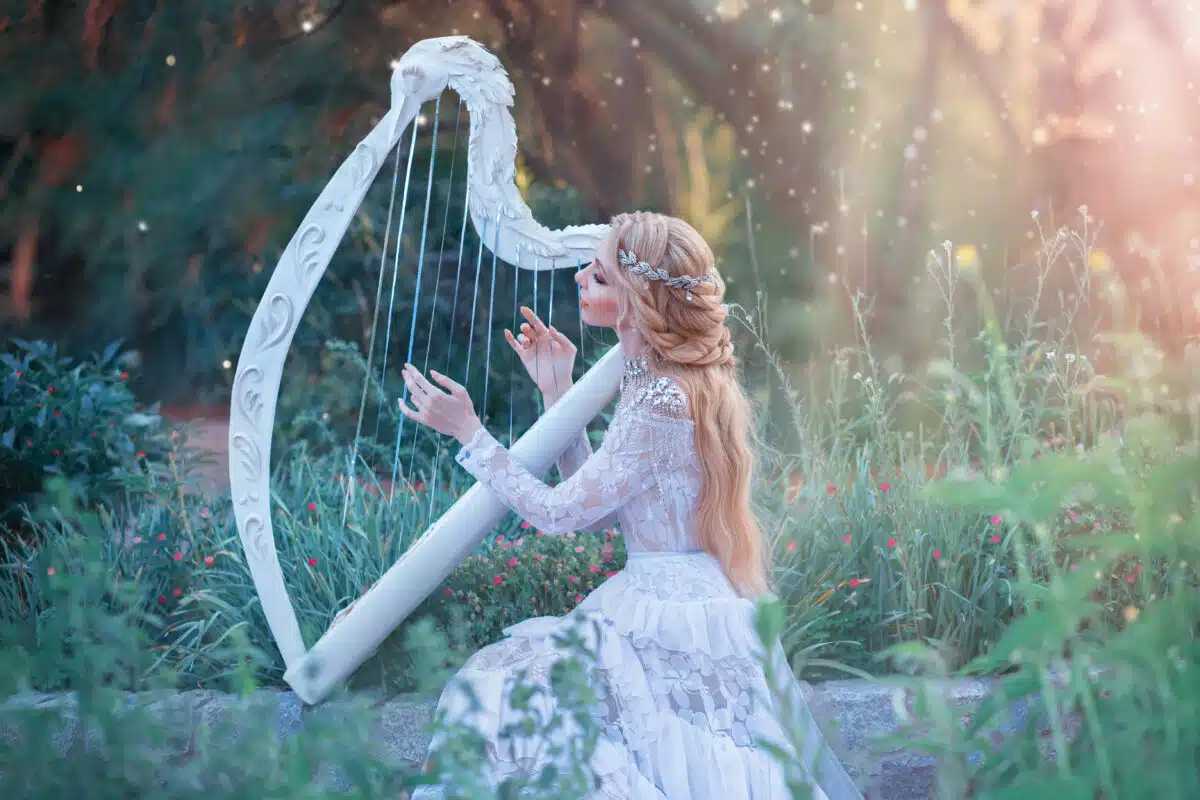
“Marching Song” by Robert Louis Stevenson
Bring the comb and play upon it!
Marching, here we come!
Willie cocks his highland bonnet,
Johnnie beats the drum.
Mary Jane commands the party,
Peter leads the rear;
Feet in time, alert and hearty,
Each a Grenadier!
All in the most martial manner
Marching double-quick;
While the napkin, like a banner,
Waves upon the stick!
Here’s enough of fame and pillage,
Great commander Jane!
Now that we’ve been round the village,
Let’s go home again.
“The Bee” by Christina G. Rossetti
What does the bee do?
Bring home honey.
And what does Father do?
Bring home money.
And what does Mother do?
Lay out the money.
And what does baby do?
Eat up the honey.
“Cock Crows in the Morn” by Unknown
Cock crows in the morn,
To tell us to rise,
And he who lies late
Will never be wise.
For early to bed,
And early to rise,
Is the way to be healthy
And wealthy and wise.
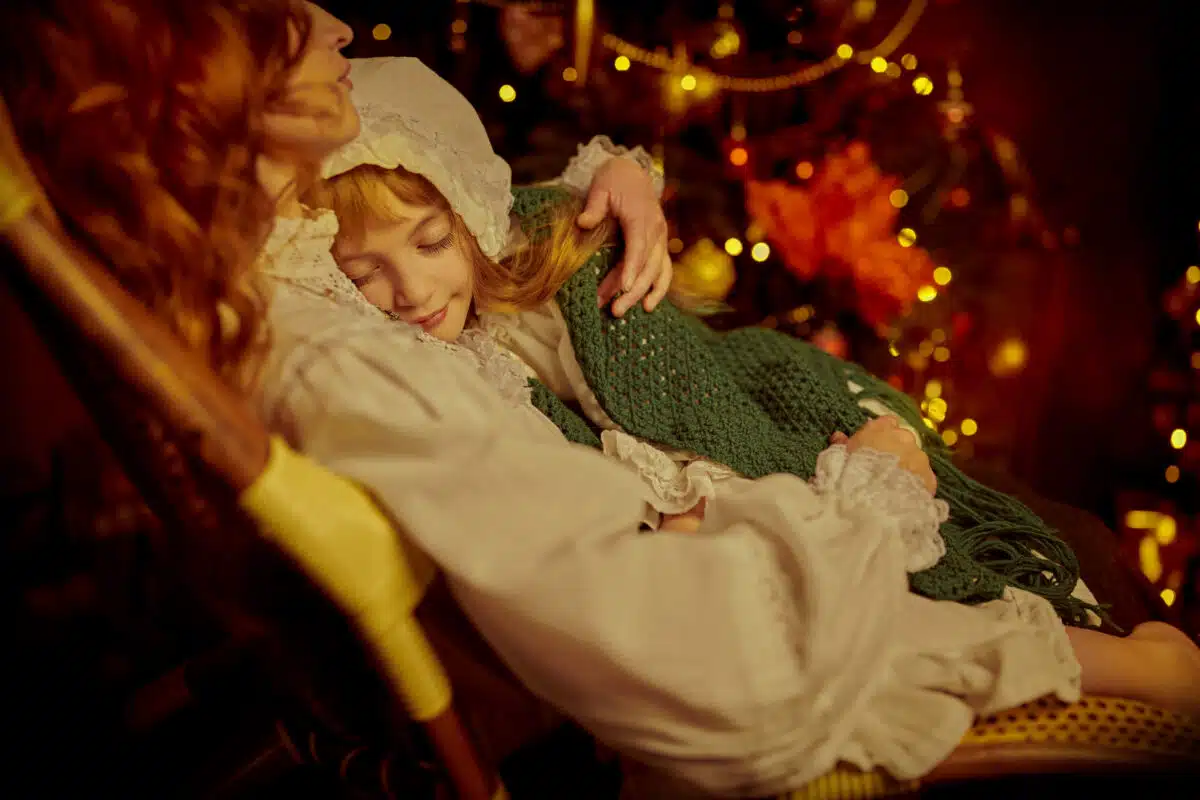
“Sleep, My Treasure” by E. Nesbit
Sleep, sleep, my treasure,
The long day’s pleasure
Has tired the birds, to their nests they creep;
The garden still is
Alight with lilies,
But all the daisies are fast asleep.
Sleep, sleep, my darling,
Dawn wakes the starling,
The sparrow stirs when he sees day break;
But all the meadow
Is wrapped in shadow,
And you must sleep till the daisies wake!
“Lullaby of an Infant Chief” by Sir Walter Scott
Oh, hush thee, my babie, thy sire was a knight,
Thy mother a lady, both lovely and bright;
The woods and the glens from the tower which we see,
They all are belonging, dear babie, to thee.
Oh, fear not the bugle, though loudly it blows,
It calls but the warders that guard thy repose;
Their bows would be bended, their blades would be red,
Ere the step of a foeman draws near to thy bed.
Oh, hush thee, my babie, the time will soon come,
When thy sleep shall be broken by trumpet and drum;
Then hush thee, my darling, take rest while you may,
For strife comes with manhood, and waking with day.
“Polly” by William Brighty Rands
Brown eyes, straight nose;
Dirt pies, rumpled clothes.
Torn books, spoilt toys:
Arch looks, unlike a boy’s;
Little rages, obvious arts;
(Three her age is), cakes, tarts;
Falling down off chairs;
Breaking crown down stairs;
Catching flies on the pane;
Deep sighs—cause not plain;
Bribing you with kisses
For a few farthing blisses.
Wide-a-wake; as you hear,
“Mercy’s sake, quiet, dear!”
New shoes, new frock;
Vague views of what’s o’clock
When it’s time to go to bed,
And scorn sublime for what is said
Folded hands, saying prayers,
Understands not nor cares—
Thinks it odd, smiles away;
Yet may God hear her pray!
Bed gown white, kiss Dolly;
Good night!—that’s Polly,
Fast asleep, as you see,
Heaven keep my girl for me!
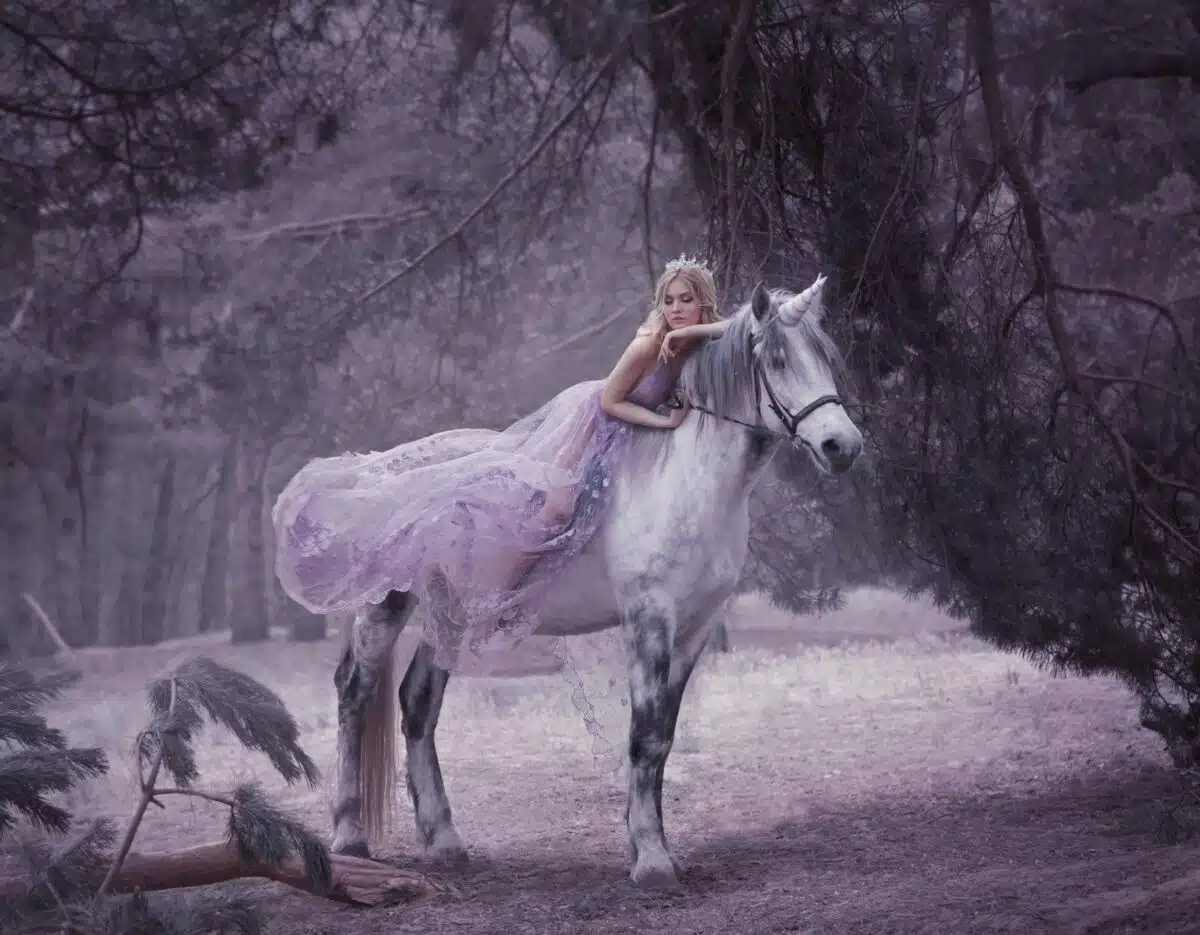
“If I Were A Queen” by Christina G. Rossetti
“If I were a queen,
What would I do ?
I’d make you a king,
And I ‘d wait on you.”
“If I were a king,
What would I do ?
I’d make you a queen,
For I’d marry you.”
“Cherries” by Christina G. Rossetti
Mother shake the cherry tree,
Susan catch a cherry;
Oh, how funny that will be,
Let’s be merry!
One for brother, one for sister,
Two for mother more,
Six for father, hot and tired,
Knocking at the door.
“Baby-Land” by George Cooper
Which is the way to Baby-Land?
Any one can tell;
Up one flight,
To your right;
Please to ring the bell.
What can you see in Baby-Land?
Little folks in white,
Downy heads,
Cradle-beds,
Faces pure and bright.
What do they do in Baby-Land?
Dream and wake and play,
Laugh and crow,
Shout and grow,
Jolly times have they.
What do they say in Baby-Land?
Why, the oddest things;
Might as well
Try to tell
What a birdie sings.
Who is the Queen of Baby-Land?
Mother kind and sweet;
And her love,
Born above,
Guides the little feet.
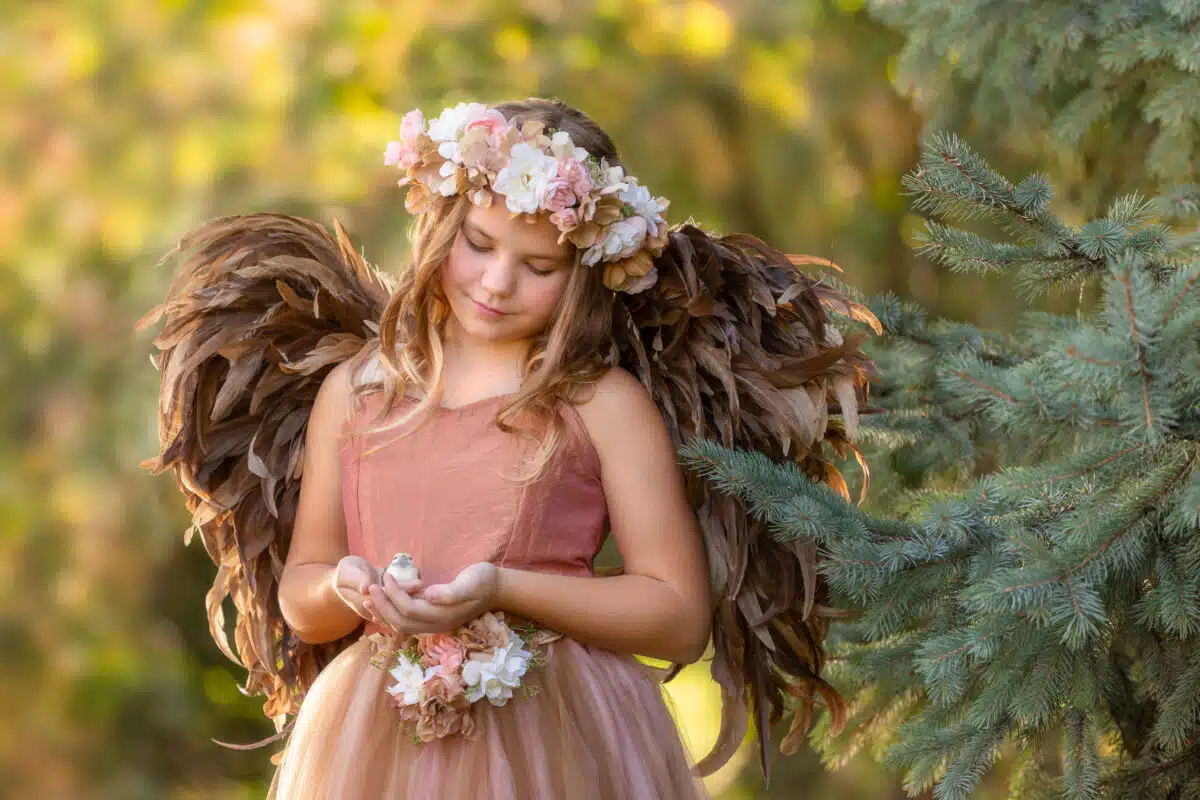
“A Wish” by Christina G. Rossetti
I wish I were a little bird,
That out of sight doth soar;
I wish I were a song once heard
But often pondered o’er,
Or shadow of a lily stirred
By wind upon the floor,
Or echo of a loving word,
Worth all that went before,
Or memory of a hope deferred
That springs again no more.
“What?” by Christina G. Rossetti
What is pink? a rose is pink
By the fountain’s brink.
What is red? a poppy’s red
In its barley bed.
What is blue? the sky is blue
Where the clouds float thro’.
What is white? a swan is white.
Sailing in the light.
What is yellow? pears are yellow,
Rich and ripe and mellow.
What is green? the grass is green,
With small flowers between.
What is violet? clouds are violet
In the summer twilight.
What is orange? why, an orange,
Just an orange!
“An Alphabet” by Christina G. Rossetti
A is the Alphabet, A at its head;
B is the Baker Boy bringing the bread.
C is for Cornflower come with the corn;
D is a Dinner which dahlias adorn.
E is an elegant eloquent Earl;
F is a Falcon with feathers to furl.
G is the Gander, the Gosling, the Goose;
H is for Heartsease, harmonious of hues.
I is an Idler who idles on ice;
J is a Jacinth, a jewel of price.
K is a King, or a Kaiser still higher:
L is a Lute or a lovely-toned Lyre.
M is a Meadow where Meadowsweet blows;
N is a Nut — in a nutshell it grows.
O is an Opal, with only one spark;
P is a Pony, a pet in a park.
Q is a Quail, quick-chirping at morn;
R is a Rose, rosy-red on a thorn.
S is a Snow-storm that sweeps o’er the sea;
T is the Tea-table set out for tea.
U, the Umbrella, went up in a shower;
V is a Violet veined in the flower.
W stands for the water-bred Whale —
X, or XX, or XXX, is ale.
Y is a yellow Yacht, yellow its boat,
Z is a Zebra, zigzagged his coat.
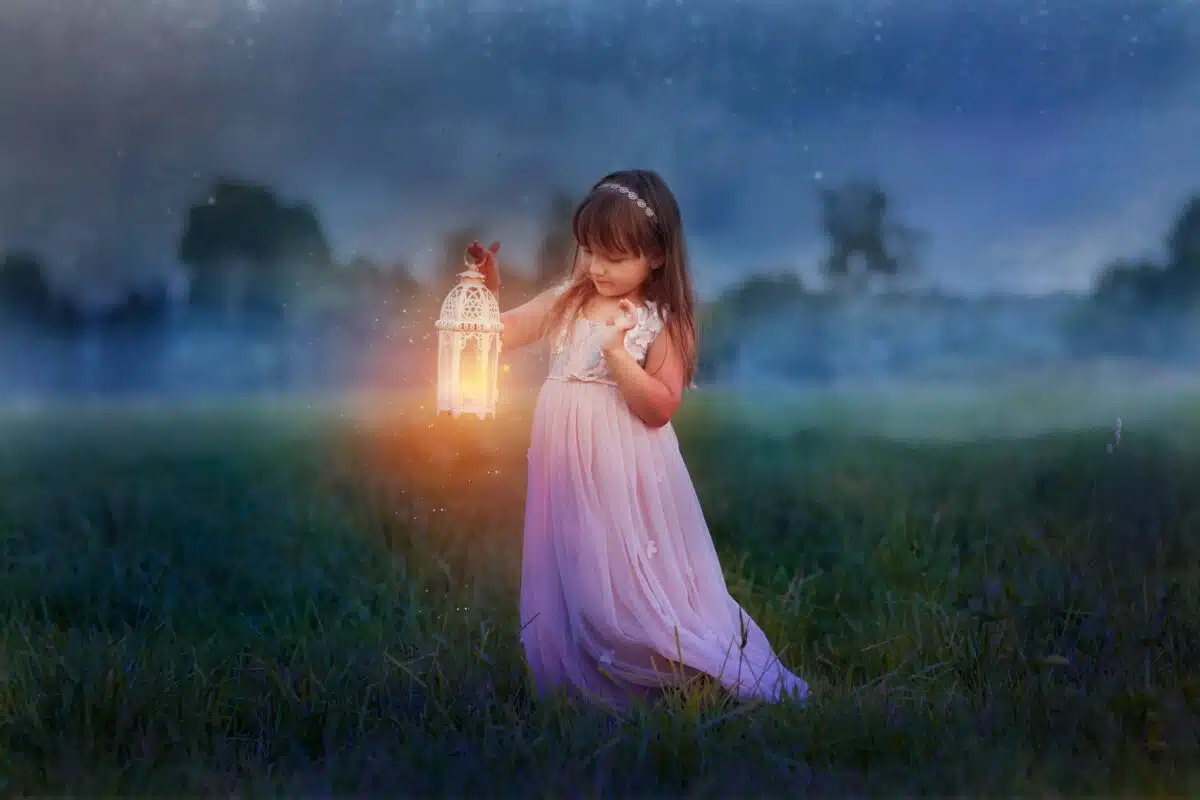
“The Months” by Christina G. Rossetti
January, cold, desolate;
February, all dripping wet;
March wind ranges;
April changes;
Birds sing in tune
To flowers of May,
And sunny June
Brings longest day;
In scorched July
The storm clouds fly
Lightning-torn;
August bears corn,
September fruit;
In rough October
Earth must disrobe her;
Stars fall and shoot
In keen November;
And night is long
And cold is strong
In bleak December.
“The Willow” by Elizabeth A. Allen
O Willow, why forever weep,
As one who mourns an endless wrong?
What hidden woe can lie so deep?
What utter grief can last so long?
Mourn on forever, unconsoled,
And keep your secret, faithful tree;
No heart in all the world can hold
A sweeter grace than constancy.
“The Breath O’ Life” by Mrs. E. P. Miller
Our lungs are formed of curious cells,
And tubes to draw in air,
And if we breathe quite deep and full,
And take our needful share,
‘T will keep our blood so red and pure,
Our health so firm and true,
We scarce shall know what suffering means,
But joyous feel and new.
But if we wear our clothing tight,
The little cells will close,
And then they cannot do their work,
And thus our health we lose ; —
Or if we breathe the air impure,
‘T will give us tainted blood,
While plenty, pure, sun-ripened air
Will make us glad and good.
Classic Children’s Poems

“Jabberwocky” by Lewis Carroll
’Twas brillig, and the slithy toves
Did gyre and gimble in the wabe;
All mimsy were the borogoves,
And the mome raths outgrabe.
“Beware the Jabberwock, my son
The jaws that bite, the claws that catch!
Beware the Jubjub bird, and shun
The frumious Bandersnatch!”
He took his vorpal sword in hand;
Long time the manxome foe he sought—
So rested he by the Tumtum tree,
And stood awhile in thought.
And, as in uffish thought he stood,
The Jabberwock, with eyes of flame,
Came whiffling through the tulgey wood,
And burbled as it came!
One, two! One, two! And through and through
The vorpal blade went snicker-snack!
He left it dead, and with its head
He went galumphing back.
“And hast thou slain the Jabberwock?
Come to my arms, my beamish boy!
O frabjous day! Callooh! Callay!”
He chortled in his joy.
’Twas brillig, and the slithy toves
Did gyre and gimble in the wabe;
All mimsy were the borogoves,
And the mome raths outgrabe.
“The Tyger” by William Blake
Tyger! Tyger! burning bright
In the forests of the night,
What immortal hand or eye
Could frame thy fearful symmetry?
In what distant deeps or skies
Burnt the fire of thine eyes?
On what wings dare he aspire?
What the hand, dare sieze the fire?
And what shoulder, & what art,
Could twist the sinews of thy heart?
And when thy heart began to beat,
What dread hand? & what dread feet?
What the hammer? what the chain?
In what furnace was thy brain?
What the anvil? what dread grasp
Dare its deadly terrors clasp?
When the stars threw down their spears,
And water’d heaven with their tears,
Did he smile his work to see?
Did he who made the Lamb make thee?
Tyger! Tyger! burning bright
In the forests of the night,
What immortal hand or eye
Dare frame thy fearful symmetry?
“The Owl” by Alfred Lord Tennyson
When cats run home and light is come,
And dew is cold upon the ground,
And the far-off stream is dumb,
And the whirring sail goes round,
And the whirring sail goes round;
Alone and warming his five wits,
The white owl in the belfry sits.
When merry milkmaids click the latch,
And rarely smells the new-mown hay,
And the cock hath sung beneath the thatch
Twice or thrice his roundelay,
Twice or thrice his roundelay;
Alone and warming his five wits,
The white owl in the belfry sits.
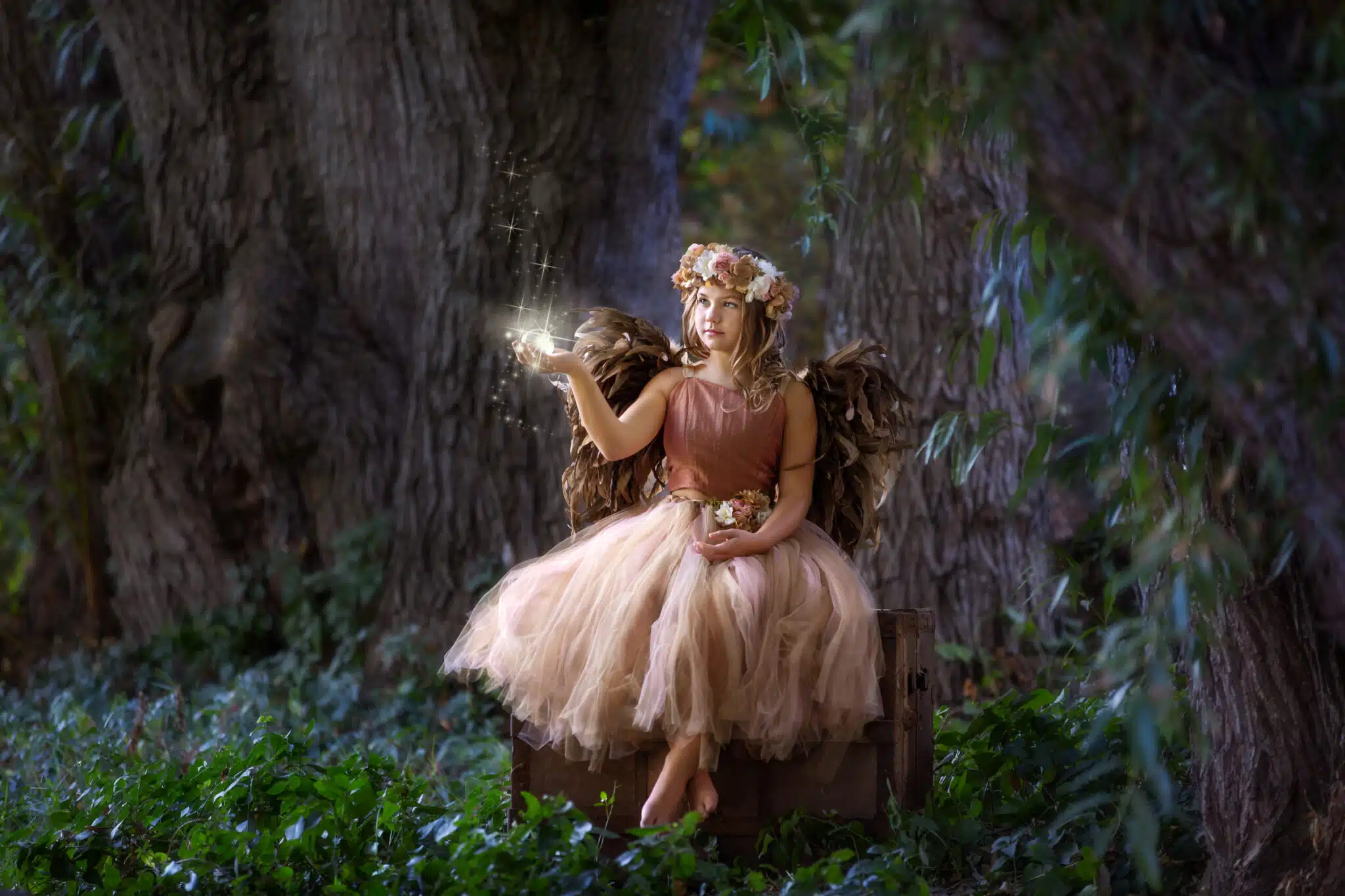
“The Captain’s Daughter” by James T. Fields
We were crowded in the cabin,
Not a soul would dare to sleep,—
It was midnight on the waters,
And a storm was on the deep.
‘Tis a fearful thing in winter
To be shattered by the blast,
And to hear the rattling trumpet
Thunder, “Cut away the mast!”
So we shuddered there in silence,—
For the stoutest held his breath,
While the hungry sea was roaring
And the breakers talked with Death.
As thus we sat in darkness,
Each one busy with his prayers,
“We are lost!” the captain shouted
As he staggered down the stairs.
But his little daughter whispered,
As she took his icy hand,
“Isn’t God upon the ocean,
Just the same as on the land?”
Then we kissed the little maiden.
And we spoke in better cheer,
And we anchored safe in harbour
When the morn was shining clear.
“Faery Songs” by John Keats
I.
Shed no tear! oh, shed no tear!
The flower will bloom another year.
Weep no more! oh, weep no more!
Young buds sleep in the root’s white core.
Dry your eyes! oh, dry your eyes!
For I was taught in Paradise
To ease my breast of melodies,—
Shed no tear.
Overhead! look overhead!
‘Mong the blossoms white and red—
Look up, look up! I flutter now
On this fresh pomegranate bough.
See me! ’tis this silvery bill
Ever cures the good man’s ill.
Shed no tear! oh, shed no tear!
The flower will bloom another year.
Adieu, adieu — I fly — adieu!
I vanish in the heaven’s blue,—
Adieu, adieu!
II.
Ah! woe is me! poor silver-wing!
That I must chant thy lady’s dirge,
And death to this fair haunt of spring,
Of melody, and streams of flowery verge,—
Poor silver-wing! ah! woe is me!
That I must see
These blossoms snow upon thy lady’s pall!
Go, pretty page! and in her ear
Whisper that the hour is near!
Softly tell her not to fear
Such calm favonian burial!
Go, pretty page! and soothly tell,—
The blossoms hang by a melting spell,
And fall they must, ere a star wink thrice
Upon her closed eyes,
That now in vain are weeping their last tears,
At sweet life leaving, and these arbours green,—
Rich dowry from the Spirit of the Spheres,
Alas! poor Queen!
“Blow, Bugle, Blow” by Alfred Lord Tennyson
The splendour falls on castle walls
And snowy summits old in story:
The long light shakes across the lakes,
And the wild cataract leaps in glory.
Blow, bugle, blow, set the wild echoes flying,
Blow, bugle; answer, echoes, dying, dying, dying.
O hark, O hear! how thin and clear,
And thinner, clearer, farther going!
O sweet and far from cliff and scar
The horns of Elfland faintly blowing!
Blow, let us hear the purple glens replying:
Blow, bugle; answer, echoes, dying, dying, dying.
O love, they die in yon rich sky,
They faint on hill or field or river:
Our echoes roll from soul to soul,
And grow for ever and for ever.
Blow, bugle, blow, set the wild echoes flying,
And answer, echoes, answer, dying, dying, dying.
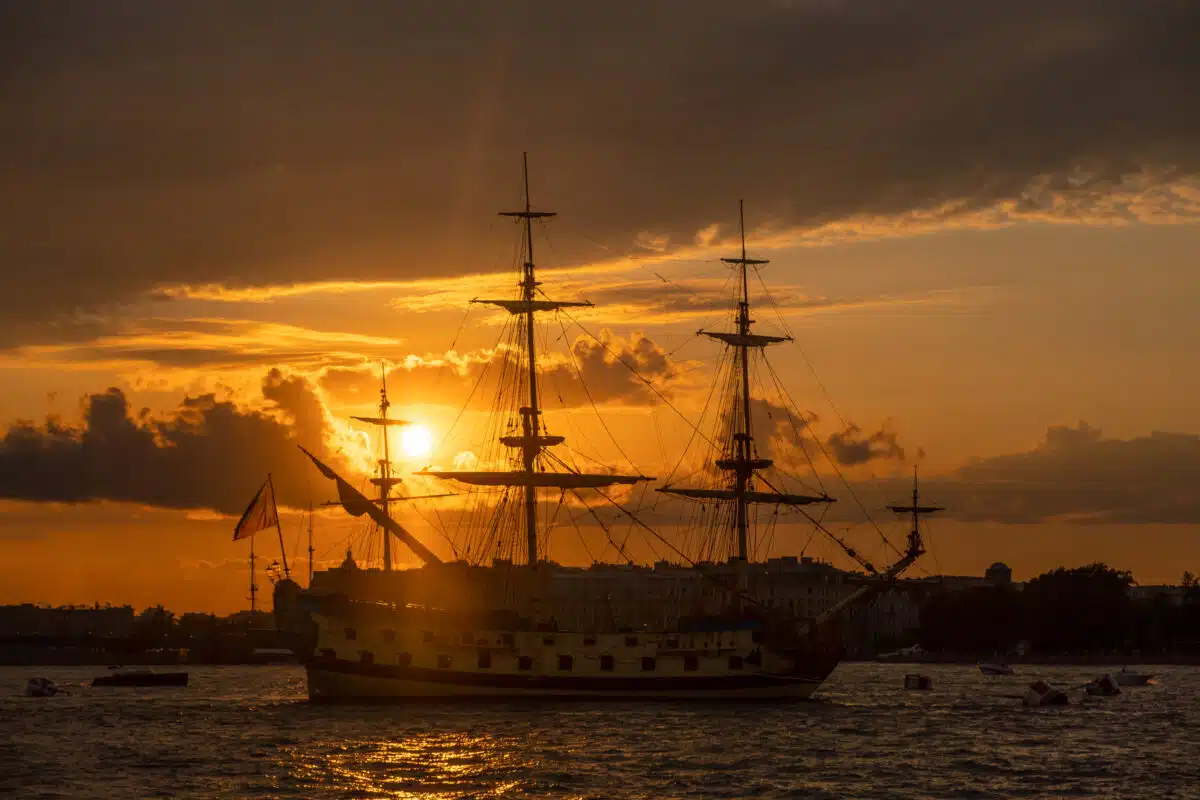
“Old Ironsides” by Oliver Wendell Holmes
Ay, tear her tattered ensign down!
Long has it waved on high,
And many an eye has danced to see
That banner in the sky;
Beneath it rung the battle shout,
And burst the cannon’s roar;
The meteor of the ocean air
Shall sweep the clouds no more!
Her deck, once red with heroes’ blood,
Where knelt the vanquished foe,
When winds were hurrying o’er the flood,
And waves were white below,
No more shall feel the victor’s tread,
Or know the conquered knee;—
The harpies of the shore shall pluck
The eagle of the sea!
Oh better that her shattered hulk
Should sink beneath the wave;
Her thunders shook the mighty
deep,
And there should be her grave;
Nail to the mast her holy flag,
Set every threadbare sail,
And give her to the god of storms,
The lightning and the gale!
“Pirate Story” by Robert Louis Stevenson
Three of us afloat in the meadow by the swing,
Three of us aboard in the basket on the lea.
Winds are in the air, they are blowing in the
spring,
And waves are on the meadow like the waves there
are at sea.
Where shall we adventure, to-day that we’re afloat,
Wary of the weather and steering by a star?
Shall it be to Africa, a-steering of the boat,
To Providence, or Babylon, or off to Malabar?
Hi! but here’s a squadron a-rowing on the sea
Cattle on the meadow a-charging with a roar!
Quick, and we’ll escape them, they’re as mad as they
can be,
The wicket is the harbour and the garden is the shore.
“Dirty Jim” by Jane Taylor
There was one little Jim,
‘Tis reported of him ,
And must be to his lasting disgrace,
That he never was seen
With hands at all clean,
Nor yet ever clean was his face.
His friends were much hurt
To see so much dirt,
And often they made him quite clean;
But all was in vain,
He was dirty again,
And not at all fit to be seen.
Then to wash he was sent,
He reluctantly went With water to splash himself o’er;
But he seldom was seen
To have washed himself clean,
And often look’d worse than before.
The idle and bad
Like this little lad,
May be dirty, and black, to be sure;
But good boys are seen To be decent and clean,
Although they are ever so poor.
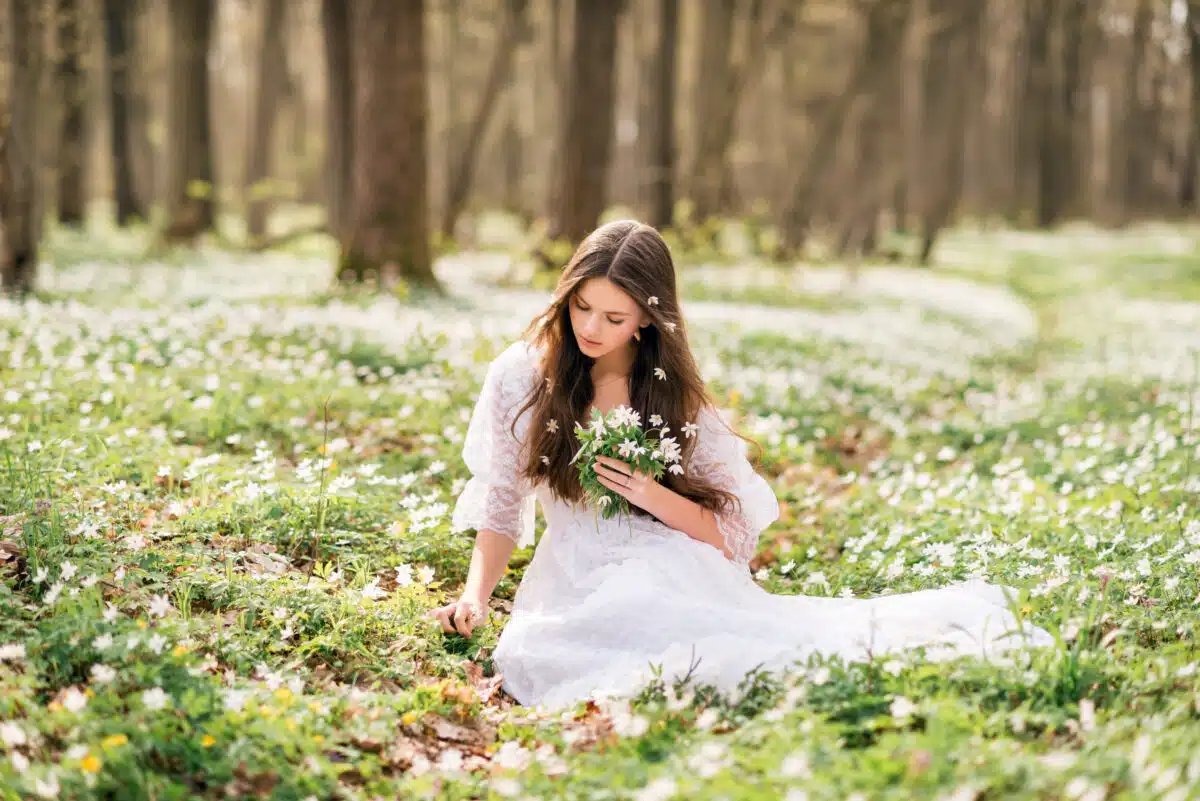
“Wishing” by William Allingham
Ring-Ting! I wish I were a Primrose,
A bright yellow Primrose blowing in the Spring!
The stooping boughs above me,
The wandering bee to love me,
The fern and moss to keep across,
And the Elm-tree for our King !
Nay-nay! I wish I were an Elm- tree,
A great lofty Elm-tree, with green leaves gay!
The winds would set them dancing,
The sun and moonshine glance in,
The Birds would house among the boughs,
And sweetly sing!
0—no! I wish I were a Robin,
A Robin or a little Wren, everywhere to go;
Through forest, field or garden,
And ask no leave or pardon ,
Till Winter comes with icy thumbs To ruffle up our wing.
Well-tell! Where should I fly to,
Where go to sleep in the dark wood or dell?
Before a day was over,
Home comes the rover,
For Mother’s kiss-sweeter this
Than any other thing!
“Old Mother Hubbard” by Sarah Catherine Martin
Old Mother Hubbard, she went to the cupboard,
To get her poor dog a bone.
When she got there, the cupboard was bare,
And so the poor dog had none.
She went to the baker’s to buy him some bread,
But when she came back the poor dog was dead.
She went to the undertaker’s to buy him a coffin,
And when she came back the dog was laughing.
She went to the draper’s to buy him some linen,
And when she came back the good dog was spinning.
She went to the hosier’s to buy him some hose,
And when she came back he was dressed in his clothes.
The dame made a curtsy, the dog made a bow,
The dame said “your servant,” the dog said “Bow-wow.”
She went to the hatter’s to buy him a hat,
And when she came back he was feeding the cat.
She went to the tailor’s to buy him a coat,
And when she came back he was riding the goat.
She went to the barber’s to buy him a wig,
And when she came back he was dancing a jig.
She went to the butcher’s to get him some tripe,
And when she came back he was smoking a pipe.
She went to the fish-shop to buy him some fish,
And when she came back he was washing the dish.
She went to the tavern for white wine and red,
And when she came back the dog stood on his head.
“Duty” by Robert Browning
The sweetest lives are those to duty wed,
Whose deeds, both great and small,
Are close knit strands of an unbroken thread,
Whose love ennobles all.
The world may sound no trumpet, ring no bells;
The book of life, the shining record tells.
Thy love shall chant its own beatitudes,
After its own life-working. A child’s kiss
Set on thy singing lips shall make thee glad;
A poor man served by thee shall make thee rich;
A sick man helped by thee shall make thee strong;
Thou shalt be served thyself by every sense
Of service thou renderest.
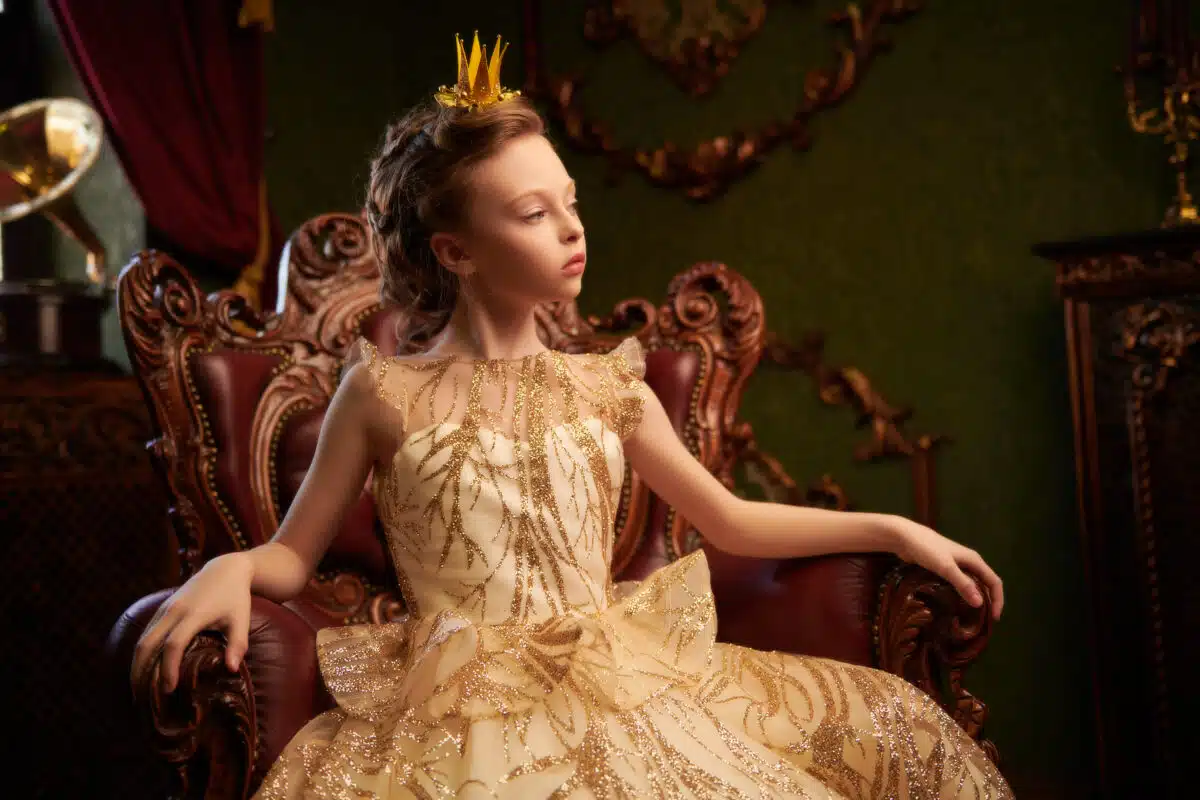
“Be Strong” by Maltbie Davenport Babcock
Be strong!
We are not here to play, to dream, to drift;
We have hard work to do, and loads to lift;
Shun not the struggle—face it; ’tis God’s gift.
Be strong!
Say not, “The days are evil. Who’s to blame?”
And fold the hands and acquiesce—oh shame!
Stand up, speak out, and bravely, in God’s name.
Be strong!
It matters not how deep intrenched the wrong.
How hard the battle goes, the day how long;
Faint not—fight on! To-morrow comes the song.
“Loss and Gain” by H.W. Longfellow
When I compare
What I have lost with what I have gained,
What I have missed with what attained,
Little room do I find for pride.
I am aware
How many days have been idly spent;
How like an arrow the good intent
Has fallen short or been turned aside.
But who shall dare
To measure loss and gain in this wise?
Defeat may be victory in disguise;
The lowest ebb in the turn of the tide.
“Little Boy Blue” by Eugene Field
The little toy dog is covered with dust,
But sturdy and stanch he stands;
And the little toy soldier is red with rust,
And his musket moulds in his hands.
Time was when the little toy dog was new
And the soldier was passing fair,
And that was the time when our Little Boy Blue
Kissed them and put them there.
“Now, don’t you go till I come,” he said,
“And don’t you make any noise!”
So toddling off to his trundle-bed
He dreamt of the pretty toys.
And as he was dreaming, an angel song
Awakened our Little Boy Blue,—
Oh, the years are many, the years are long,
But the little toy friends are true.
Ay, faithful to Little Boy Blue they stand,
Each in the same old place,
Awaiting the touch of a little hand,
The smile of a little face.
And they wonder, as waiting these long years through,
In the dust of that little chair,
What has become of our little Boy Blue
Since he kissed them and put them there.
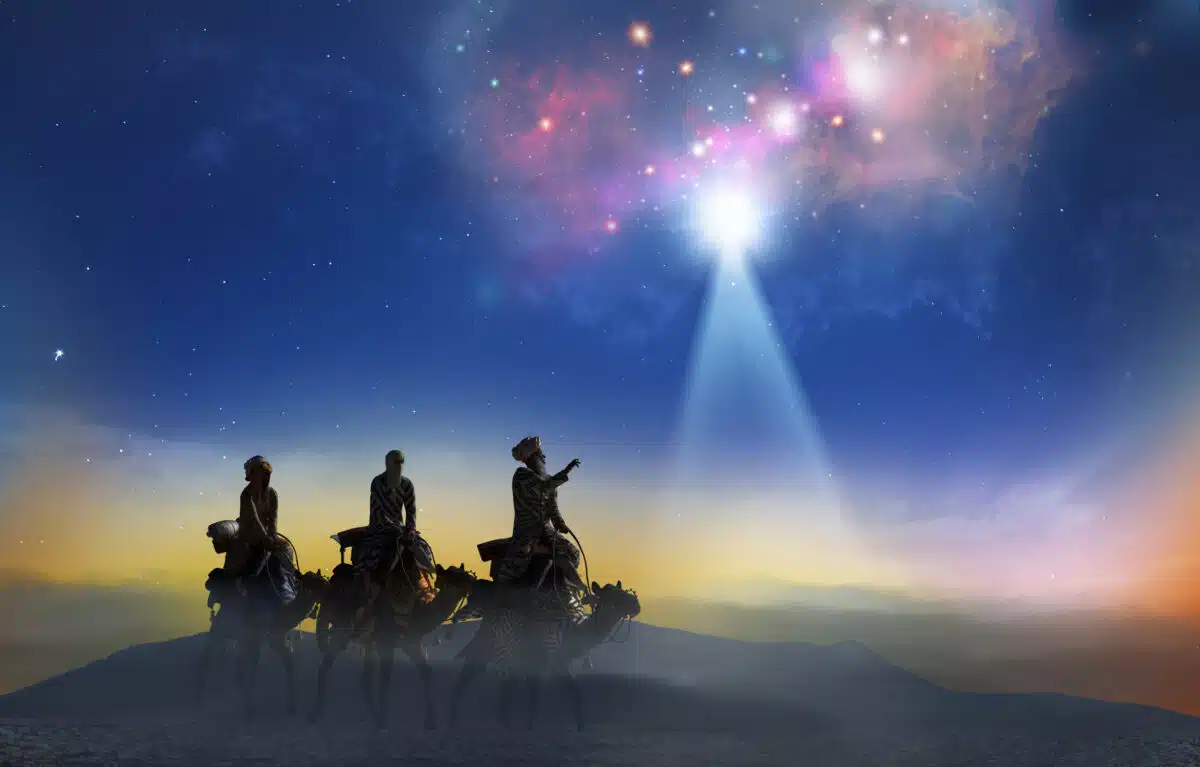
“O Little Town of Bethlehem” by Phillips Brooks
O little town of Bethlehem,
How still we see thee lie!
Above thy deep and dreamless sleep
The silent stars go by;
Yet in thy dark streets shineth
The everlasting Light;
The hopes and fears of all the years
Are met in thee to-night.
For Christ is born of Mary,
And, gathered all above,
While mortals sleep, the angels keep
Their watch of wondering love.
O morning stars, together
Proclaim the holy birth!
And praises sing to God the King,
And peace to men on earth.
How silently, how silently,
The wondrous gift is given!
So God imparts to human hearts
The blessings of His heaven.
No ear may hear His coming,
But in this world of sin,
Where meek souls will receive Him still,
The dear Christ enters in.
O holy Child of Bethlehem!
Descend to us, we pray;
Cast out our sin, and enter in,
Be born in us to-day.
We hear the Christmas angels
The great glad tidings tell;
Oh, come to us, abide with us,
Our Lord Emmanuel!
From “The Lay of the Last Minstrel” by Sir Walter Scott
Breathes there the man with soul so dead
Who never to himself hath said,
This is my own, my native land?
Whose heart hath ne’er within him burned,
As home his footsteps he hath turned
From wandering on a foreign strand?
If such there breathe, go, mark him well;
For him no minstrel raptures swell;
High though his titles, proud his name,
Boundless his wealth as wish can claim,—
Despite those titles, power, and pelf,
The wretch, concentred all in self,
Living, shall forfeit fair renown,
And, doubly dying, shall go down
To the vile dust from whence he sprung,
Unwept, unhonored and unsung.
“Willie Winkie” by William Miller
Wee Willie Winkie
Rins through the toun,
Up stairs and doun stairs
In his nicht-gown,
Tirling at the window,
Crying at the lock,
“Are the weans in their bed,
For it’s now ten o’clock?
“Hey, Willie Winkie,
Are ye coming ben?
The cat’s singing grey thrums
To the sleeping hen,
The dog’s spelder’d on the floor,
And disna gie a cheep,
But here’s a waukrife laddie
That winna fa’ asleep.”
Onything but sleep, you rogue!
Glow’ring like the moon,
Rattling in an airn jug
Wi’ an airn spoon,
Rumblin’, tumblin’, round about,
Crawing like a cock,
Skirlin’ like a kenna-what,
Wauk’nin’ sleeping folk.
“Hey, Willie Winkie –
The wean’s in a creel!
Wamblin’ aff a body’s knee
Like a very eel,
Ruggin’ at the cat’s lug,
Rav’llin’ a’ her thrums –
Hey, Willie Winkie –
See, there he comes!”
Wearied is the mither
That has a stoorie wean,
A wee stumpie stousie,
That canna rin his lane.
That has a battle aye wi’ sleep,
Before he’ll close an e’e –
But a kiss frae aff his rosy lips
Gies strength anew to me.
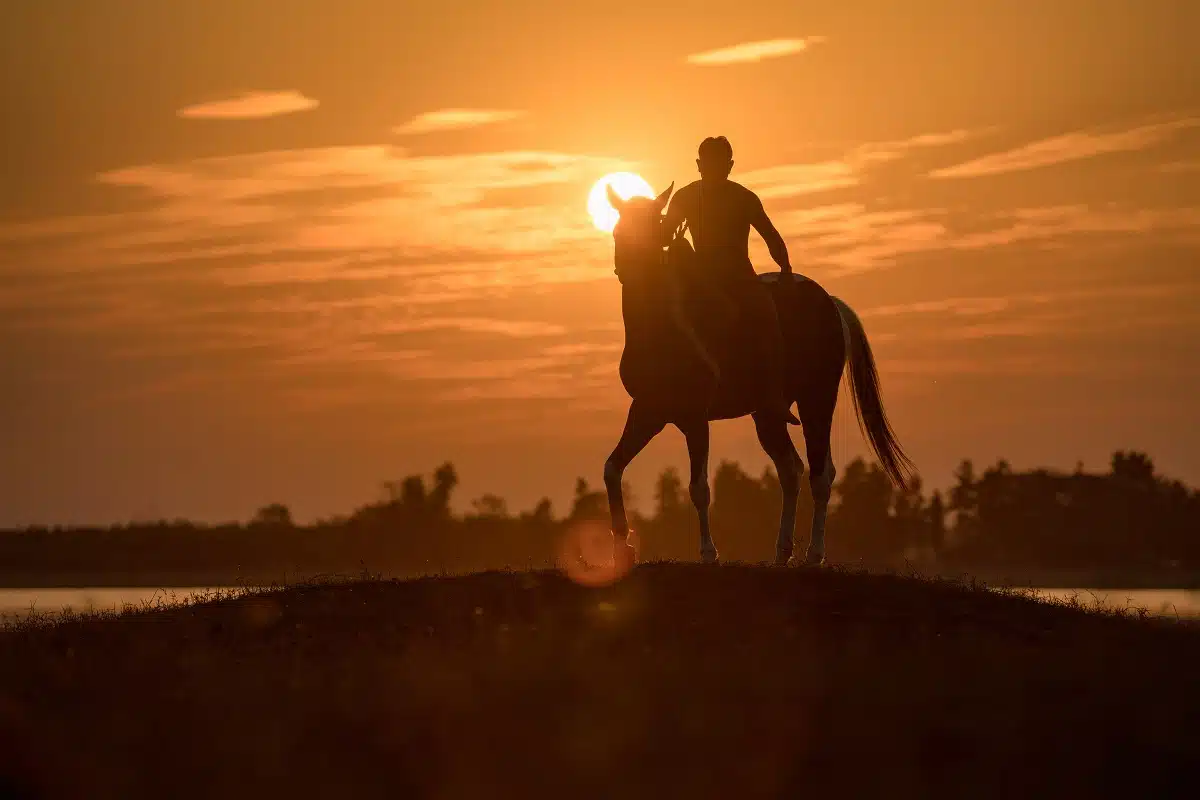
“Paul Revere’s Ride” by Henry W. Longfellow
Listen, my children, and you shall hear
Of the midnight ride of Paul Revere,
On the eighteenth of April, in Seventy-five;
Hardly a man is now alive
Who remembers that famous day and year.
He said to his friend, “If the British march
By land or sea from the town tonight,
Hang a lantern aloft in the belfry arch
Of the North Church tower, as a signal light,—
One, if by land, and two, if by sea;
And I on the opposite shore will be,
Ready to ride and spread the alarm
Through every Middlesex village and farm,
For the country folk to be up and to arm.”
Then he said, “Good-night”; and with muffled oar
Silently rowed to the Charlestown shore,
Just as the moon rose over the bay,
Where, swinging wide at her moorings, lay
The Somerset, British man-of-war,
A phantom ship, with each mast and spar
Across the moon like a prison bar,
And a huge black hulk, that was magnified
By its own reflection in the tide.
Meanwhile, his friend through alley and street
Wanders and watches with eager ears,
Till, in the silence around him, he hears
The muster of men at the barrack door,
The sound of arms, and the tramp of feet,
And the measured tread of the grenadiers
Marching down to their boats on the shore.
Then he climbed to the tower of the old North Church,
By the wooden stairs, with stealthy tread,
To the belfry chamber overhead,
And startled the pigeons from their perch
On the sombre rafters, that round him made
Masses and moving shapes of shade;
By the trembling ladder, steep and tall,
To the highest window in the wall,
Where he paused to listen, and look down
A moment on the roofs of the town,
And the moonlight flowing over all.
Beneath, in the churchyard, lay the dead
In their night encampment on the hill,
Wrapped in silence so deep and still
That he could hear, like a sentinel’s tread,
The watchful night wind, as it went,
Creeping along from tent to tent,
And seeming to whisper, “All is well!”
A moment only he feels the spell
Of the place and hour, and the secret dread
Of the lonely belfry and the dead,
For suddenly all his thoughts are bent
On a shadowy something far away,
Where the river widens to meet the bay,
A line of black, that bends and floats
On the rising tide, like a bridge of boats.
Meanwhile, impatient to mount and ride,
Booted and spurred, with a heavy stride
On the opposite shore walked Paul Revere.
Now he patted his horse’s side,
Now gazed on the landscape far and near,
Then impetuous stamped the earth,
And turned and tightened his saddle girth;
But mostly he watched with eager search
The belfry tower of the old North Church,
As it rose above the graves on the hill,
Lonely and spectral, and sombre and still.
And lo! as he looks, on the belfry’s height
A glimmer, and then a gleam of light!
He springs to the saddle, the bridle he turns,
But lingers and gazes, till full on his sight
A second lamp in the belfry burns.
A harry of hoofs in a village street,
A shape in the moonlight, a bulk in the dark,
And beneath from the pebbles, in passing, a spark
Struck out by a steed flying fearless and fleet;
That was all! And yet, through the gloom and the light,
The fate of a nation was riding that night;
And the spark struck out by that steed, in his flight,
Kindled the land into flame with its heat.
He has left the village and mounted the steep,
And beneath him, tranquil and broad and deep,
Is the Mystic, meeting the ocean tides;
And under the alders, that skirt its edge,
Now soft on the sand, now loud on the ledge,
Is heard the tramp of his steed as he rides.
It was twelve by the village clock
When he crossed the bridge into Medford town.
He heard the crowing of the cock,
And the barking of the farmer’s dog,
And felt the damp of the river fog,
That rises after the sun goes down.
It was one by the village clock
When he galloped into Lexington,
He saw the gilded weathercock
Swim in the moonlight as he passed,
And the meeting house windows, blank and bare,
Gaze at him with a spectral glare
As if they already stood aghast
At the bloody work they would look upon.
It was two by the village clock
When he came to the bridge in Concord town.
He heard the bleating of the flock,
And the twittering of birds among the trees,
And felt the breath of the morning breeze
Blowing over the meadows brown.
And one was safe and asleep in his bed
Who at the bridge would be first to fall,
Who that day would be lying dead,
Pierced by a British musket ball.
You know the rest. In the books you have read
How the British regulars fired and fled—
How the farmers gave them ball for ball,
From behind each fence and farmyard wall,
Chasing the red coats down the lane,
Then crossing the fields to emerge again
Under the trees at the turn of the road,
And only pausing to fire and load.
So through the night rode Paul Revere;
And so through the night went his cry of alarm
To every Middlesex village and farm—
A cry of defiance, and not of fear—
A voice in the darkness, a knock at the door,
And a word that shall echo forever-more;
For borne on the night wind of the past,
Through all our history to the last,
In the hour of darkness and peril and need,
The people will waken and listen to hear
The hurrying hoof beats of that steed,
And the midnight message of Paul Revere.
“Thanksgiving-Day” by Lydia Maria Child
Over the river and through the wood,
To Grandfather’s house we go;
The horse knows the way
To carry the sleigh
Through the white and drifted snow.
Over the river and through the wood,—
Oh, how the wind does blow!
It stings the toes,
And bites the nose,
As over the ground we go.
Over the river and through the wood,
Trot fast, my dapple gray!
Spring over the ground,
Like a hunting hound,
For this is Thanksgiving-Day.
Over the river and through the wood,
And straight through the barnyard gate!
We seem to go
Extremely slow,—
It is so hard to wait!
Over the river and through the wood;
Now Grandmother’s cap I spy!
Hurrah for the fun!
Is the pudding done?
Hurrah for the pumpkin pie!
“The Corn Song” by John G. Whittier
Heap high the farmer’s wintry hoard!
Heap high the golden corn!
No richer gift has Autumn poured
From out her lavish horn!
Let other lands, exulting, glean
The apple from the pine,
The orange from its glossy green,
The cluster from the vine;
We better love the hardy gift
Our rugged vales bestow,
To cheer us when the storm shall drift
Our harvest-fields with snow.
Through vales of grass and meads of flowers,
Our plows their furrows made,
While on the hills the sun and showers
Of changeful April played.
We dropped the seed o’er hill and plain,
Beneath the sun of May,
And frightened from our sprouting grain
The robber crows away.
All through the long, bright days of June,
Its leaves grew green and fair,
And waved in hot midsummer’s noon
Its soft and yellow hair.
And now, with Autumn’s moonlit eyes,
Its harvest time has come,
We pluck away the frosted leaves
And bear the treasure home.
There, richer than the fabled gift
Apollo showered of old,
Fair hands the broken grain shall sift,
And knead its meal of gold.
Let vapid idlers loll in silk,
Around their costly board;
Give us the bowl of samp and milk,
By homespun beauty poured!
Where’er the wide old kitchen hearth
Sends up its smoky curls,
Who will not thank the kindly earth,
And bless our farmer girls!
Then shame on all the proud and vain,
Whose folly laughs to scorn
The blessing of our hardy grain,
Our wealth of golden corn!
Let earth withhold her goodly root,
Let mildew blight her rye,
Give to the worm the orchard’s fruit,
The wheat-field to the fly:
But let the good old crop adorn
The hills our fathers trod;
Still let us, for His golden corn,
Send up our thanks to God!
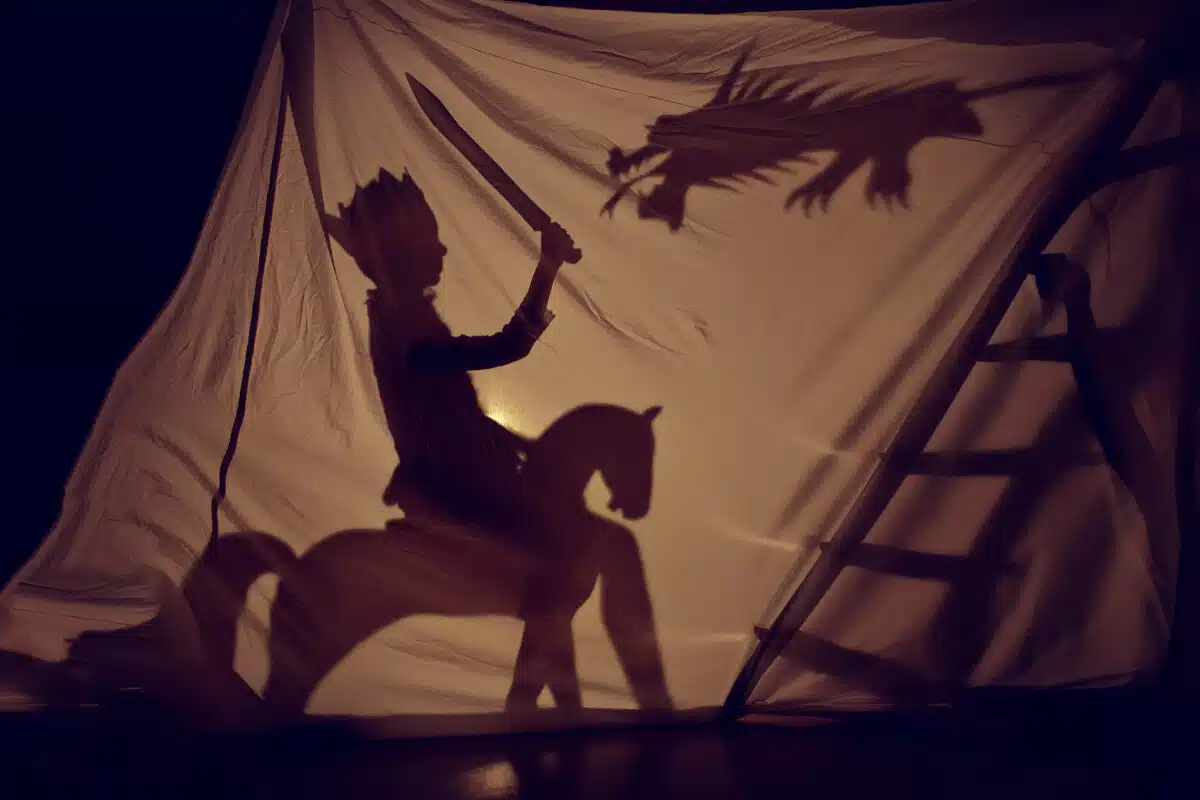
“My Shadow” by Robert Louis Stevenson
I have a little shadow that goes in and out with me,
And what can be the use of him is more than I can see.
He is very, very like me from the heels up to the head;
And I see him jump before me, when I jump into my bed.
The funniest thing about him is the way he likes to grow—
Not at all like proper children, which is always very slow;
For he sometimes shoots up taller like an india-rubber ball,
And he sometimes gets so little that there’s none of him at all.
He hasn’t got a notion of how children ought to play,
And can only make a fool of me in every sort of way.
He stays so close beside me, he’s a coward, you can see;
I’d think shame to stick to nursie as that shadow sticks to me!
One morning, very early, before the sun was up,
I rose and found the shining dew on every buttercup;
But my lazy little shadow, like an arrant sleepy-head,
Had stayed at home behind me and was fast asleep in bed.
“The Flag Goes By” by Henry Holcomb Bennett
Hats off!
Along the street there comes
A blare of bugles, a ruffle of drums,
A flash of colour beneath the sky:
Hats off!
The flag is passing by!
Blue and crimson and white it shines
Over the steel-tipped, ordered lines.
Hats off!
The colours before us fly;
But more than the flag is passing by.
Sea-fights and land-fights, grim and great,
Fought to make and to save the State:
Weary marches and sinking ships;
Cheers of victory on dying lips;
Days of plenty and years of peace;
March of a strong land’s swift increase;
Equal justice, right, and law,
Stately honour and reverend awe;
Sign of a nation, great and strong
Toward her people from foreign wrong:
Pride and glory and honour,—all
Live in the colours to stand or fall.
Hats off!
Along the street there comes
A blare of bugles, a ruffle of drums;
And loyal hearts are beating high:
Hats off!
The flag is passing by!
“The Arrow and the Song” by Henry W. Longfellow
I shot an arrow into the air,
It fell to earth, I knew not where;
For, so swiftly it flew, the sight
Could not follow it in its flight.
I breathed a song into the air,
It fell to earth, I knew not where;
For who has sight so keen and strong
That it can follow the flight of song?
Long, long afterward, in an oak
I found the arrow, still unbroke;
And the song, from beginning to end,
I found again in the heart of a friend.
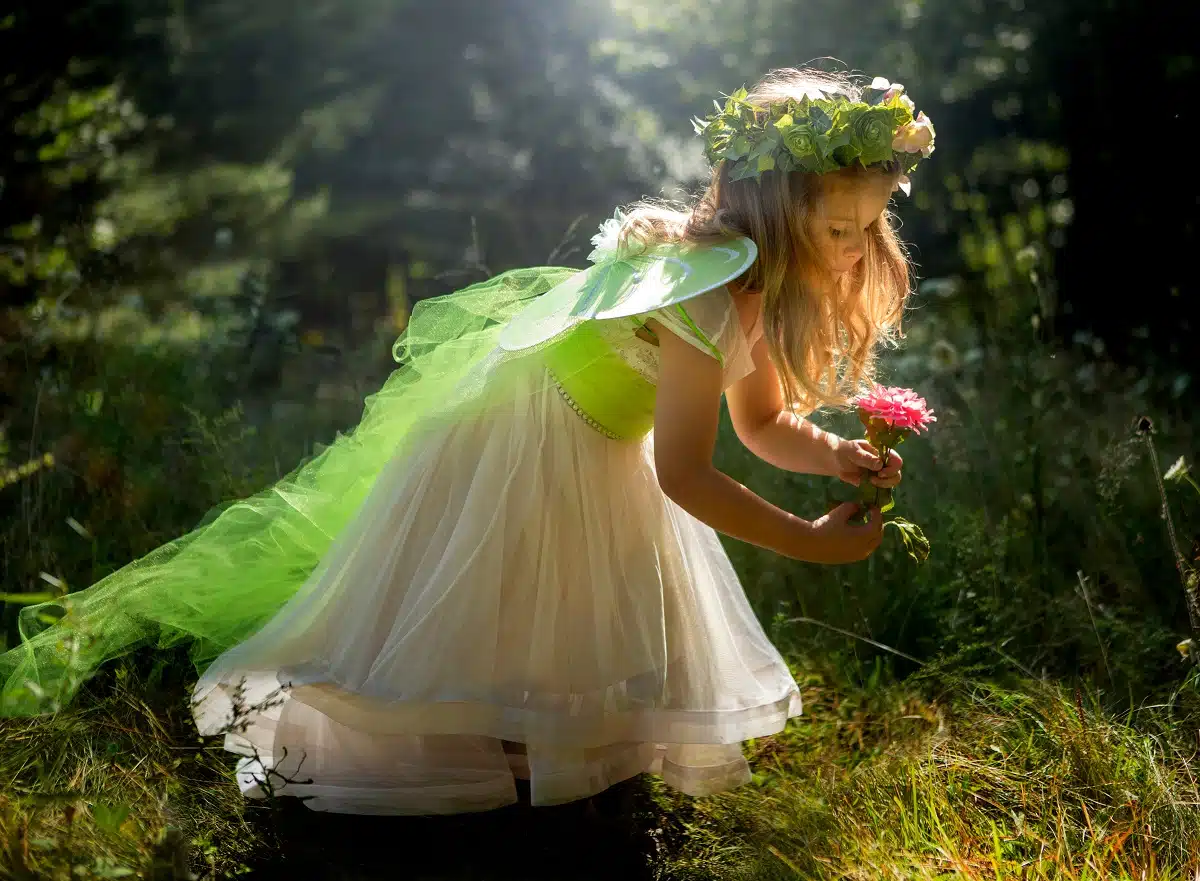
“A Psalm of Life” by Henry W. Longfellow
Tell me not, in mournful numbers,
Life is but an empty dream!—
For the soul is dead that slumbers,
And things are not what they seem.
Life is real! Life is earnest!
And the grave is not its goal;
Dust thou art, to dust returnest,
Was not spoken of the soul.
Not enjoyment, and not sorrow,
Is our destined end or way;
But to act, that each to-morrow
Find us farther than to-day.
Art is long, and Time is fleeting,
And our hearts, though stout and brave,
Still, like muffled drums, are beating
Funeral marches to the grave.
In the world’s broad field of battle,
In the bivouac of Life,
Be not like dumb, driven cattle!
Be a hero in the strife!
Trust no Future, howe’er pleasant!
Let the dead Past bury its dead!
Act,—act in the living Present!
Heart within, and God o’erhead!
Lives of great men all remind us
We can make our lives sublime,
And, departing, leave behind us
Footprints on the sands of time;
Footprints, that perhaps another,
Sailing o’er life’s solemn main,
A forlorn and shipwrecked brother,
Seeing, shall take heart again.
Let us, then, be up and doing,
With a heart for any fate;
Still achieving, still pursuing,
Learn to labour and to wait.
“Old Grimes” by Albert Gorton Greene
Old Grimes is dead; that good old man,
We ne’er shall see him more;
He used to wear a long, black coat,
All buttoned down before.
His heart was open as the day,
His feelings all were true;
His hair was some inclined to gray,
He wore it in a queue.
He lived at peace with all mankind,
In friendship he was true;
His coat had pocket-holes behind,
His pantaloons were blue.
He modest merit sought to find,
And pay it its desert;
He had no malice in his mind,
No ruffles on his shirt.
His neighbours he did not abuse,
Was sociable and gay;
He wore large buckles on his shoes,
And changed them every day.
His knowledge, hid from public gaze,
He did not bring to view,
Nor make a noise town-meeting days,
As many people do.
His worldly goods he never threw
In trust to fortune’s chances,
But lived (as all his brothers do)
In easy circumstances.
Thus undisturbed by anxious cares
His peaceful moments ran;
And everybody said he was
A fine old gentleman.
“A Life on the Ocean Wave” by Epes Sargent
A life on the ocean wave,
A home on the rolling deep,
Where the scattered waters rave,
And the winds their revels keep!
Like an eagle caged, I pine
On this dull, unchanging shore:
Oh! give me the flashing brine,
The spray and the tempest’s roar!
Once more on the deck I stand
Of my own swift-gliding craft:
Set sail! farewell to the land!
The gale follows fair abaft.
We shoot through the sparkling foam
Like an ocean-bird set free;—
Like the ocean-bird, our home
We’ll find far out on the sea.
The land is no longer in view,
The clouds have begun to frown;
But with a stout vessel and crew,
We’ll say, Let the storm come down!
And the song of our hearts shall be,
While the winds and the waters rave,
A home on the rolling sea!
A life on the ocean wave!
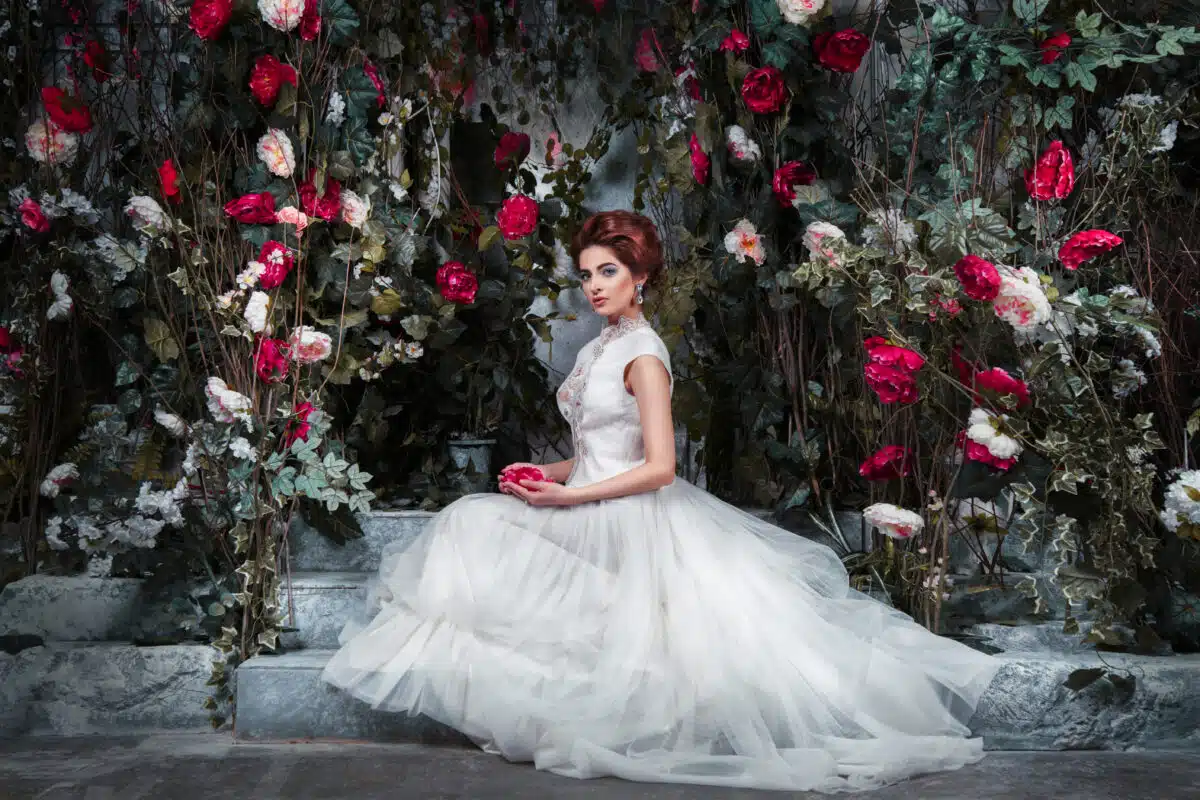
“The Last Rose of Summer” by Thomas Moore
‘Tis the last rose of summer
Left blooming alone;
All her lovely companions
Are faded and gone;
No flower of her kindred,
No rose-bud is nigh,
To reflect back her blushes,
Or give sigh for sigh.
I’ll not leave thee, thou lone one!
To pine on the stem;
Since the lovely are sleeping,
Go, sleep thou with them.
Thus kindly I scatter
Thy leaves o’er the bed
Where thy mates of the garden
Lie scentless and dead.
So soon may I follow,
When friendships decay,
And from Love’s shining circle
The gems drop away.
When true hearts lie withered,
And fond ones are flown,
O! who would inhabit
This bleak world alone?
Rhyming Poems for Kids
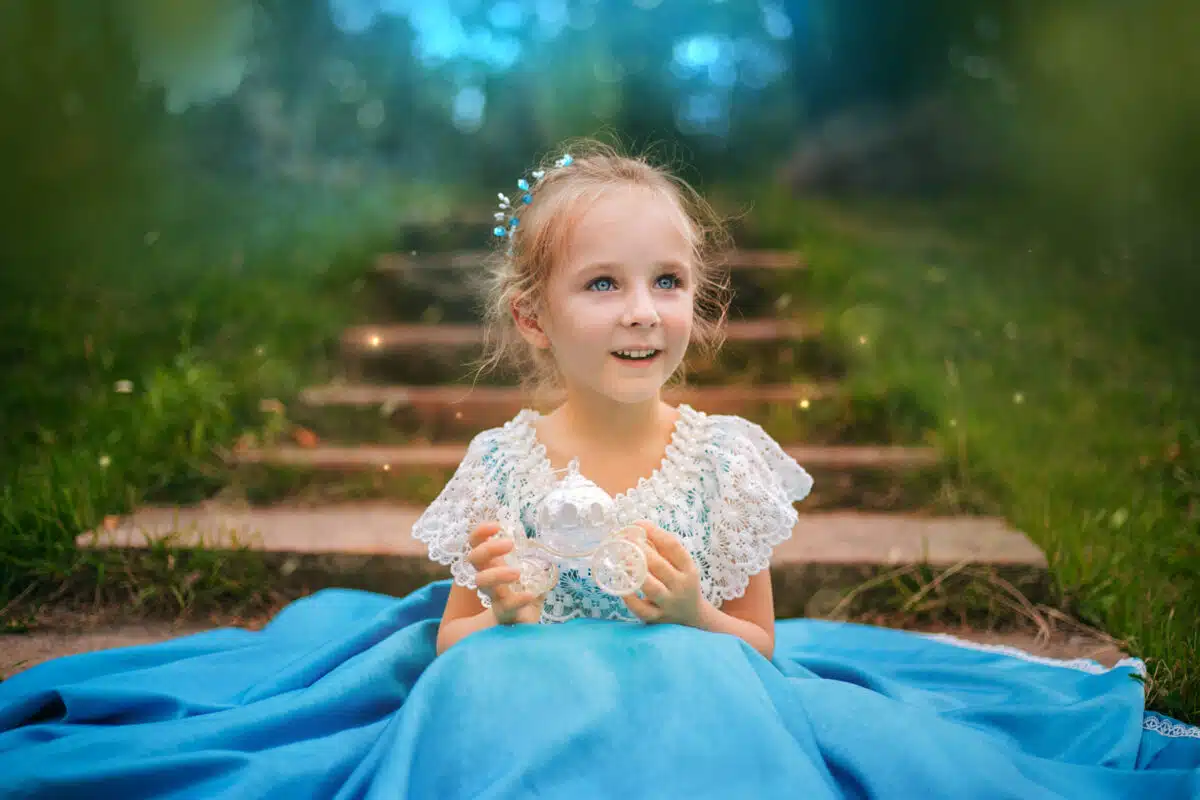
“The Owl And The Pussy-Cat” by Edward Lear
The Owl and The Pussy-Cat
The Owl and the Pussy-Cat went to sea
In a beautiful pea-green boat;
They took some honey, and plenty of money,
Wrapped up in a five-pound note.
The Owl looked up to the moon above
And sang to a small guitar,
“O lovely Pussy! O Pussy, my love!
What a beautiful Pussy you are,—
You are,
What a beautiful Pussy you are!”
Pussy said to the Owl, “You elegant fowl!
How wonderful sweet you sing!
Oh, let us be married,—too long we have tarried,—
But what shall we do for a ring?”
They sailed away for a year and a day
To the land where the Bong-tree grows,
And there in a wood, a piggy-wig stood
With a ring in the end of his nose,—
His nose,
With a ring in the end of his nose.
“Dear Pig, are you willing to sell for one shilling
Your ring?” Said the Piggy, “I will.”
So they took it away, and were married next day
By the turkey who lives on the hill.
They dined upon mince and slices of quince
Which they ate with a runcible spoon,
And hand in hand on the edge of the sand
They danced by the light of the moon,—
The moon,
They danced by the light of the moon.
“Father William” by Lewis Carroll
“You are old, Father William,” the young man said,
“And your hair has become very white;
And yet you incessantly stand on your head,
Do you think, at your age, it is right?”
“In my youth,” Father William replied to his son,
“I feared it might injure the brain;
But, now that I’m perfectly sure I have none,
Why, I do it again and again.”
“You are old,” said the youth, “as I mentioned before,
And have grown most uncommonly fat;
Yet you turned a back-somersault in at the door,
Pray, what is the reason of that?”
“In my youth,” said the sage, as he shook his grey locks,
“I kept all my limbs very supple
By the use of this ointment,one shilling the box,
Allow me to sell you a couple?”
“You are old,” said the youth, “and your jaws are too weak
For anything tougher than suet;
Yet you finished the goose, with the bones and the beak,
Pray, how did you manage to do it?”
“In my youth,” said his father, “I took to the law,
And argued each case with my wife;
And the muscular strength which it gave to my jaw
Has lasted the rest of my life.”
“You are old,” said the youth, “one would hardly suppose
That your eye was as steady as ever;
Yet you balanced an eel on the end of your nose,
What made you so awfully clever?”
“I have answered three questions, and that is enough,”
Said his father. “Don’t give yourself airs!
Do you think I can listen all day to such stuff?
Be off, or I’ll kick you downstairs!”
“The Banks o’ Doon” By Robert Burns
Ye banks and braes o’ bonnie Doon,
How can ye bloom sae fresh and fair?
How can ye chant, ye little birds,
And I sae weary fu’ o’ care?
Thou’ll break my heart, thou warbling bird,
That wantons through the flowering thorn;
Thou minds me o’ departed joys,
Departed—never to return!
Oft ha’e I roved by bonnie Doon,
To see the rose and woodbine twine;
And ilka bird sang o’ its luve,
And fondly sae did I o’ mine.
Wi’ lightsome heart I pu’d a rose,
Fu’ sweet upon its thorny tree;
And my fause lover stole my rose,
But ah! he left the thorn wi’ me.
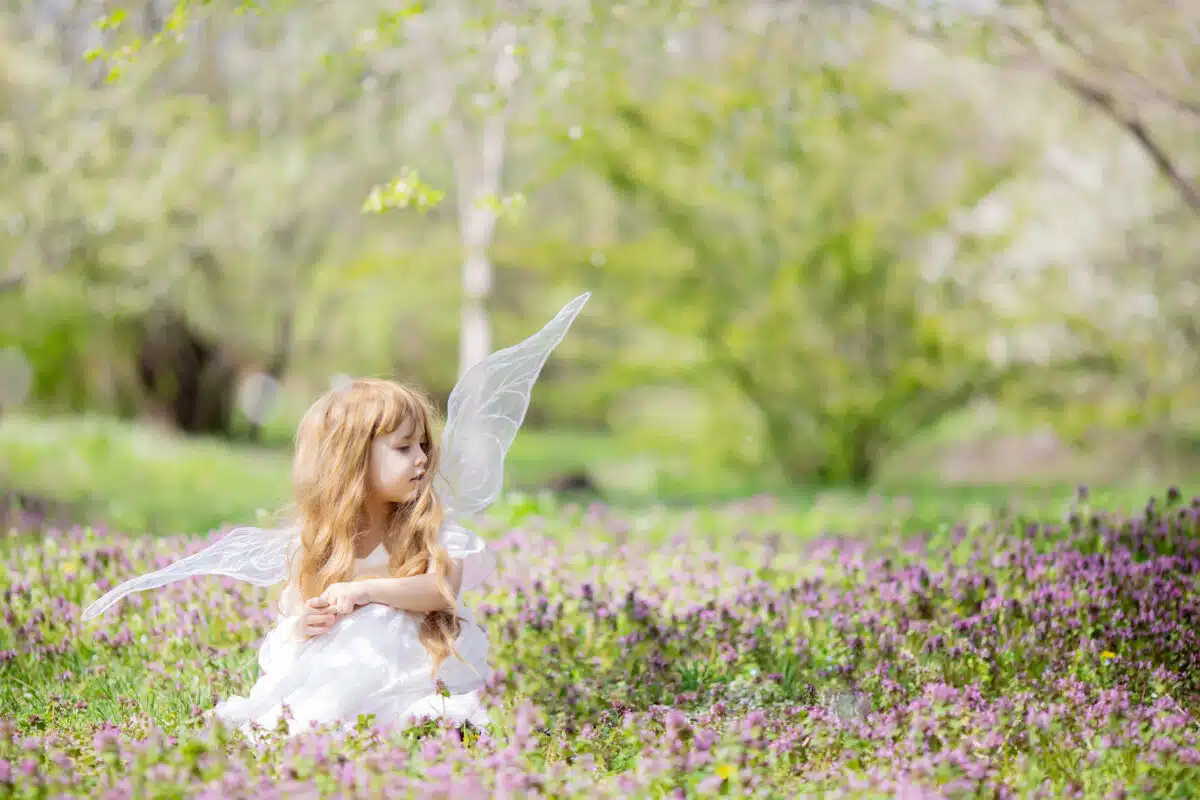
“To A Butterfly” by William Wordsworth
I’ve watched you now a full half-hour;
Self-poised upon that yellow flower
And, little Butterfly! indeed
I know not if you sleep or feed.
How motionless! not frozen seas
More motionless! and then
What joy awaits you, when the breeze
Hath found you out among the trees,
And calls you forth again!
This plot of orchard-ground is ours;
My trees they are, my Sister’s flowers;
Here rest your wings when they are weary;
Here lodge as in a sanctuary!
Come often to us, fear no wrong;
Sit near us on the bough!
We’ll talk of sunshine and of song,
And summer days, when we were young;
Sweet childish days, that were as long
As twenty days are now.
“Wings” by Mary Louise Ritter
The sunset light is on the sail,
The water all aglow,
And on the billows up and down
The boat rocks to and fro;
The birds float upward to the sky—
Oh, how I long for wings to fly!
The boat has wings, the birds have wings,
But none remain for me
Save wings of kind and loving thought
And wings of memory.
On these I come, and still repeat—
I love, I love, I love you, Sweet!
“Fable” by Ralph Waldo Emerson
The mountain and the squirrel
Had a quarrel;
And the former called the latter ‘Little Prig.’
Bun replied,
‘You are doubtless very big;
But all sorts of things and weather
Must be taken in together,
To make up a year
And a sphere.
And I think it no disgrace
To occupy my place.
If I’m not so large as you,
You are not so small as I,
And not half so spry.
I’ll not deny you make
A very pretty squirrel track;
Talents differ; all is well and wisely put;
If I cannot carry forests on my back,
Neither can you crack a nut.’
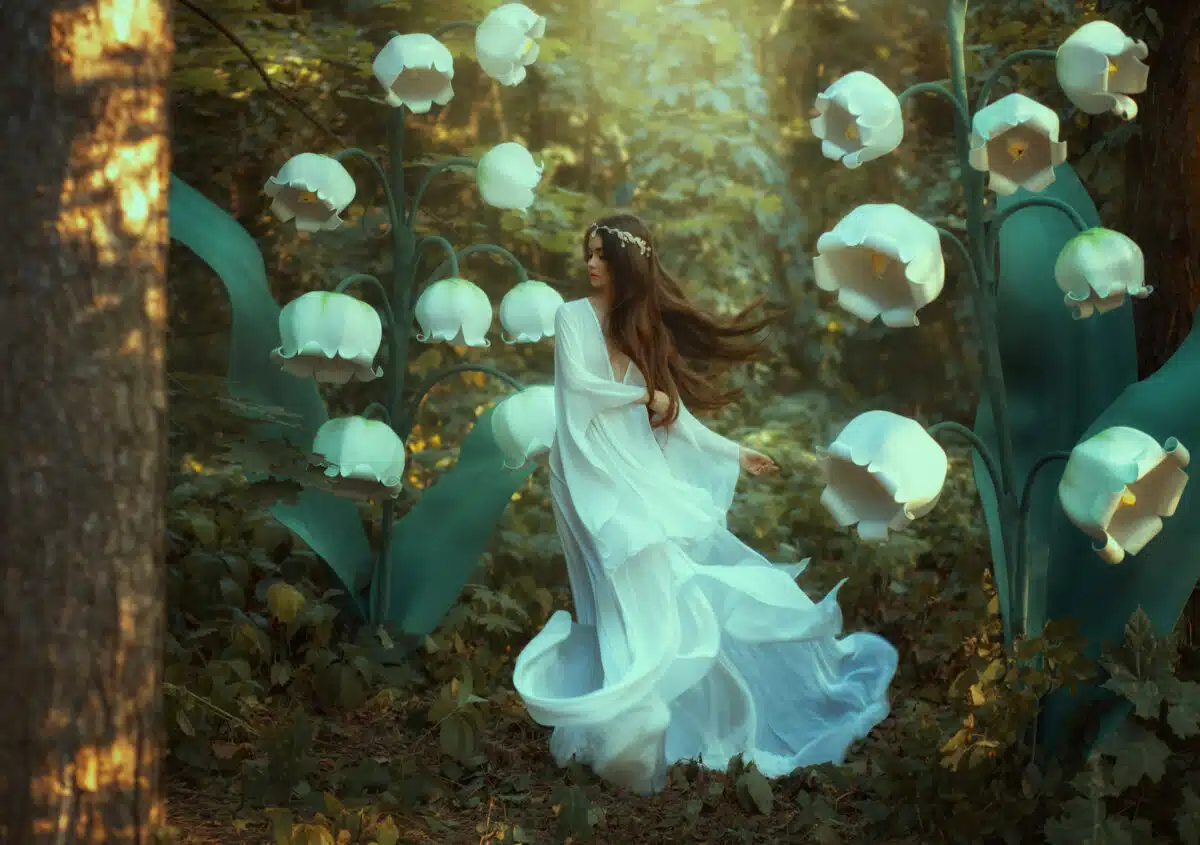
“Little White Lily” by George Macdonald
Little White Lily
Sat by a stone,
Drooping and waiting
Till the sun shone.
Little White Lily
Sunshine has fed;
Little White Lily
Is lifting her head.
Little White Lily
Said: “It is good
Little White Lily’s
Clothing and food.”
Little White Lily
Dressed like a bride!
Shining with whiteness,
And crownèd beside!
Little White Lily
Drooping with pain,
Waiting and waiting
For the wet rain.
Little White Lily
Holdeth her cup;
Rain is fast falling
And filling it up.
Little White Lily
Said: “Good again,
When I am thirsty
To have the nice rain.
Now I am stronger,
Now I am cool;
Heat cannot burn me,
My veins are so full.”
Little White Lily
Smells very sweet;
On her head sunshine,
Rain at her feet.
Thanks to the sunshine,
Thanks to the rain,
Little White Lily
Is happy again.
“Dreamland” by Lewis Carroll
When midnight mists are creeping,
And all the land is sleeping,
Around me tread the mighty dead,
And slowly pass away.
Lo, warriors, saints, and sages,
From out the vanished ages,
With solemn pace and reverend face
Appear and pass away.
The blaze of noonday splendour,
The twilight soft and tender,
May charm the eye: yet they shall die,
Shall die and pass away.
But here, in Dreamland’s centre,
No spoiler’s hand may enter,
These visions fair, this radiance rare,
Shall never pass away.
I see the shadows falling,
The forms of old recalling;
Around me tread the mighty dead,
And slowly pass away.
“The Violet” by Jane Taylor
Down in a green and shady bed
A modest violet grew;
Its stalk was bent, it hung its head,
As if to hide from view.
And yet it was a lovely flower,
Its colors bright and fair;
It might have graced a rosy bower,
Instead of hiding there.
Yet there it was content to bloom,
In modest tints arrayed;
And there diffused a sweet perfume,
Within the silent shade.
Then let me to the valley go,
This pretty flower to see;
That I may also learn to grow
In sweet humility.
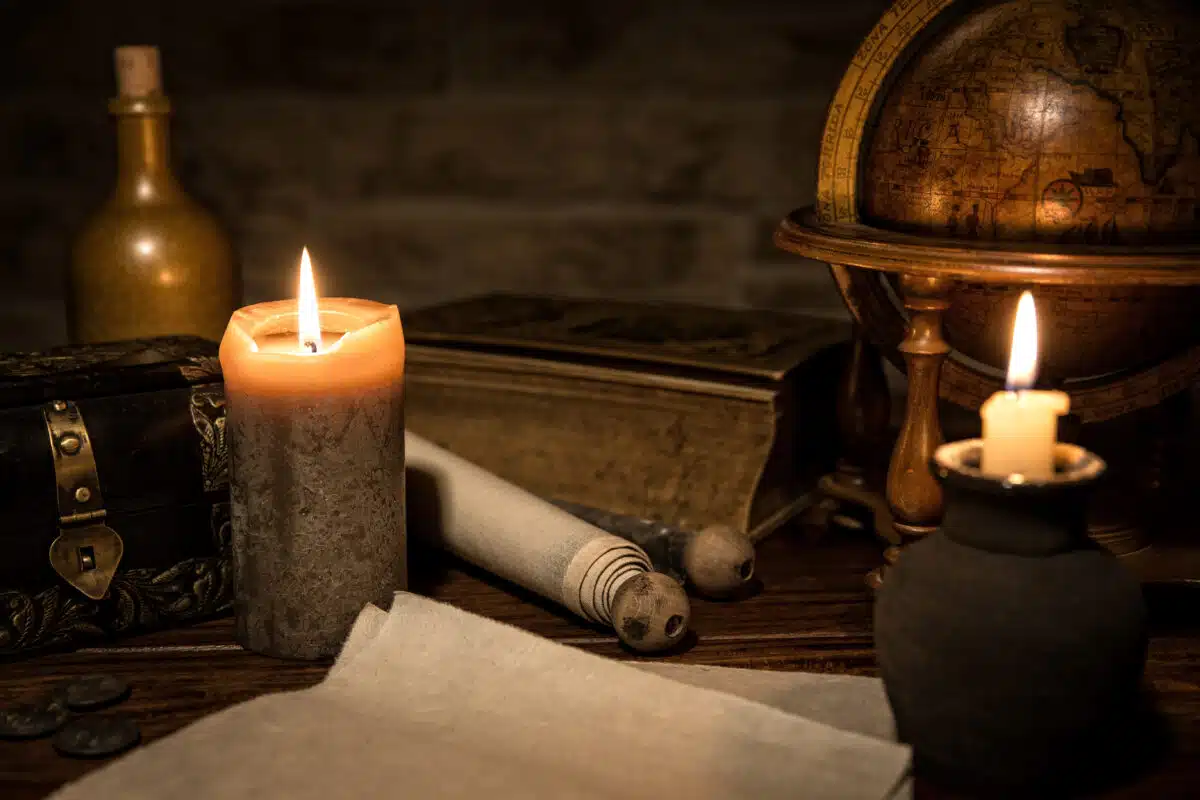
“Letty’s Globe” by Charles Tennyson Turner
When Letty had scarce passed her third glad year,
And her young, artless words began to flow,
One day we gave the child a colored sphere
Of the wide earth, that she might mark and know,
By tint and outline, all its sea and land.
She patted all the world; old empires peeped
Between her baby fingers; her soft hand
Was welcome at all frontiers. How she leaped,
And laughed and prattled in her world-wide bliss;
But when we turned her sweet unlearnèd eye
On our own isle, she raised a joyous cry,
“Oh! yes, I see it, Letty’s home is there!”
And, while she hid all England with a kiss,
Bright over Europe fell her golden hair!
“Poor Susan” by William Wordsworth
Ar the corner of Wood Street, when daylight appears,
There’s a thrush that sings loud—it has sung for three years;
Poor Susan has passed by the spot, and has heard
In the silence of morning the song of the bird.
“Tis a note of enchantment: what ails her ? She sees
A mountain ascending, a vision of trees;
Bright volumes of vapor through Lothbury glide,
And a river flows on through the vale of Cheapside.
Green pastures she views in the midst of the dale,
Down which she so often has tripped with her pail;
And a single small cottage, a nest like a dove’s,
The one only dwelling on earth that she loves.
She looks, and her heart is in heaven; but they fade,
The mist and the river, the hill and the shade:
The stream will not flow, and the hill will not rise,
And the colors have all passed away from her eyes.
“A Nursery Darling” by Lewis Carroll
A Mother’s breast:
Safe refuge from her childish fears,
From childish troubles, childish tears,
Mists that enshroud her dawning years!
see how in sleep she seems to sing
A voiceless psalm, an offering
Raised, to the glory of her King
In Love: for Love is Rest.
A Darling’s kiss:
Dearest of all the signs that fleet
From lips that lovingly repeat
Again, again, the message sweet!
Full to the brim with girlish glee,
A child, a very child is she,
Whose dream of heaven is still to be
At Home: for Home is Bliss.
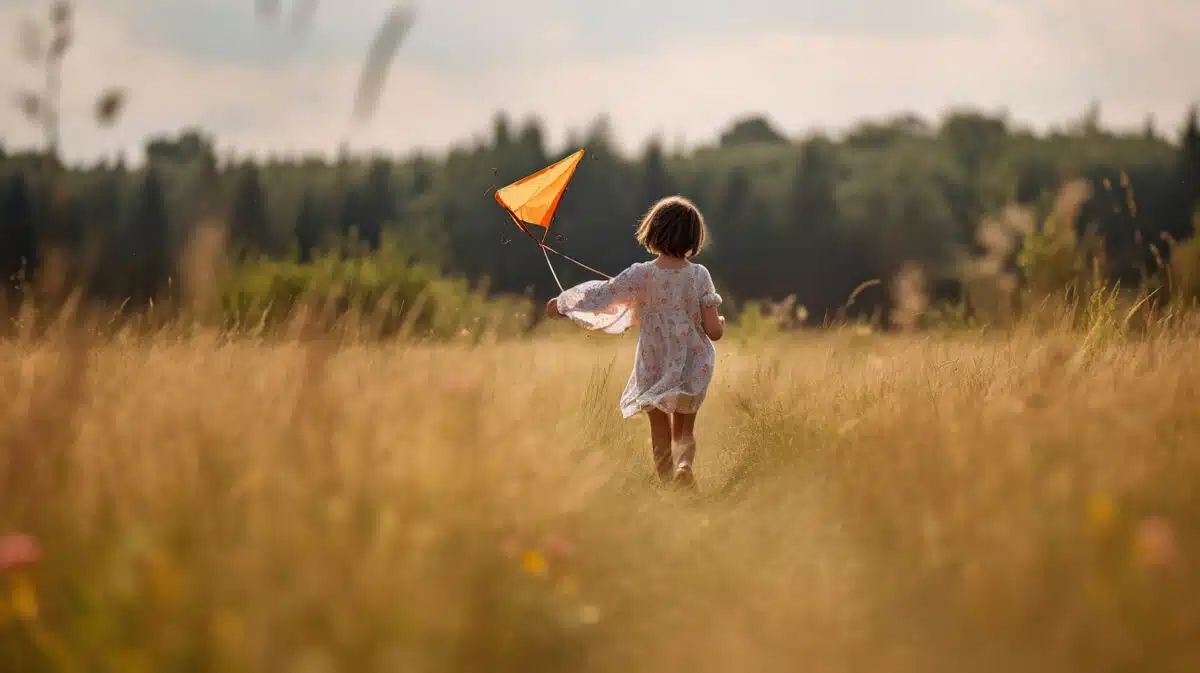
“The Wind” by Robert Louis Stevenson
I saw you toss the kites on high
And blow the birds about the sky;
And all around I heard you pass,
Like ladies’ skirts across the grass—
O wind, a-blowing all day long!
O wind, that sings so loud a song!
I saw the different things you did,
But always you yourself you hid.
I felt you push, I heard you call,
I could not see yourself at all—
O wind, a-blowing all day long,
O wind, that sings so loud a song!
O you that are so strong and cold,
O blower, are you young or old?
Are you a beast of field and tree,
Or just a stronger child than me?
O wind, a-blowing all day long,
O wind, that sings so loud a song!
“The Nightingale And Glowworm” by William Cowper
A nightingale, that all day long
Had cheered the village with his song,
Nor yet at eve his note suspended,
Nor yet when eventide was ended,
Began to feel, as well he might,
The keen demands of appetite;
When, looking eagerly around,
He spied jar off, upon the ground,
A something shining in the dark,
And knew the glow-worm by his spark;
So stooping down from hawthorn top,
He thought to put him in his crop.
The worm, aware of his intent,
Harangued him thus, right eloquent—
“Did you admire my lamp,” quoth he,
“As much as I your minstrelsy,
You would abhor to do me wrong,
As much as I to spoil your song;
For ’twas the self-same Power divine
Taught you to sing and me to shine;
That you with music, I with light,
Might beautify, and cheer the night.”
The songster heard his short oration,
And, warbling out his approbation,
Released him, as my story tells,
And found a supper somewhere else.
Hence jarring sectaries may learn
Their real interest to discern;
That brother should not war with brother,
And worry and devour each other;
But sing and shine by sweet consent,
Till life’s poor transient night is spent,
Respecting, in each other’s case,
The gifts of nature and of grace.
Those Christians best deserve the name
Who studiously make peace their aim;
Peace both the duty and the prize
Of him that creeps and him that flies.
“Barnacles” by Sidney Lanier
My soul is sailing through the sea,
But the Past is heavy and hindereth me.
The Past hath crusted cumbrous shells
That hold the flesh of cold sea-mells
About my soul.
The huge waves wash, the high waves roll,
Each barnacle clingeth and worketh dole
And hindereth me from sailing!
Old Past let go, and drop i’ the sea
Till fathomless waters cover thee!
For I am living but thou art dead;
Thou drawest back, I strive ahead
The Day to find.
Thy shells unbind! Night comes behind,
I needs must hurry with the wind
And trim me best for sailing.
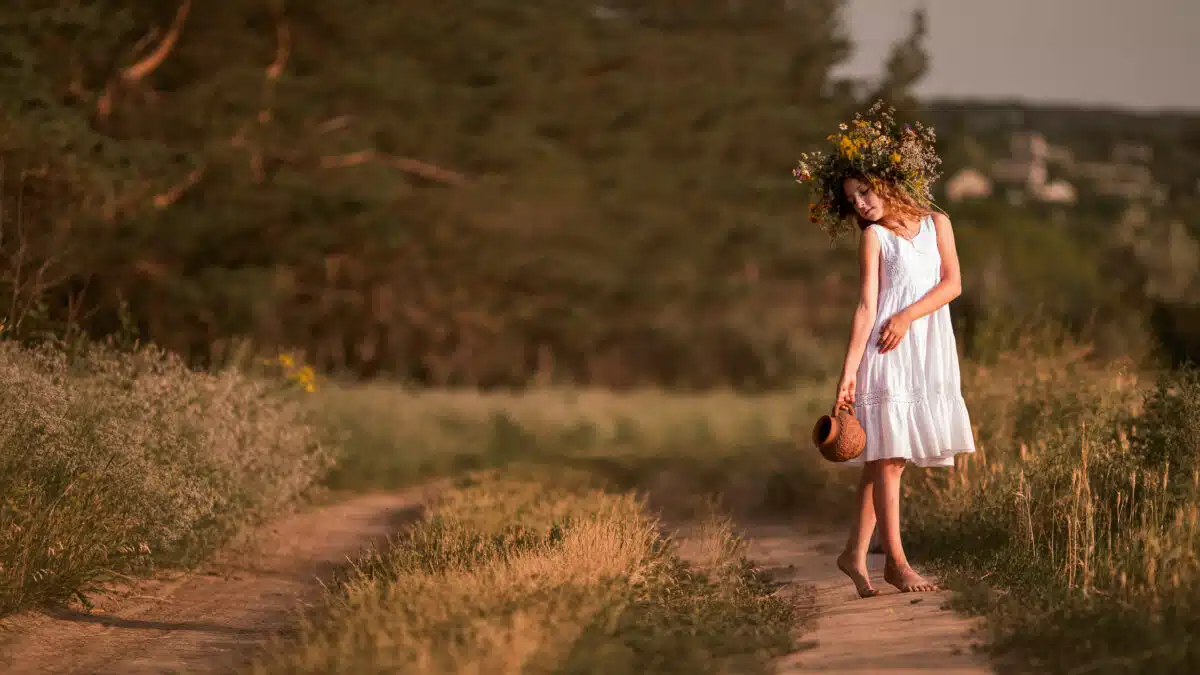
“Out in the Fields” by Elizabeth Barrett Browning
The little cares that fretted me,
I lost them yesterday
Among the fields above the seas,
Among the winds at play;
Among the lowing of the herds,
The rustling of the trees,
Among the singing of the birds,
The humming of the bees.
The foolish fears of what might happen,—
I cast them all away
Among the clover-scented grass,
Among the new-mown hay;
Among the husking of the corn,
Where drowsy poppies nod,
Where ill thoughts die and good are born,
Out in the fields with God.
“Stevenson’s Birthday” by Katherine Miller
“How I should like a birthday!” said the child,
”I have so few, and they so far apart.”
She spoke to Stevenson—the Master smiled—
”Mine is to-day; I would with all my heart
That it were yours; too many years have I!
Too swift they come, and all too swiftly fly.”
So by a formal deed he there conveyed
All right and title in his natal day,
To have and hold, to sell or give away,—
Then signed, and gave it to the little maid.
Joyful, yet fearing to believe too much,
She took the deed, but scarcely dared unfold.
Ah, liberal Genius! at whose potent touch
All common things shine with transmuted gold!
A day of Stevenson’s will prove to be
Not part of Time, but Immortality.
“Cupid Drowned” by Leigh Hunt
T’other day as I was twining
Roses, for a crown to dine in,
What, of all things, ‘mid the heap,
Should I light on, fast asleep,
But the little desperate elf,
The tiny traitor, Love, himself!
By the wings I picked him up
Like a bee, and in a cup
Of my wine I plunged and sank him,
Then what d’ye think I did?—I drank him.
Faith, I thought him dead. Not he!
There he lives with tenfold glee;
And now this moment with his wings
I feel him tickling my heart-strings.
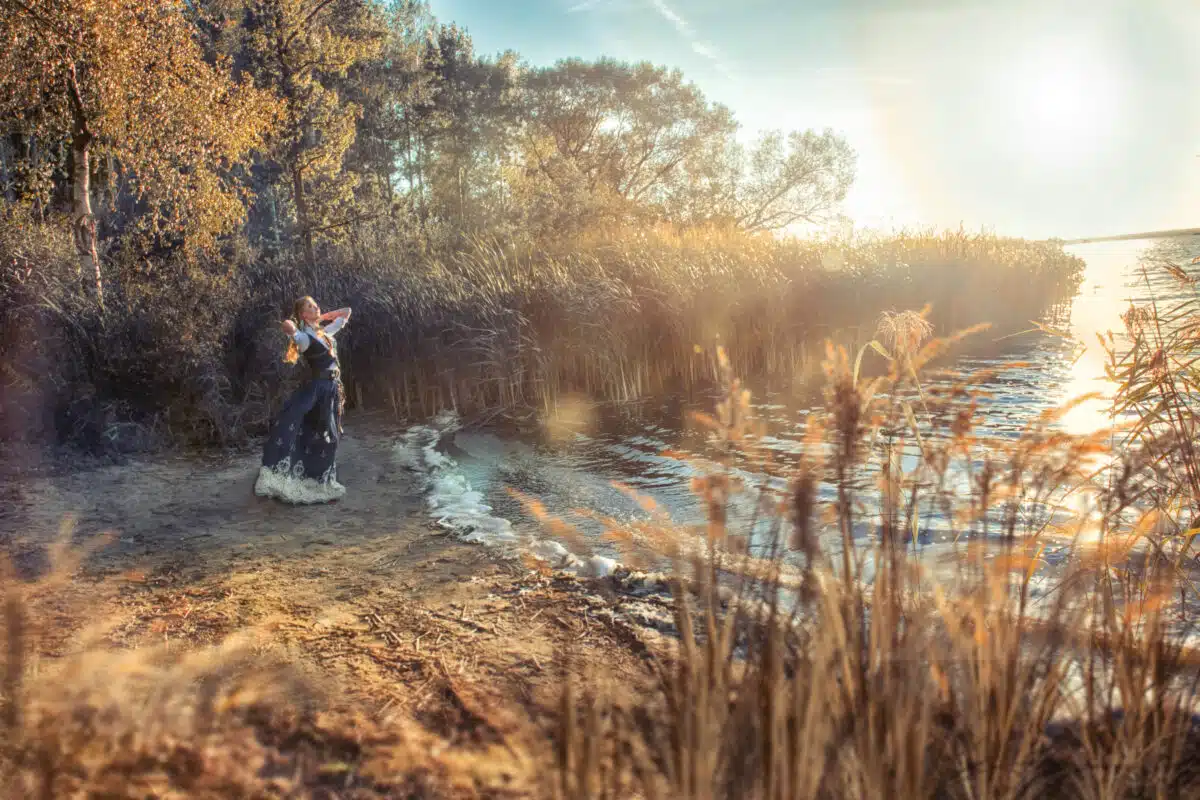
“The Echoing Green” by William Blake
The sun does arise,
And make happy the skies;
The merry bells ring
To welcome the Spring;
The skylark and thrush,
The birds of the bush,
Sing louder around
To the bells’ cheerful sound;
While our sports shall be seen
On the echoing Green.
Old John, with white hair,
Does laugh away care,
Sitting under the oak,
Among the old folk.
They laugh at our play,
And soon they all say,
“Such, such were the joys
When we all—girls and boys—
In our youth-time were seen
On the echoing Green.”
Till the little ones, weary,
No more can be merry:
The sun does descend,
And our sports have an end.
Round the laps of their mothers
Many sisters and brothers,
Like birds in their nest,
Are ready for rest,
And sport no more seen
On the darkening green.
“A Boy’s Song” by James Hogg
Where the pools are bright and deep,
Where the gray trout lies asleep,
Up the river and o’er the lea,
That’s the way for Billy and me.
Where the blackbird sings the latest,
Where the hawthorn blooms the sweetest,
Where the nestlings chirp and flee,
That’s the way for Billy and me.
Where the mowers mow the cleanest,
Where the hay lies thick and greenest,
There to trace the homeward bee,
That’s the way for Billy and me.
Where the hazel bank is steepest,
Where the shadow falls the deepest,
Where the clustering nuts fall free.
That’s the way for Billy and me.
Why the boys should drive away,
Little sweet maidens from the play,
Or love to banter and fight so well,
That’s the thing I never could tell.
But this I know, I love to play,
Through the meadow, among the hay;
Up the water and o’er the lea,
That’s the way for Billy and me.
“The Caterpillar” by Robert Graves
Under this loop of honeysuckle,
A creeping, coloured caterpillar,
I gnaw the fresh green hawthorn spray,
I nibble it leaf by leaf away.
Down beneath grow dandelions,
Daisies, old-man’s-looking-glasses;
Rooks flap croaking across the lane.
I eat and swallow and eat again.
Here come raindrops helter-skelter;
I munch and nibble unregarding:
Hawthorn leaves are juicy and firm.
I’ll mind my business: I’m a good worm.
When I’m old, tired, melancholy,
I’ll build a leaf-green mausoleum
Close by, here on this lovely spray,
And die and dream the ages away.
Some say worms win resurrection,
With white wings beating flitter-flutter,
But wings or a sound sleep, why should I care?
Either way I’ll miss my share.
Under this loop of honeysuckle,
A hungry, hairy caterpillar,
I crawl on my high and swinging seat,
And eat, eat, eat—as one ought to eat.
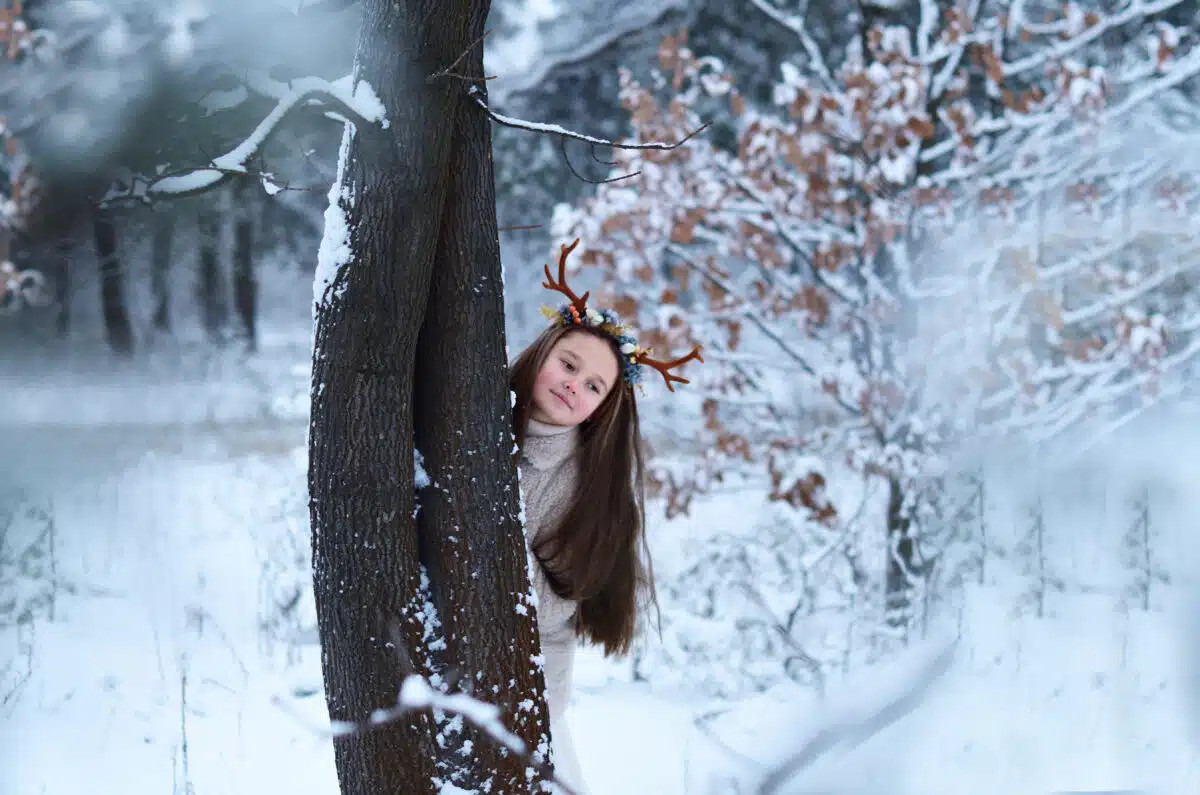
“The Snowflake Tree” by Mary E. Wilkins Freeman
The hawthorn is dead, the rose-leaves have fled
On the north wind over the sea:
Now the petals will fall that are rarest of all,
Sweetheart, from the Snowflake Tree.
The Tree, it doth stand in that marvellous land
Whose shore like a sapphire gleams,
Where a crown hangs high in the northern sky,
Forth raying its golden beams.
It tosses its boughs with their crystalling blows;
They crackle and tinkle for glee
When the north wind shrieks round the awful peaks,
On the shores of the polar sea.
And never a bird its blossoms has stirred,
Or built on its branches a nest;
For the perfume which floats from the blossoms’ throats
Would freeze the song in its breast.
And my own little bird, were her goldilocks stirred
By the wind thro’ its branches which blows,
With her songs silenced all, forever would fall
Asleep on the silver snows.
But our hearth burns bright, little sweetheart, to-night,
And we’re far from the Snowflake Tree;
Thou canst nestle in bed thy little gold head,
And thy songs shall awaken with thee.
“Foreign Lands” by Robert Louis Stevenson
Up into the cherry tree
Who should climb but little me?
I held the trunk with both my hands
And looked abroad on foreign lands.
I saw the next door garden lie,
Adorned with flowers, before my eye,
And many pleasant places more
That I had never seen before.
I saw the dimpling river pass
And be the sky’s blue looking-glass;
The dusty roads go up and down
With people tramping in to town.
If I could find a higher tree
Farther and farther I should see,
To where the grown-up river slips
Into the sea among the ships,
To where the roads on either hand
Lead onward into fairy land,
Where all the children dine at five,
And all the playthings come alive.
“The Sandpiper” by Celia Thaxter
Across the lonely beach we flit,
One little sandpiper and I,
And fast I gather, bit by bit,
The scattered driftwood, bleached and dry.
The wild waves reach their hands for it,
The wild wind raves, the tide runs high,
As up and down the beach we flit,
One little sandpiper and I.
Above our heads the sullen clouds
Scud, black and swift, across the sky;
Like silent ghosts in misty shrouds
Stand out the white lighthouses high.
Almost as far as eye can reach
I see the close-reefed vessels fly,
As fast we flit along the beach,
One little sandpiper and I.
I watch him as he skims along,
Uttering his sweet and mournful cry;
He starts not at my fitful song,
Nor flash of fluttering drapery.
He has no thought of any wrong,
He scans me with a fearless eye;
Stanch friends are we, well tried and strong,
The little sandpiper and I.
Comrade, where wilt thou be to-night,
When the loosed storm breaks furiously?
My driftwood fire will burn so bright!
To what warm shelter canst thou fly?
I do not fear for thee, though wroth
The tempest rushes through the sky;
For are we not God’s children both,
Thou, little sandpiper, and I?
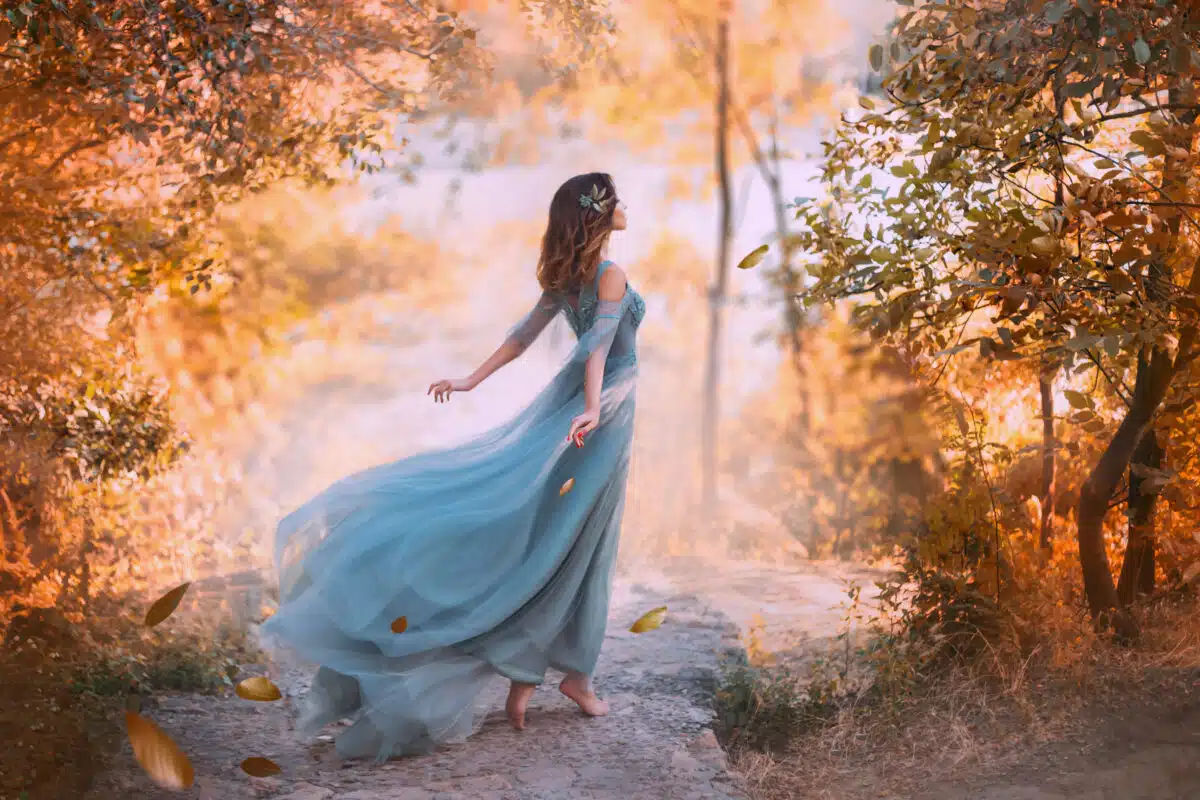
“How the Leaves Came Down” by Susan Coolidge
“I’ll tell you how the leaves came down,”
The great Tree to his children said:
“You’re getting sleepy, Yellow and Brown,
Yes, very sleepy, little Red.
It is quite time to go to bed.”
“Ah!” begged each silly, pouting leaf,
“Let us a little longer stay;
Dear Father Tree, behold our grief!
‘Tis such a very pleasant day,
We do not want to go away.”
So, for just one more merry day
To the great Tree the leaflets clung,
Frolicked and danced, and had their way,
Upon the autumn breezes swung,
Whispering all their sports among—
“Perhaps the great Tree will forget,
And let us stay until the spring,
If we all beg, and coax, and fret.”
But the great Tree did no such thing;
He smiled to hear their whispering.
“Come, children, all to bed,” he cried;
And ere the leaves could urge their prayer,
He shook his head, and far and wide,
Fluttering and rustling everywhere,
Down sped the leaflets through the air.
I saw them; on the ground they lay,
Golden and red, a huddled swarm,
Waiting till one from far away,
White bedclothes heaped upon her arm,
Should come to wrap them safe and warm.
The great bare Tree looked down and smiled.
“Good-night, dear little leaves,” he said.
And from below each sleepy child
Replied, “Good-night,” and murmured,
“It is so nice to go to bed!”
“The Boy Who Never Told a Lie” by Anonymous
Once there was a little boy,
With curly hair and pleasant eye—
A boy who always told the truth,
And never, never told a lie.
And when he trotted off to school,
The children all about would cry,
“There goes the curly-headed boy—
The boy that never tells a lie.”
And everybody loved him so,
Because he always told the truth,
That every day, as he grew up,
‘Twas said, “There goes the honest youth.”
And when the people that stood near
Would turn to ask the reason why,
The answer would be always this:
“Because he never tells a lie.”
“My Bed Is a Boat” by Robert Louis Stevenson
My bed is like a little boat
Nurse helps me in when I embark ; .
She girds me in my sailor’s coat
And starts me in the dark.
At night, I go on board and say
Good night to all my friends on shore;
I shut my eyes and sail away
And see and hear no more.
And sometimes things to bed I take,
As prudent sailors have to do;
Perhaps a slice of wedding-cake,
Perhaps a toy or two.
All night across the dark we steer ;
But when the day returns at last,
Safe in my room , beside the pier,
I find my vessel fast.
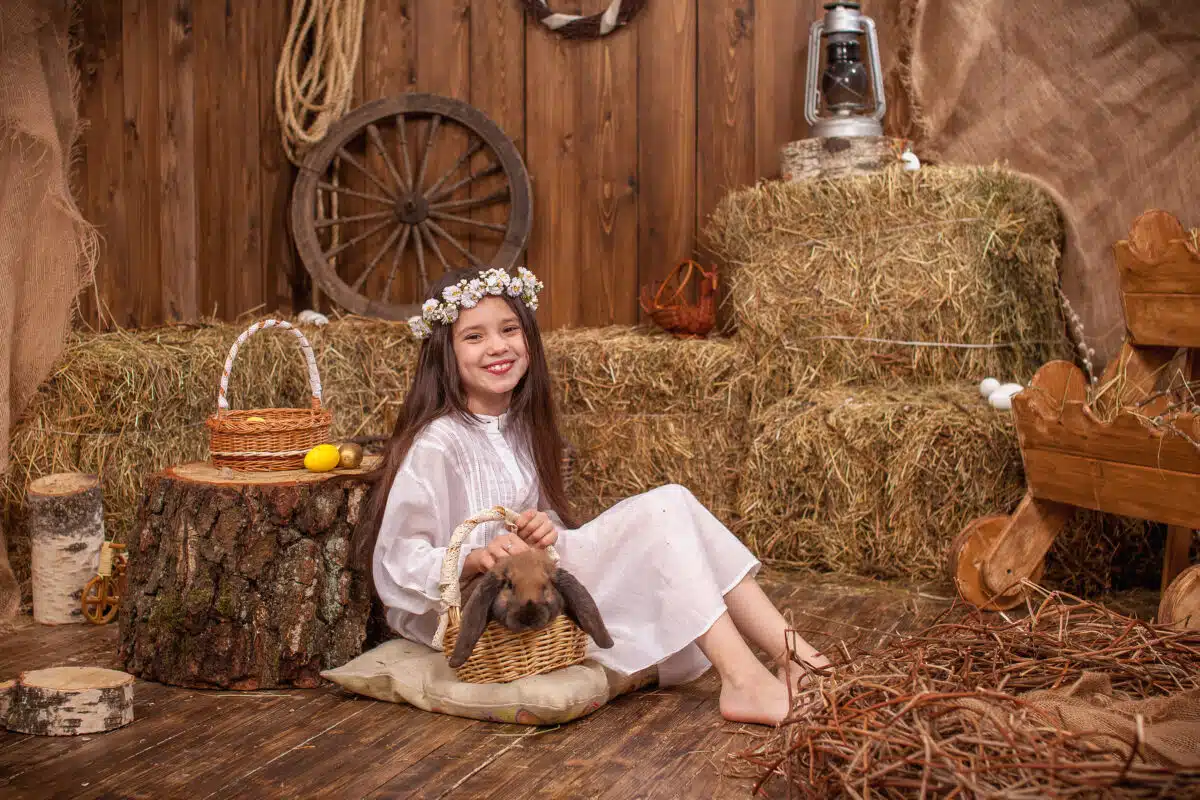
“Kindness to Animals” by Anonymous
Little children never give
Pain to things that feel and live:
Let the gentle robin come
For the crumbs you save at home,
As his meat you throw along
He’ll repay you with a song;
Never hurt the timid hare
Peeping from her green grass lair.
Let her come and sport and play
On the lawn at close of day;
The little lark goes soaring high
To the bright windows of the sky,
Singing as if ‘ twere always spring,
And fluttering on an untired wing, –
Oh ! let him sing his happy song,
Nor do these gentle creatures wrong.
“Good and Bad Children” by Robert Louis Stevenson
Children, you are very little,
And your bones are very brittle
If you would grow great and stately,
You must try to walk sedately.
You must still be bright and quiet,
And content with simple diet;
And remain, through all bewild’ring,
Innocent and honest children.
Happy hearts and happy faces,
Happy play in grassy places
That was how, in ancient ages,
Children grew to kings and sages.
But the unkind and the unruly,
And the sort who eat unduly,
They must never hope for glory—
Theirs is quite a different story!
Cruel children, crying babies,
All grow up as geese and gabies,
Hated, as their age increases,
By their nephews and their nieces.
“Try Again” by William Edward Hickson
‘Tis a lesson you should heed,
Try again ;
If at first you don’t succeed,
Try again ;
Then your courage should appear,
For if you will persevere ,
You will conquer, never fear,
Try again.
Once or twice, though you should fail,
Try again ;
If you would at last prevail,
Try again ;
If we strive, ‘ tis no disgrace
Though we do not win the race ;
What should we do in that case ?
Try again.
If you find your task is hard,
Try again ;
Time will bring you your reward,
Try again ;
All that other folk can do,
Why, with patience, may not you ?
Only keep this rule in view ,
Try again.
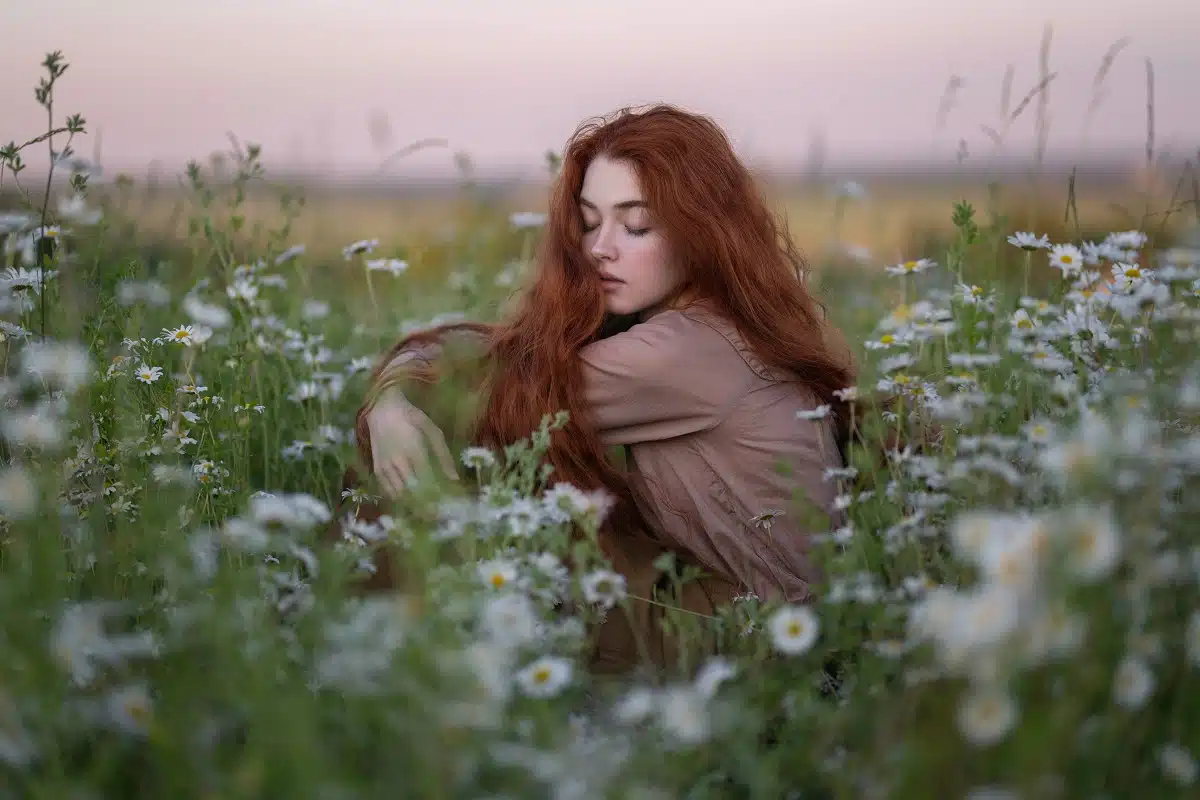
“Daisies” by Frank Dempster Sherman
At evening when I go to bed
I see the stars shine overhead;
They are the little daisies white
That dot the meadow of the Night
And often while I’m dreaming so,
Across the sky the Moon will;
It is a lady, sweet and fair,
Who comes to gather daisies there.
For when at morning I arise,
There’s not a star left in the skies;
She’s picked them all and dropped them down
Into the meadows of the town.
“Those Evening Bells” by Thomas Moore
Those evening bells! those evening bells!
How many a tale their music tells,
Of youth , and home, and that sweet time
When last I heard their soothing chime!
Those joyous hours are passed away;
And many a heart that then was gay,
Within the tomb now darkly dwells,
And hears no more those evening bells.
And so ’twill be when I am gone
That tuneful peal will still ring on;
While other bards shall walk these dells,
And sing your praise, sweet evening bells.
“The Swing” by Robert Louis Stevenson
How do you like to go up in a swing,
Up in the air so blue?
Oh, I do think it the pleasantest thing
Ever a child can do!
Up in the air and over the wall,
Till I can see so wide,
Rivers and trees and cattle and all
Over the countryside—
Till I look down on the garden green ,
Down on the roof so brown—
Up in the air I go flying again,
Up in the air and down!

“Sweet And Low” by Alfred Lord Tennyson
Sweet and low, sweet and low,
Wind of the western sea,
Low, low, breathe and blow,
Wind of the western sea!
Over the rolling waters go,
Come from the dying moon, and blow,
Blow him again to me;
While my little one, while my pretty one, sleeps.
Sleep and rest, sleep and rest,
Father will come to thee soon;
Rest, rest, on mother’s breast,
Father will come to thee soon;
Father will come to his babe in the best,
Silver sails all out of the west,
Under the silver moon:
Sleep, my little one, sleep, my pretty one, sleep.
“Cupid Stung” by Thomas Moore
Cupid once upon a bed
Of roses laid his weary head;
Luckless urchin, not to see
Within the leaves a slumbering bee.
The bee awak’d—with anger wild
The bee awak’d, and stung the child.
Loud and piteous are his cries;
To Venus quick he runs, he flies;
“Oh, Mother! I am wounded through—
I die with pain—in sooth I do!
Stung by some little angry thing,
Some serpent on a tiny wing—
A bee it was—for once, I know,
I heard a rustic call it so.”
Thus he spoke, and she the while
Heard him with a soothing smile;
Then said, “My infant, if so much
Thou feel the little wild bee’s touch,
How must the heart, ah, Cupid! be,
The hapless heart that’s stung by thee!”
“Cupid and My Campasbe” by John Lyly
Cupid and my Campasbe played
At cards for kisses. Cupid paid.
He stakes his quiver, bow and arrows,
His mother’s doves and team of sparrows.
Loses them, too; then down he throws
The coral of his lips, the rose
Growing on his cheek, but none knows how;
With them the crystal of his brow,
And then the dimple of his chin.
All these did my Campasbe win.
At last he set her both his eyes;
She won and Cupid blind did rise.
Oh, Love, hath she done this to thee!
What shall, alas, become of me!
Short Easy Poems & Rhymes
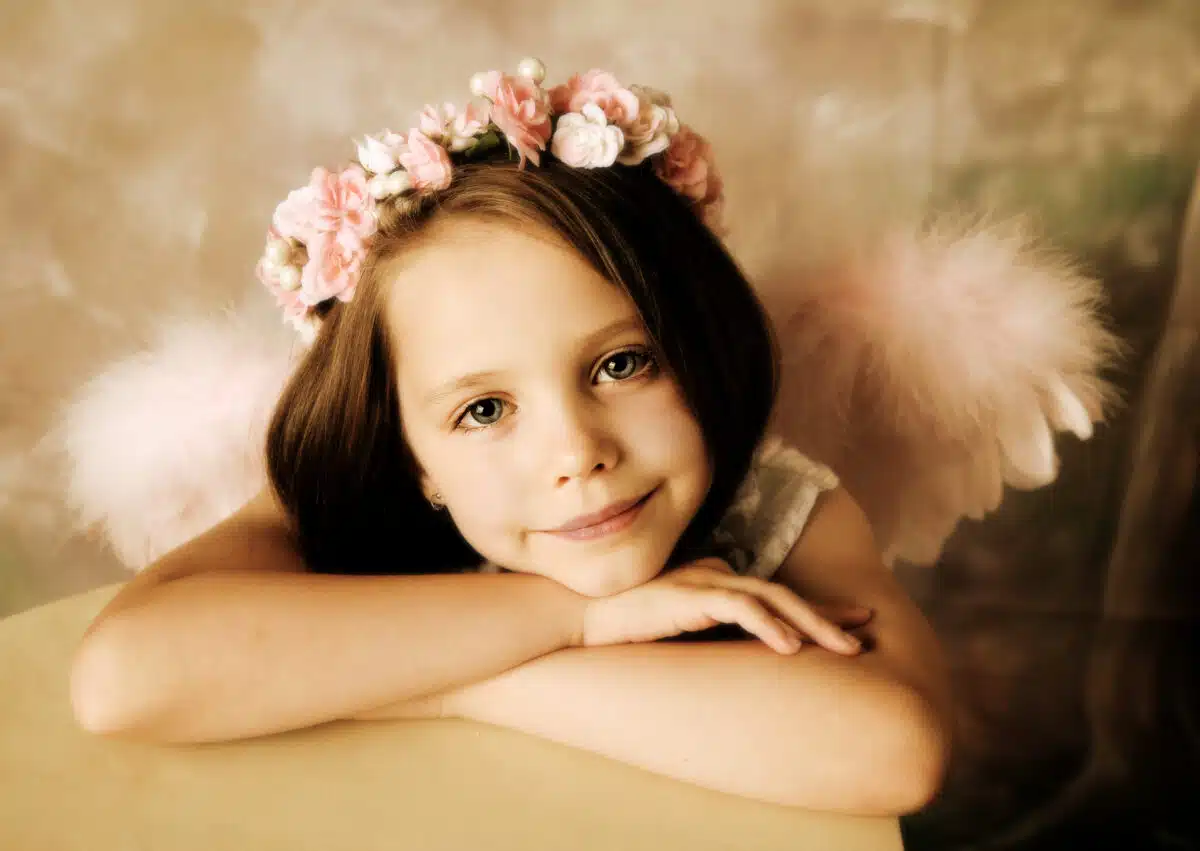
“Little Bo-Peep” by Mother Goose
Little Bo-peep has lost her sheep,
And can’t tell where to find them;
Leave them alone, and they’ll come home,
And bring their tails behind them.
“Lullaby” by Christina G. Rossetti
Lullaby, oh, lullaby!
Flowers are closed and lambs are sleeping;
Lullaby, oh, lullaby!
Stars are up, the moon is peeping;
Lullaby, oh, lullaby!
While the birds are silence keeping,
Lullaby, oh, lullaby!
Sleep, my baby, fall a-sleeping,
Lullaby, oh, lullaby!
“Jack, Be Nimble” by Mother Goose
Jack, be nimble; Jack, be quick;
Jack, jump over the candlestick.
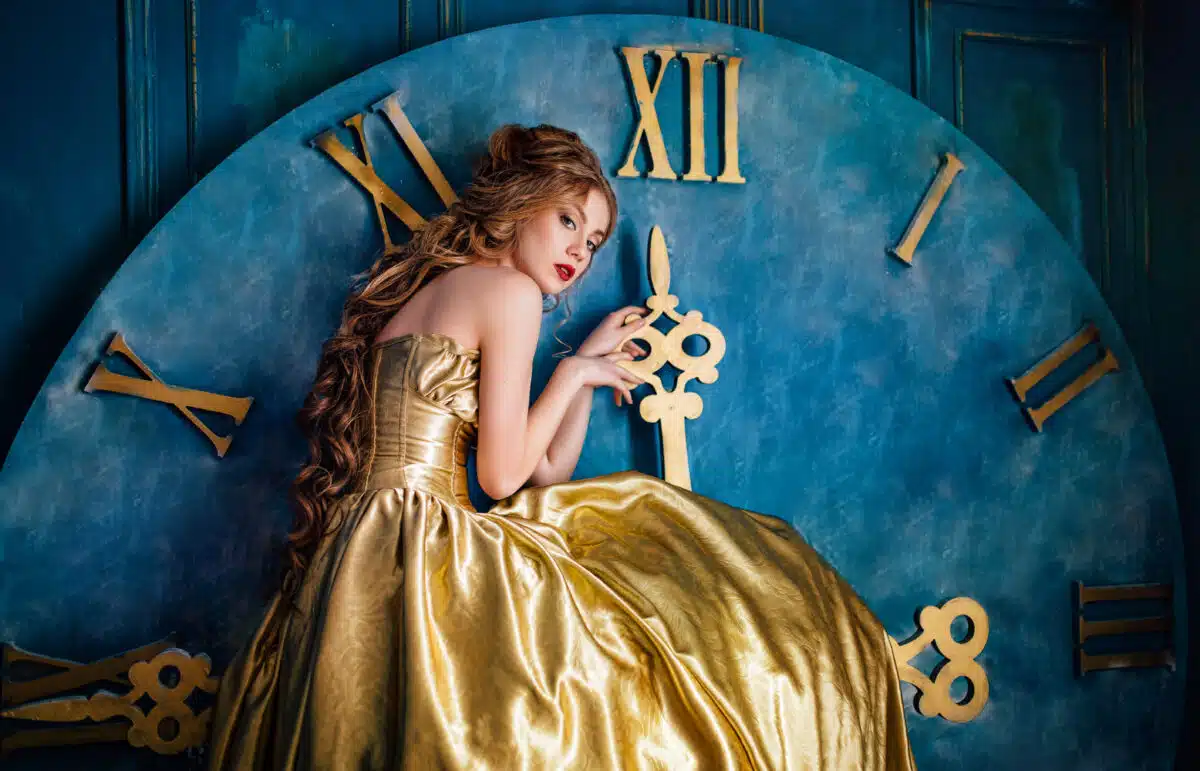
“Dickery, Dickery, Dock” by Mother Goose
Dickery, dickery, dock,
The mouse ran up the clock;
The clock struck one,
The mouse ran down,
Dickery, dickery, dock.
“A House of Cards” by Christina G. Rossetti
A house of cards
Is neat and small:
Shake the table,
It must fall.
Find the face cards
One by one;
Raise it, roof it —
Now it ‘s done : —
Shake the table!
That’s the fun.
“Hush-a-bye, Baby” by Mother Goose
Hush-a-bye, Baby, upon the tree top,
When the wind blows the cradle will rock;
When the bough breaks the cradle will fall,
Down tumbles cradle and Baby and all.
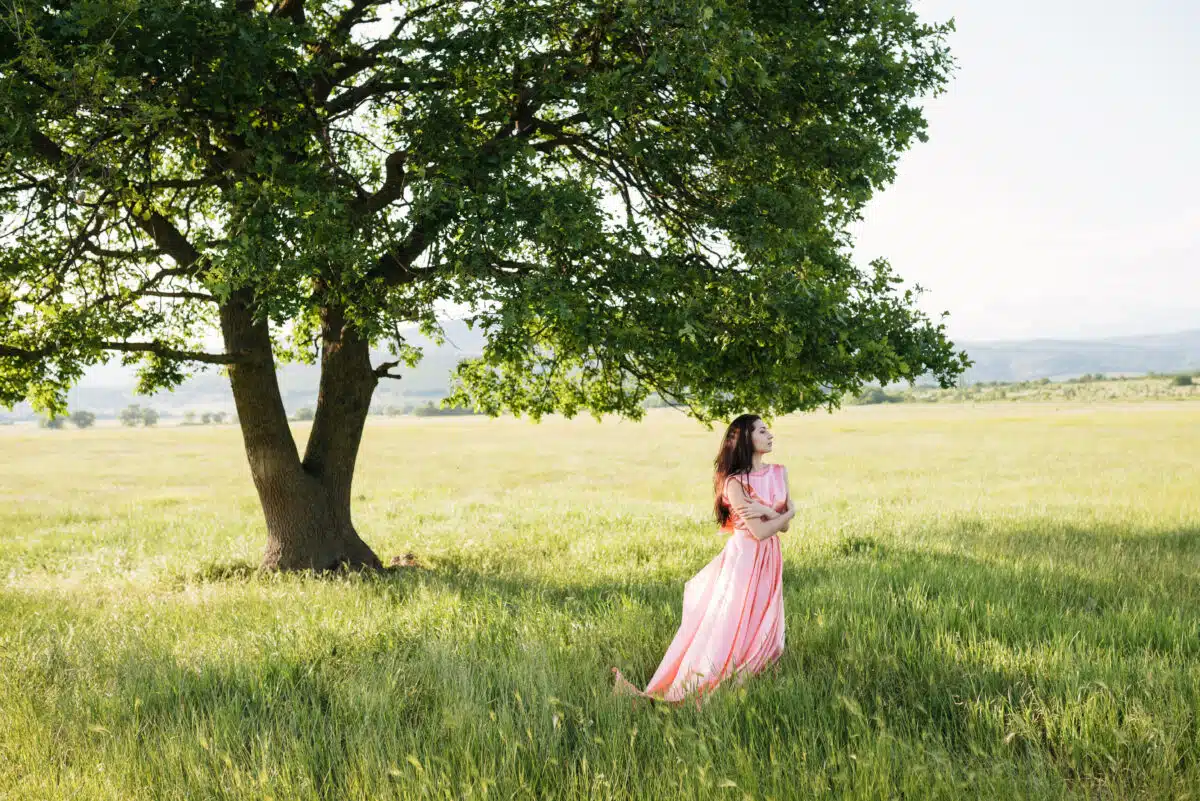
“An Oak” by Christina G. Rossetti
A toadstool comes up in a night —
Learn the lesson, little folk: —
An oak grows on a hundred years,
And then it is an oak.
“Sing Me A Song” by Christina G. Rossetti
Sing me a song. —
What shall I sing? —
Three merry sisters
Dancing in a ring,
Light and fleet upon their feet
As birds upon the wing.
“The Little Robin” by Mother Goose
The little robin grieves
When the snow is on the ground,
For the trees have no leaves,
And no berries can be found.
The air is cold, the worms are hid;
For robin here what can be done?
Let’s strow around some crumbs of bread,
And then he’ll live till snow is gone.
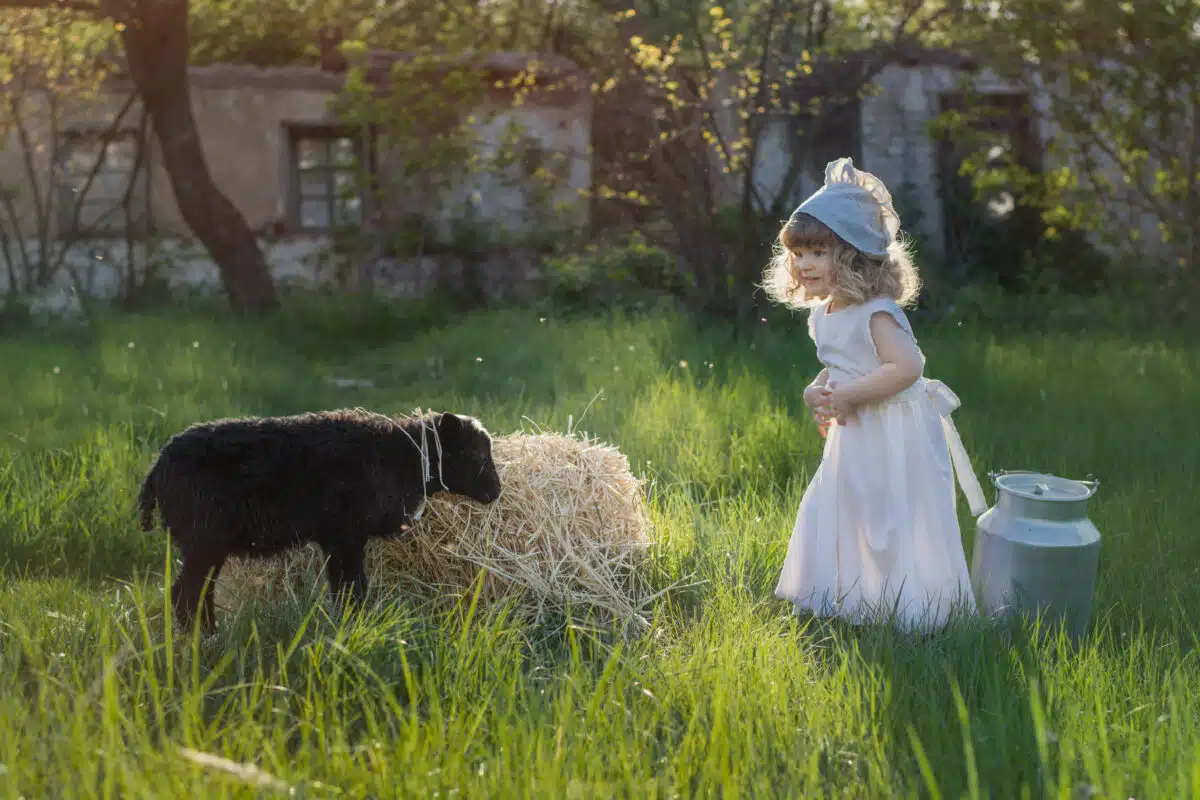
“Bah, Bah, Black Sheep” by Mother Goose
Bah, bah, black sheep,
Have you any wool?
Yes, marry, have I,
Three bags full;
One for my master,
One for my dame,
But none for the little boy
Who cries in the lane.
“Hickety, Pickety, My Black Hen” by Mother Goose
Hickety, pickety, my black hen,
She lays eggs for gentlemen:
Gentlemen come every day
To see what my black hen doth lay.
“Wee Willie Winkie” by Mother Goose
Wee Willie Winkie runs through the town,
Upstairs and downstairs, in his nightgown;
Tapping at the window, crying at the lock:
“Are the babes in their beds, for it’s now ten o’clock?”
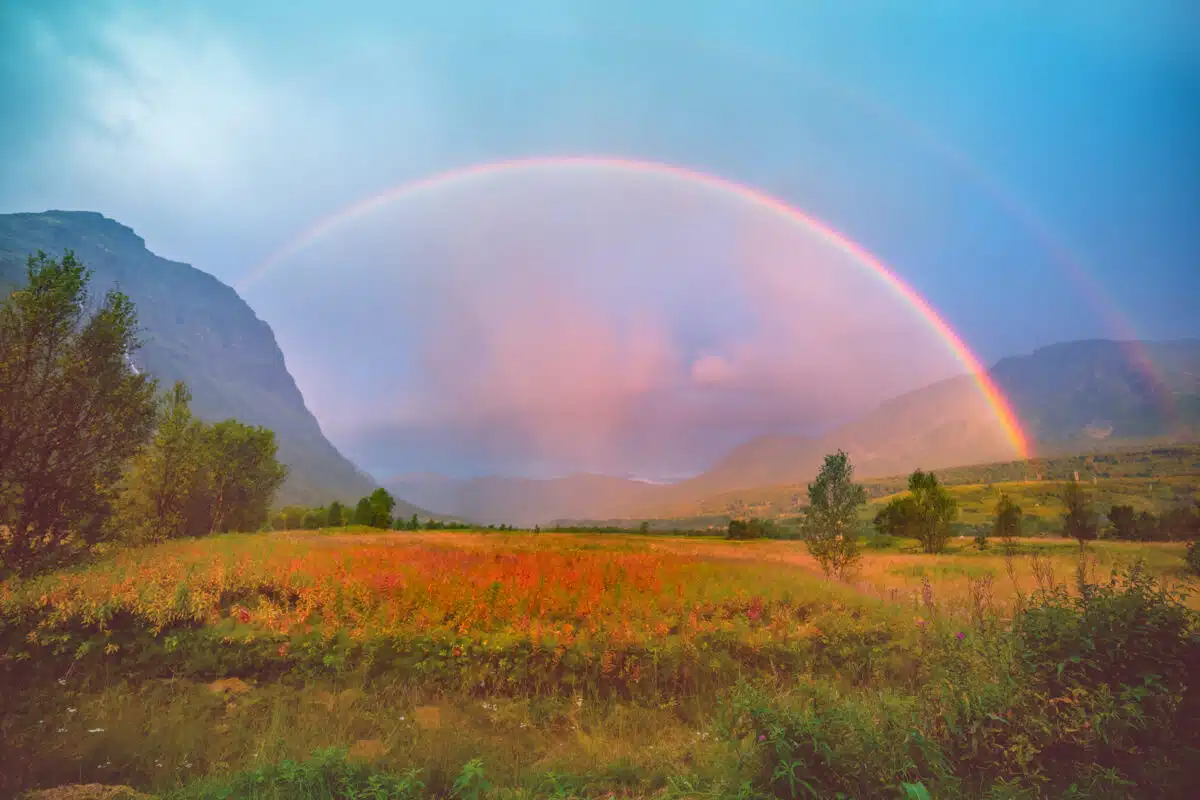
“The Rainbow” by Christina G. Rossetti
If all were rain and never sun,
No bow could span the hill;
If all were sun and never rain,
There ‘d be no rainbow still.
“A Pocket Handkerchief” by Christina G. Rossetti
A pocket handkerchief to hem —
Oh dear, oh dear, oh dear!
How many stitches it will take
Before it’s done, I fear.
Yet set a stitch and then a stitch,
And stitch and stitch away,
Till stitch by stitch the hem is done,
And after work is play.
“The Swallow and the Snail” by Christina G. Rossetti
Swift and sure the swallow,
Slow and sure the snail:
Slow and sure may miss his way,
Swift and sure may fail.
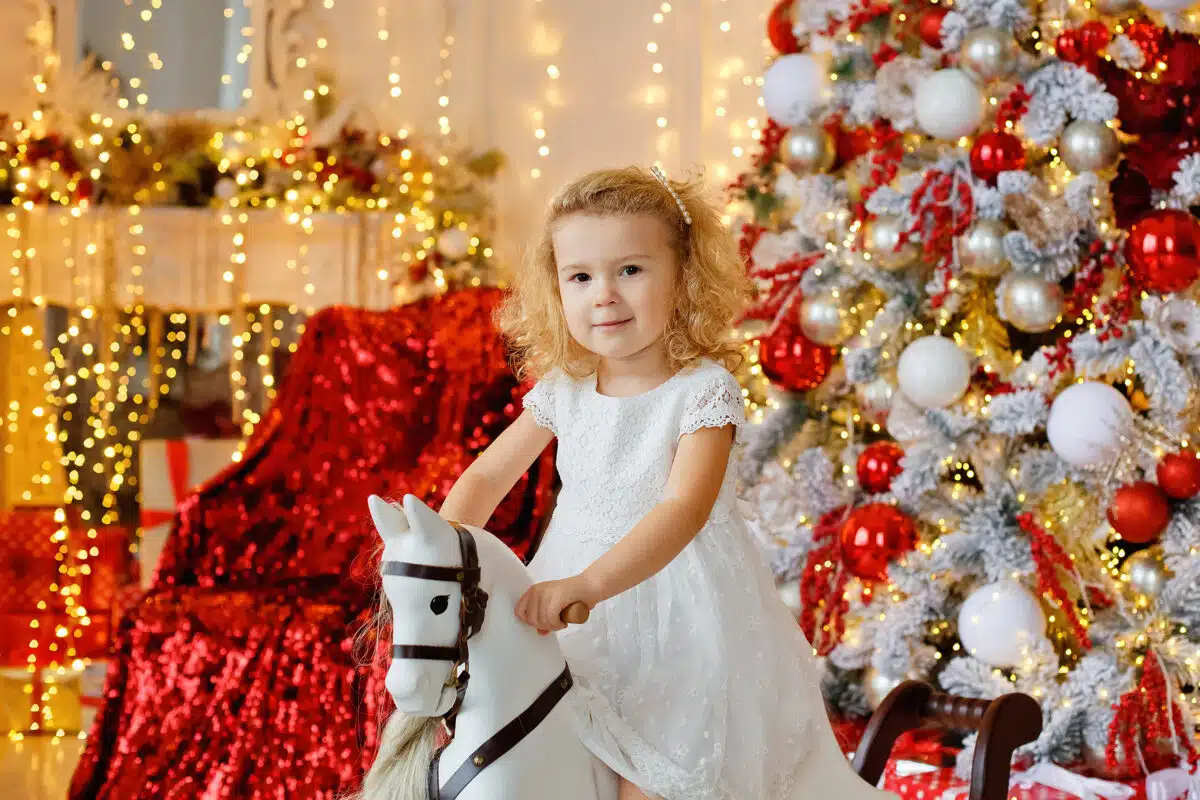
“Ride a Cock Horse” by Mother Goose
Ride a cock horse
To Banbury Cross
To see what Tommy can buy:
A penny white loaf,
A penny white cake,
And a two-penny apple pie.
“There Was An Old Woman” by Mother Goose
There was an old woman who lived in a shoe,
She had so many children she didn’t know what to do.
She gave them some broth without any bread,
She whipped them all soundly and put them to bed.
“The Moon” by Christina G. Rossetti
Is the moon tired? she looks so pale
Within her misty veil:
She scales the sky from east to west,
And takes no rest.
Before the coming of the night
The moon shows papery white;
Before the dawning of the day
She fades away.
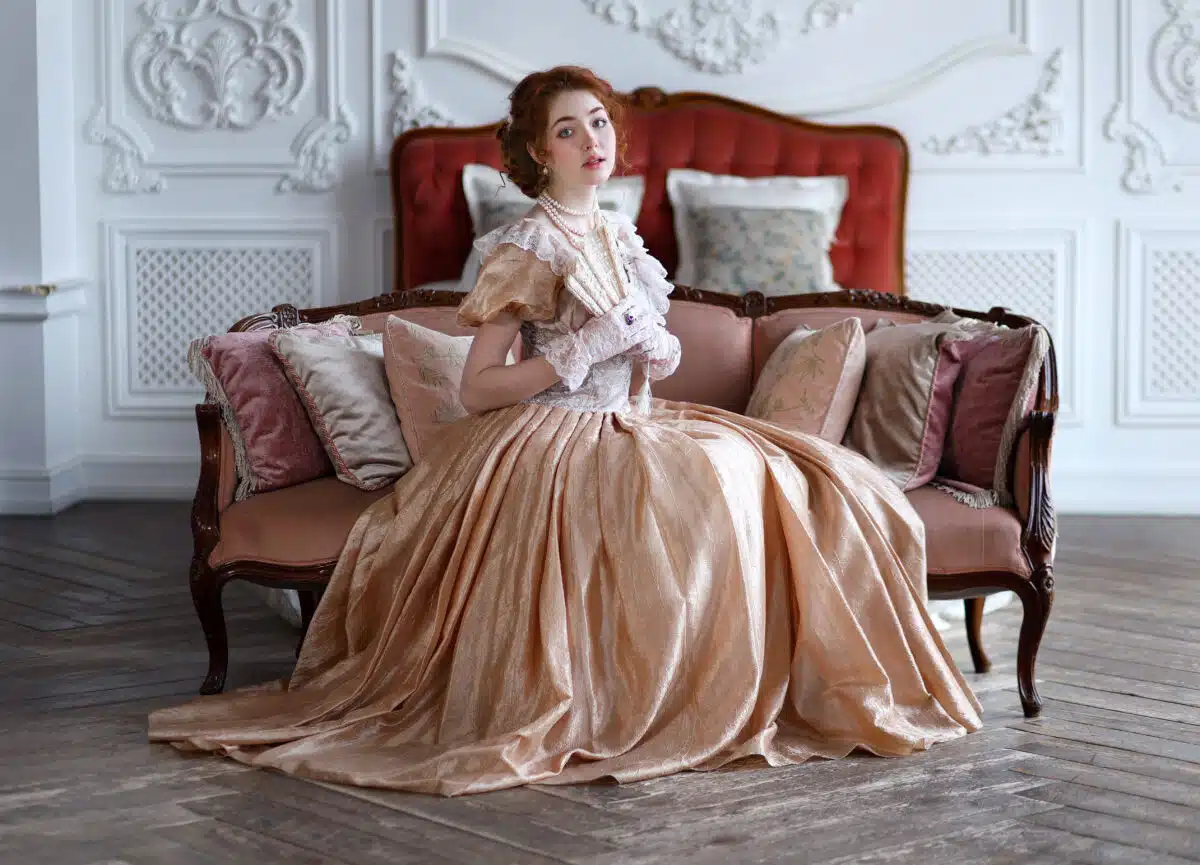
“Little Miss Muffet” by Mother Goose
Little Miss Muffet
Sat on a tuffet,
Eating some curds and whey;
There came a great spider,
And sat down beside her,
And frightened Miss Muffet away.
“Bye, Baby Bunting” by Mother Goose
Bye, Baby bunting,
Father’s gone a-hunting,
Mother’s gone a-milking,
Sister’s gone a-silking,
And Brother’s gone to buy a skin
To wrap the Baby bunting in.
“Little Polly Flinders” by Mother Goose
Little Polly Flinders
Sat among the cinders
Warming her pretty little toes;
Her mother came and caught her,
Whipped her little daughter
For spoiling her nice new clothes.
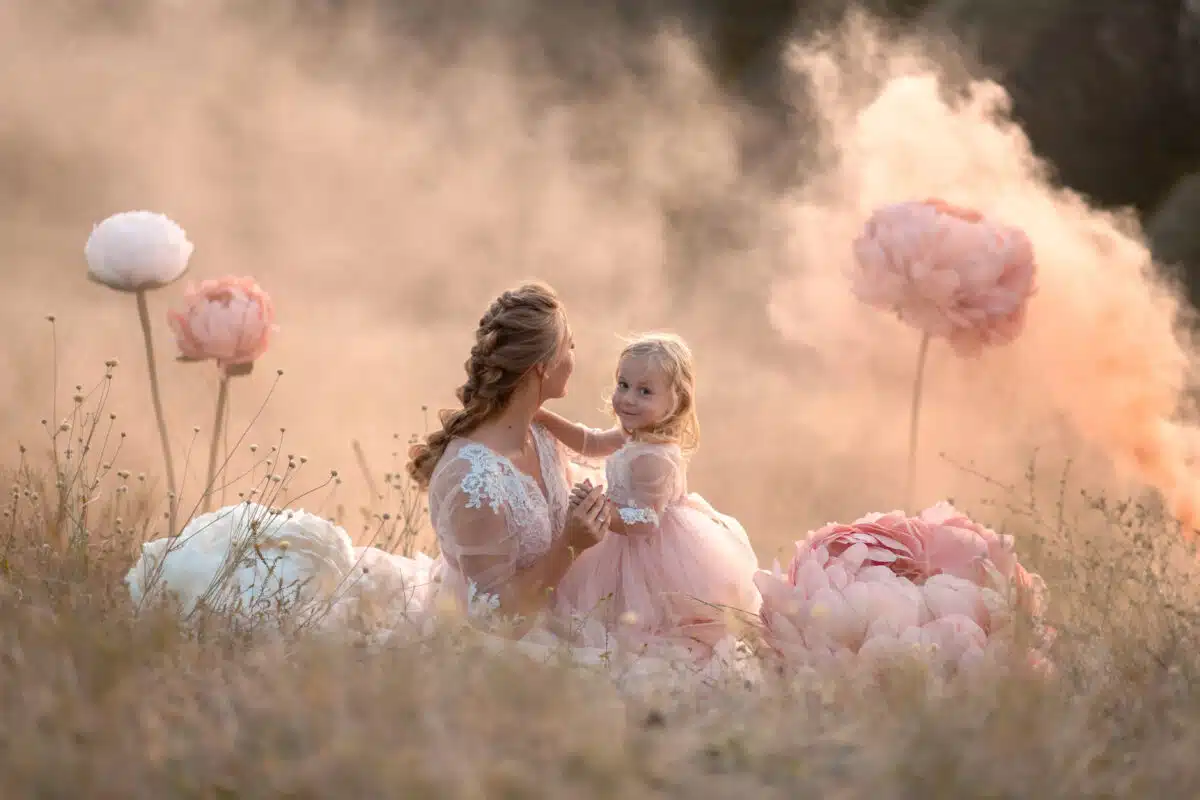
“To My Mother: On the Anniversary of Her Birth” by Christina G. Rossetti
To-day’s your natal day:
Sweet flowers I bring:
Mother, accept I pray
My offering.
And may you happy live,
And long us bless;
Receiving as you give
Great happiness.
“Love” by Christina G. Rossetti
Love is all happiness, love is all beauty,
Love is the crown of flaxen heads and hoary;
Love is the only everlasting duty;
And love is chronicled in endless story,
And kindles endless glory.
“Pussy Cat, Pussy Cat, Where Have You Been?” by Mother Goose
Pussy cat, pussy cat, where have you been?
I’ve been to London to see the Queen.
Pussy cat, pussy cat, what did you there?
I frightened a little mouse under the chair.
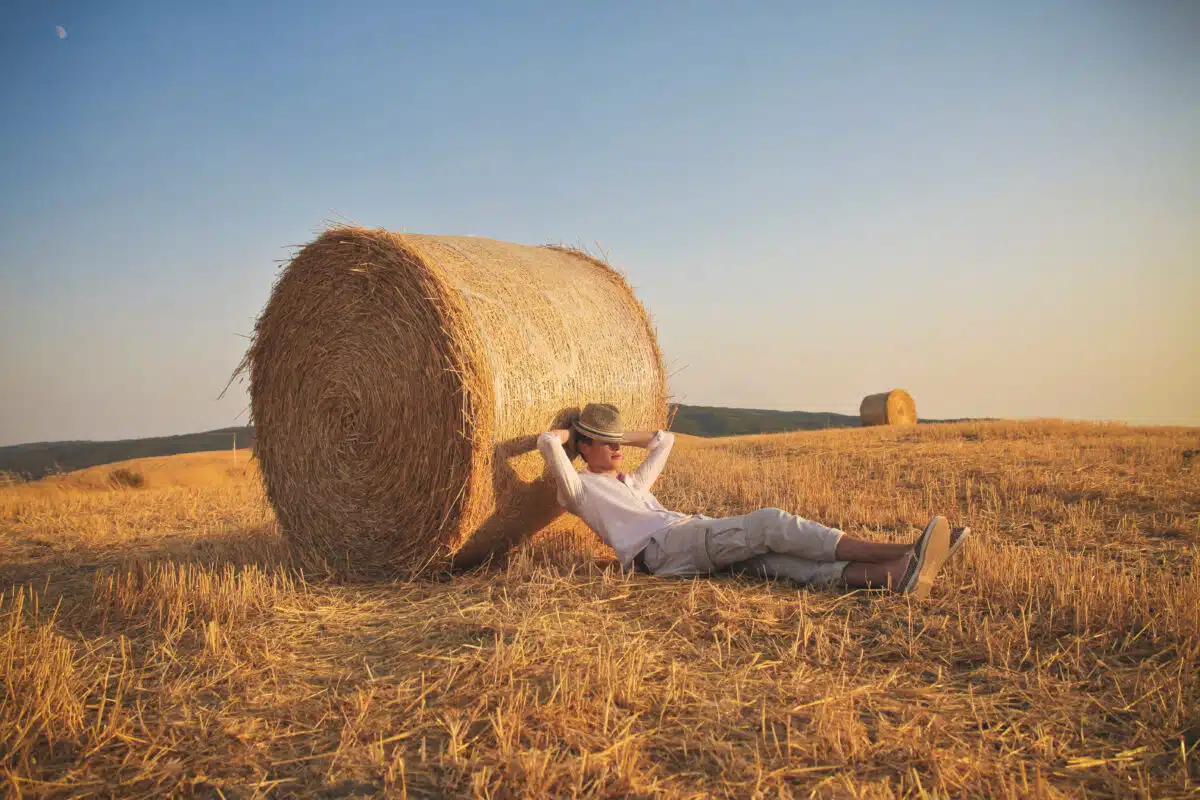
“Little Boy Blue” by Mother Goose
Little Boy Blue, come blow your horn,
The sheep’s in the meadow, the cow’s in the corn.
What! Is this the way you mind your sheep,
Under the haycock fast asleep?
“Pat a Cake, Pat a Cake” by Mother Goose
Pat a cake, pat a cake, Baker’s man;
So I do, master, as fast as I can.
Pat it and prick it and mark it with T,
And then it will serve for Tommy and me.
“Minnie” from Summer Songs
Learn your lessons well to-day,
Little Minnie;
Then we will have merry play,
Minnie ! Minnie!
Now first say your A, B, C;
Then count numbers, One, Two, Three;
Then your verses say to me,
Minnie!
You are but a little one,
Minnie! Minnie!
And you like best play and fun,
Little Minnie.
But it can’t be always play;
Not to work throughout the day,
Would be wasting time away,
Minnie!
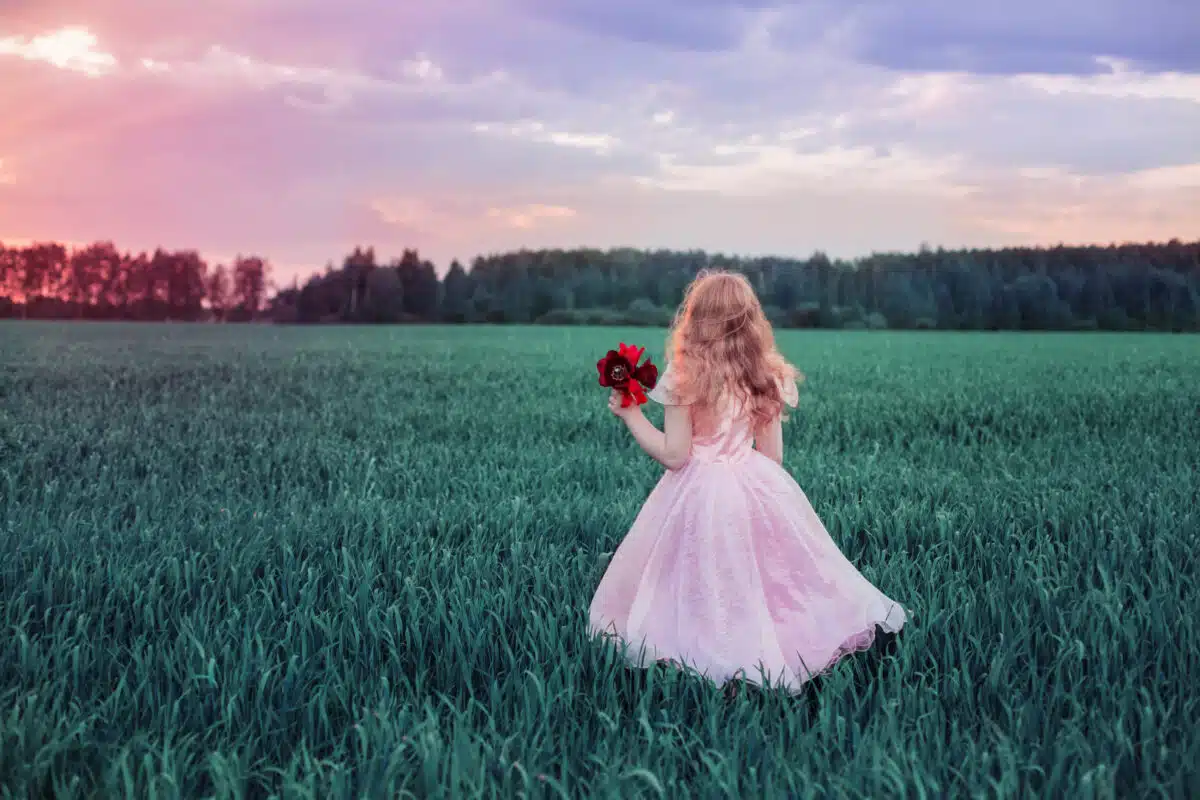
“The Poppy” by Jane Taylor
Higu on a bright and sunny bed ,
A scarlet poppy grew ;
And up it held its staring head,
And thrust it full in view.
Yet no attention did it win
By all these efforts made,
And less unwelcome had it been
In some retired shade.
For though within its scarlet breast
No sweet perfume was found ,
It seem’d to think itself the best
Of all the flow’rs around.
From this may I a hint obtain ,
And take great care indeed,
Lest I appear as pert and vain
As is this gaudy weed.
“Ride Away, Ride Away” by Mother Goose
Ride away, ride away,
Johnny shall ride,
And he shall have pussy-cat
Tied to one side;
And he shall have little dog
Tied to the other,
And Johnny shall ride
To see his grandmother.
“Unselfishness” by Christina G. Rossetti
The dear old woman in the lane
Is sick and sore with pains and aches,
We’ll go to her this afternoon,
And take her tea and eggs and cakes.
We’ll stop to make the kettle boil,
And brew some tea, and set the tray,
And poach an egg, and toast a cake,
And wheel her chair round, if we may.
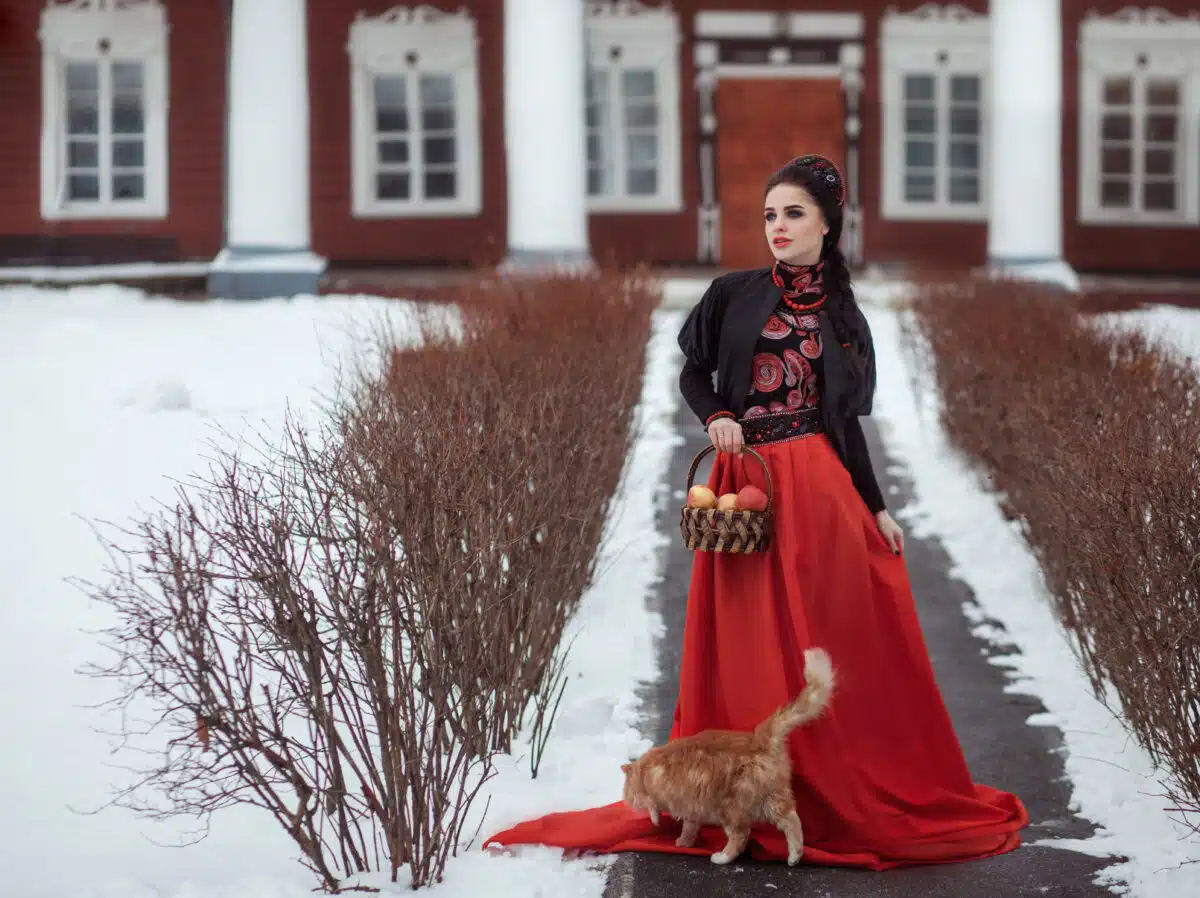
“Pussy-Cat” by Mother Goose
Pussy-Cat sits by the fire;
How can she be fair?
In walks the little dog;
Says: “Pussy, are you there?
How do you do, Mistress Pussy?
Mistress Pussy, how d’ye do?”
“I thank you kindly, little dog,
I fare as well as you!”
“King Arthur” by Anon.
When Arthur reign’d in Camelot,
A hundred knights at table sat;
They never knew from day to day,
Or what they drank or what they ate.
Except on Sunday — then the king
His knights with beef and pudding fed ;
A flagon of beer was each man’s cheer,
And butter had they on their bread.
“Ding-Dong-Bell” by Mother Goose
Ding—dong—bell, the cat’s in the well.
Who put her in? Little Johnny Green.
Who pulled her out? Great Johnny Stout.
What a naughty boy was that
To drown poor pussy cat
Who never did him any harm,
And killed the mice in his father’s barn.
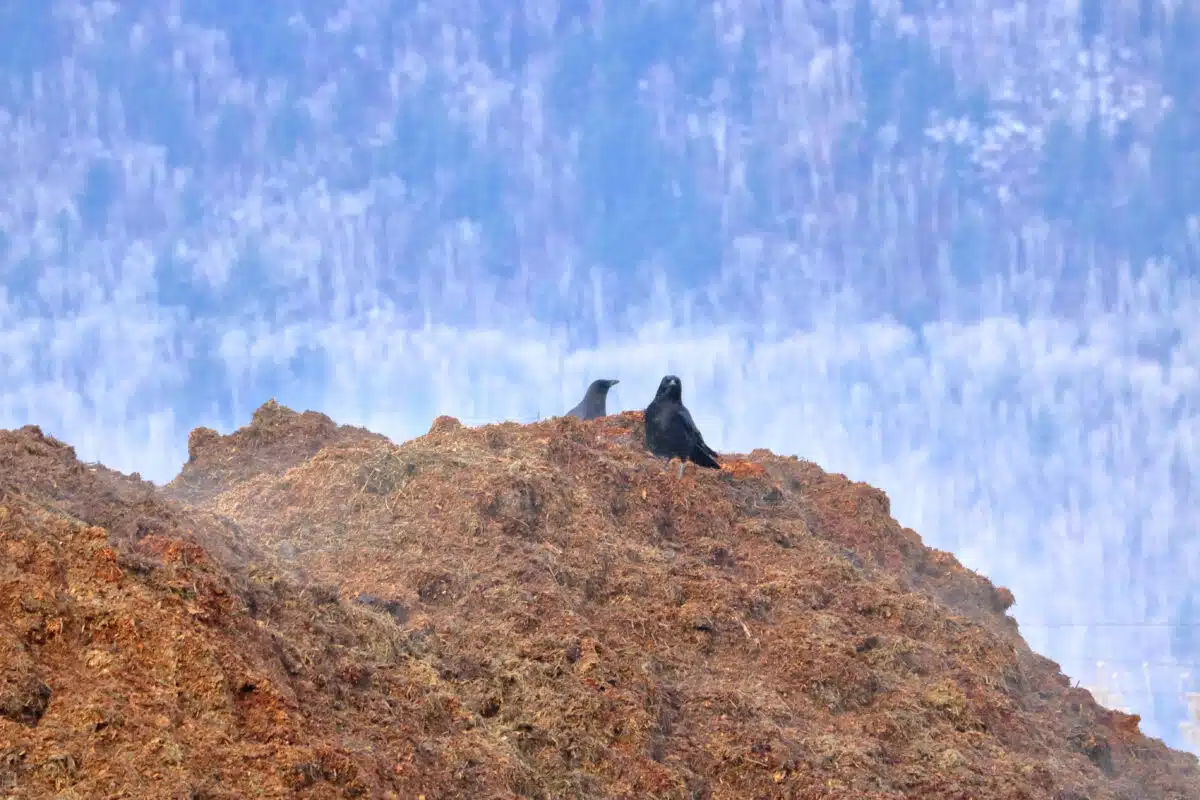
“Two Blackbirds Sitting on a Hill” by Mother Goose
There were two blackbirds sitting on a hill,
One named Jack and the other named Jill.
Fly away, Jack! Fly away, Jill!
Come again, Jack! Come again, Jill!
“Old Oak” by Lowell
A Little of thy steadfastness,
Rounded with leafy gracefulness,
Old oak, give me —
That the world’s blast may round me blow,
And I yield gently to and fro,
While my stout-hearted trunk, below,
And firm-set roots unshaken be.
